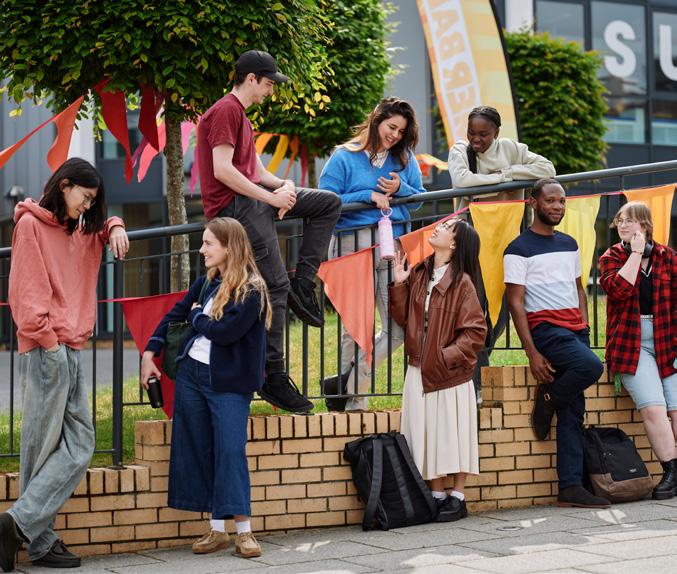
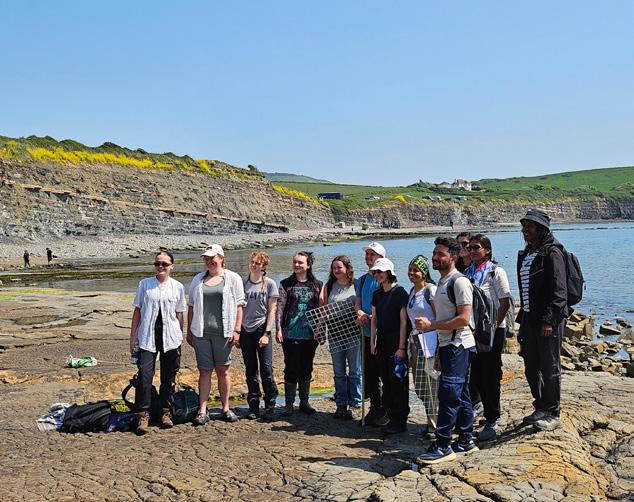
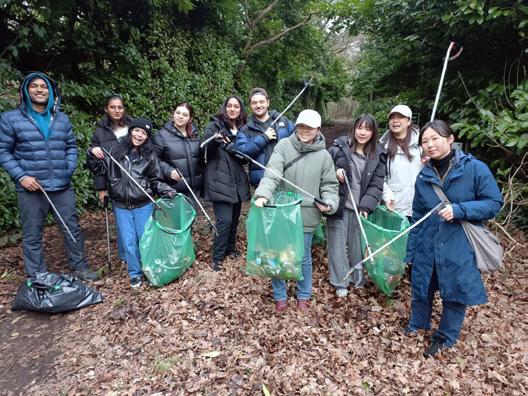
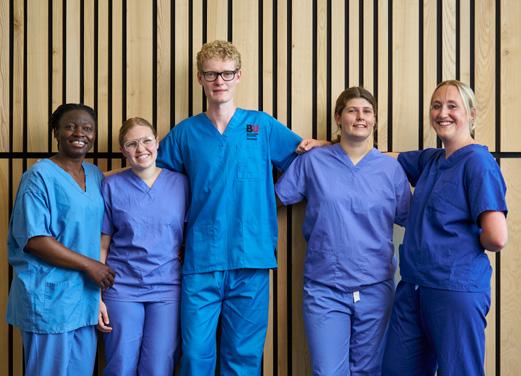
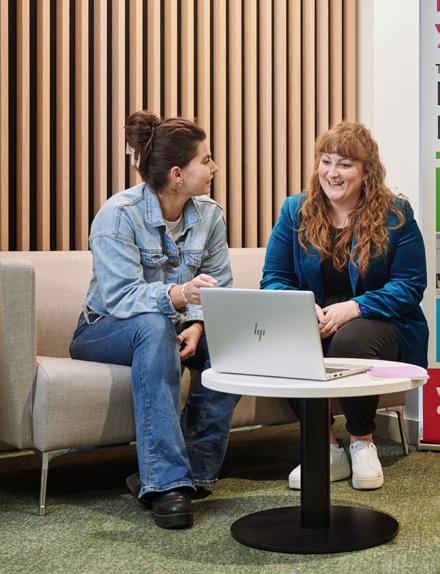

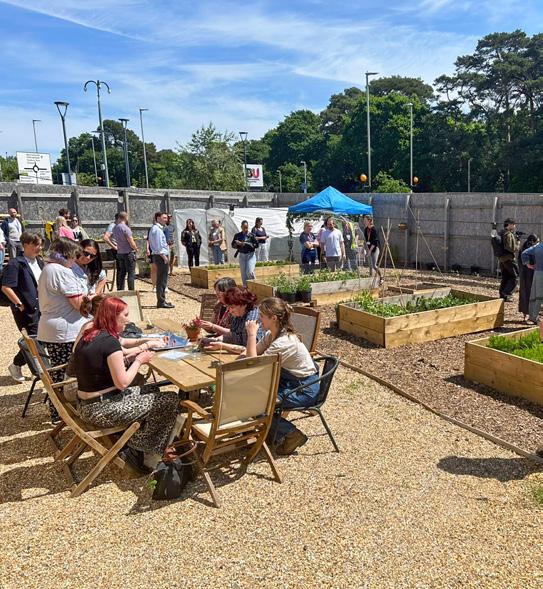
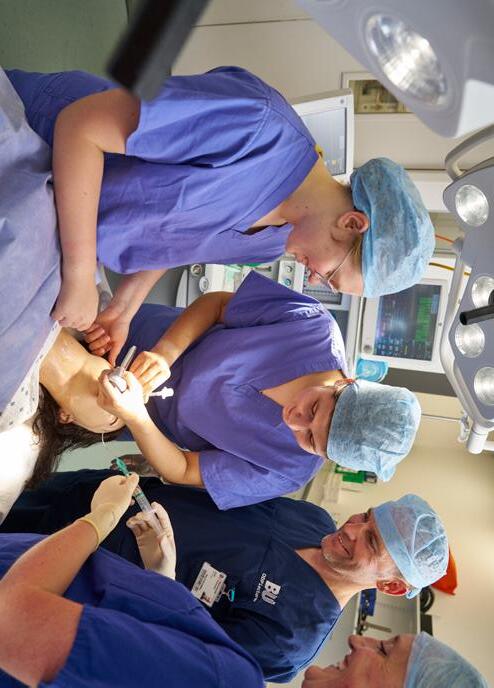
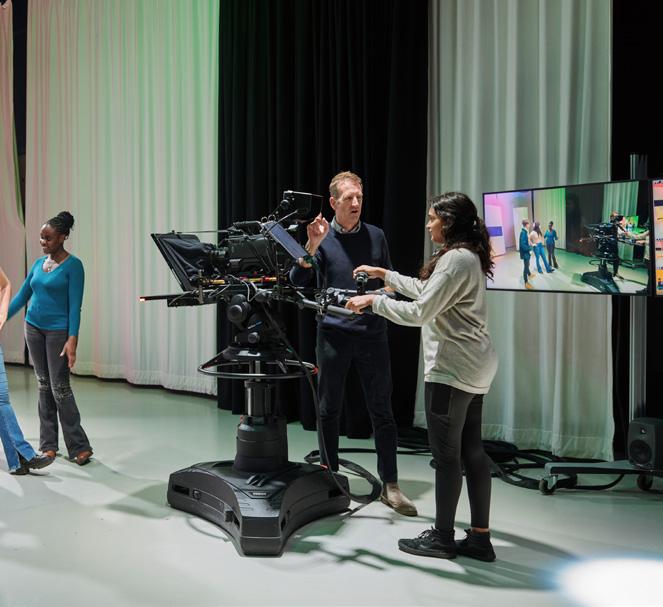










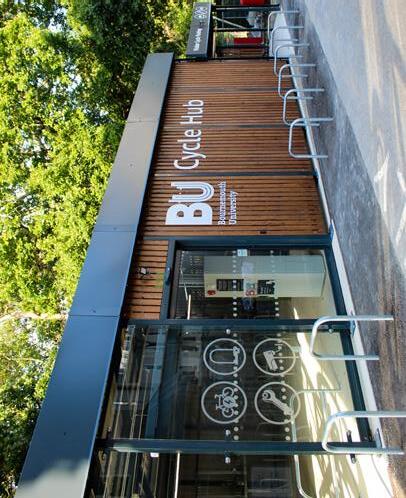
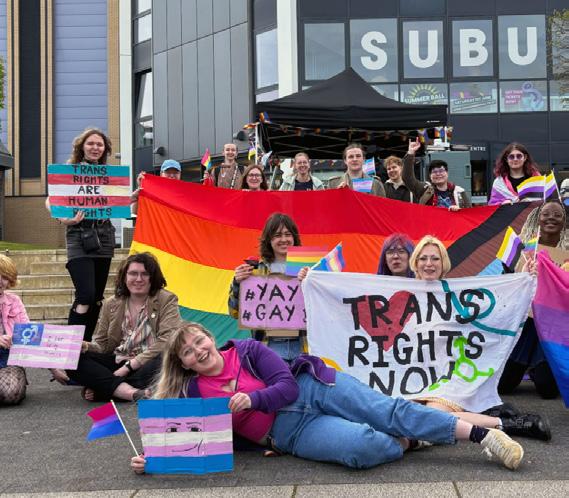
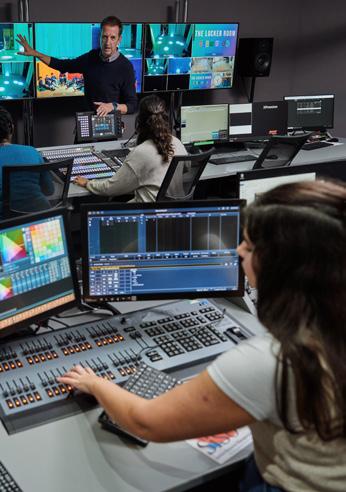
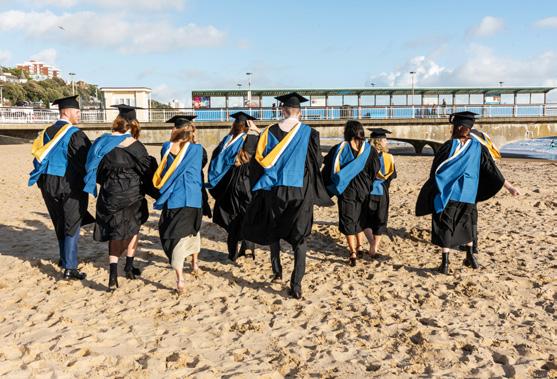
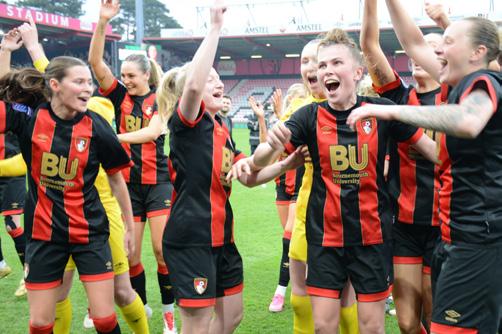

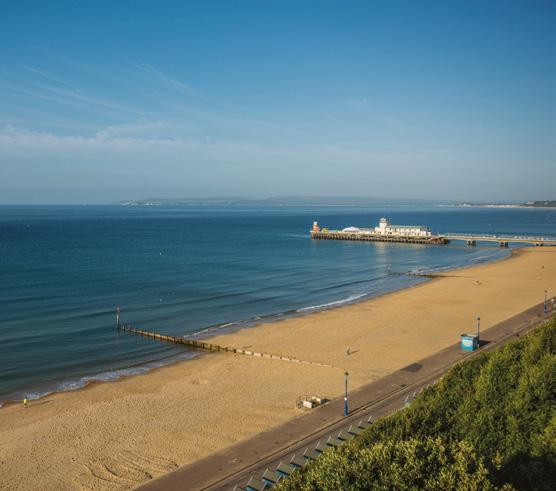
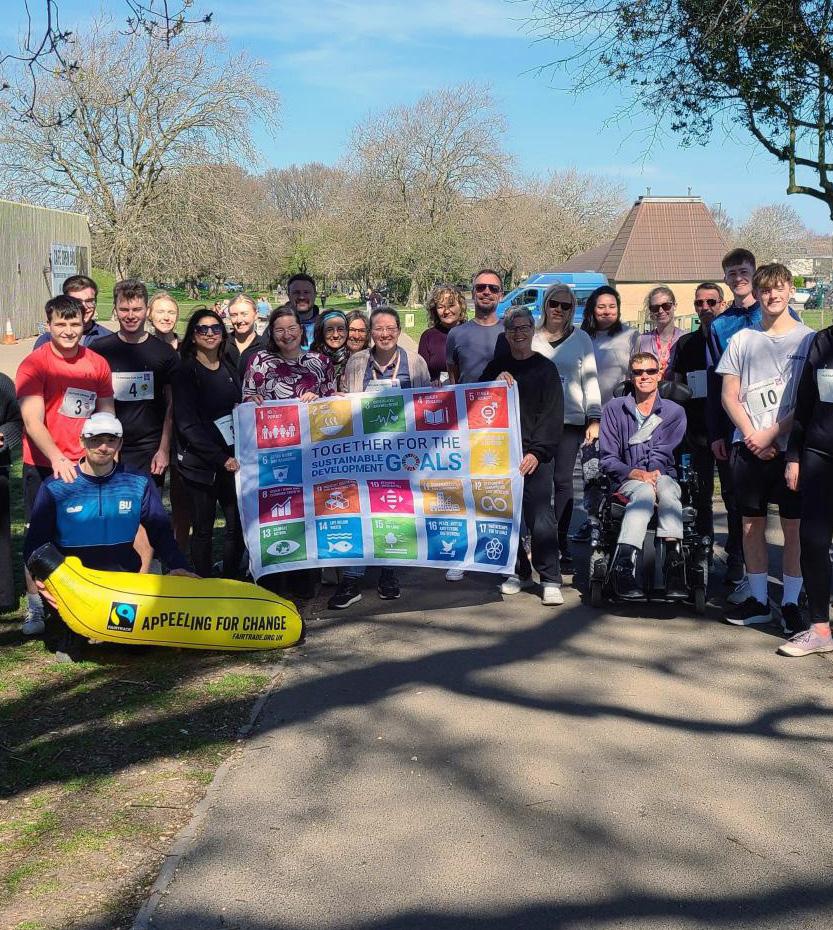
The 17 United Nations Sustainable Development Goals (UN SDGs) are a blueprint for creating a more sustainable future, addressing the greatest challenges facing humanity and our environment.
We are proud to have ranked joint 59th in the world out of 2,318 universities, and 8th in the UK in the Times Higher Education Impact Rankings 2025. This achievement is a recognition of our commitment and efforts to drive action for the UN SDGs across our institution, though we know there is so much more to be done.
This is our fourth annual report which aims to summarise some of the work and actions we have undertaken prior to April 2025 towards the UN SDGs. Any data given in this report is for the academic year 1 August 2023 to 31 July 2024.
Organised into four sections: education, research, public engagement, and operations, this report is a celebration of the hard work of our students, staff, and community, and we hope it will inspire further commitment, collaboration, and action so that together we can even faster realise the blueprint of the UN SDGs.
The images of our students and staff on the next page proudly celebrating SDG Flag Day serve as clear evidence of our collective commitment at BU to driving positive change and advancing sustainability on campus and beyond.
At BU, we understand that sustainability is all about collaboration, which is why we are trying to bring together our research, education and professional practice. By pulling together people, ideas, knowledge, and resources from across the entire BU community, we are establishing ourselves as an innovative university with a different approach to solving the challenges of the modern world.
It is understandable then, that the UN Sustainable Development Goals align with the values and beliefs that BU has held for many years. Our work is helping people to live better for longer. We help to protect and preserve a sustainable environment. We help people and organisations to prepare for, and recover from a crisis. We challenge marginalisation, misinformation and underrepresentation. We are helping creative and cultural industries to thrive. Importantly, we are acting as a catalyst for growth and using our skills and expertise to advance the region. This report is a demonstration of how we have aligned our work to the UN SDGs across the university, so you can see that we are serious about delivering on our values and using our unique position in society for driving positive change.
This year, we have started to develop our new SDG Podcast, inviting BU staff, students, and external organisations to discuss societal challenges, share their work, and offer actionable steps for supporting the SDGs. We hope this new approach will engage a wider audience and deepen the connection between the university and our community. You can find our first two episodes embedded in this report.
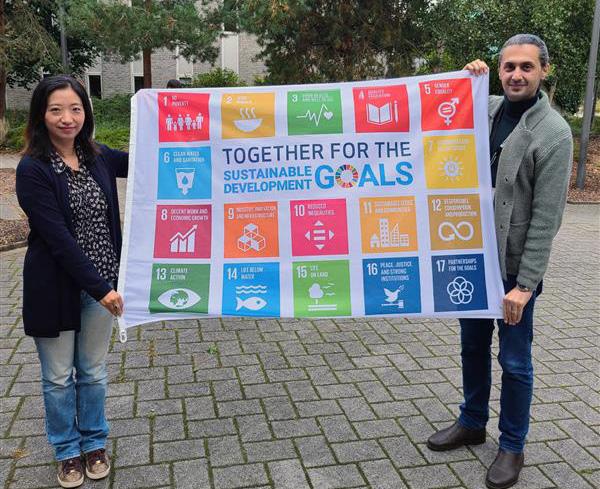
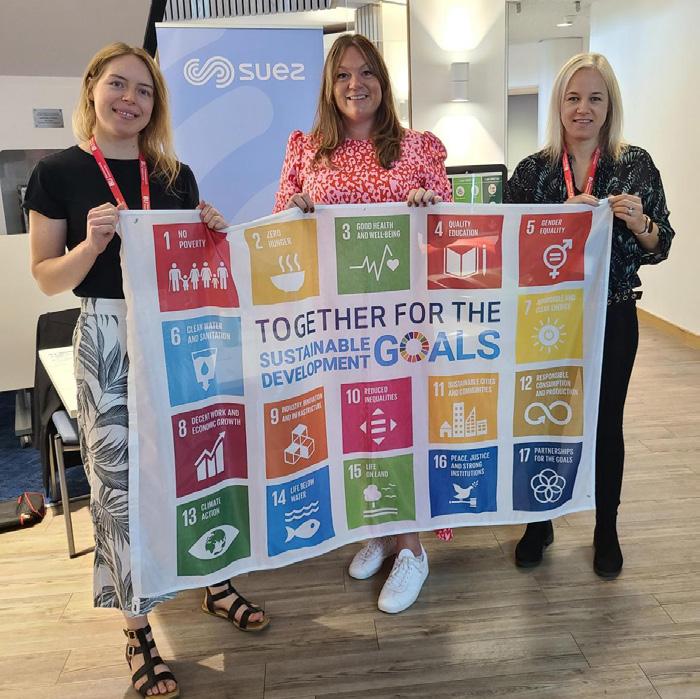

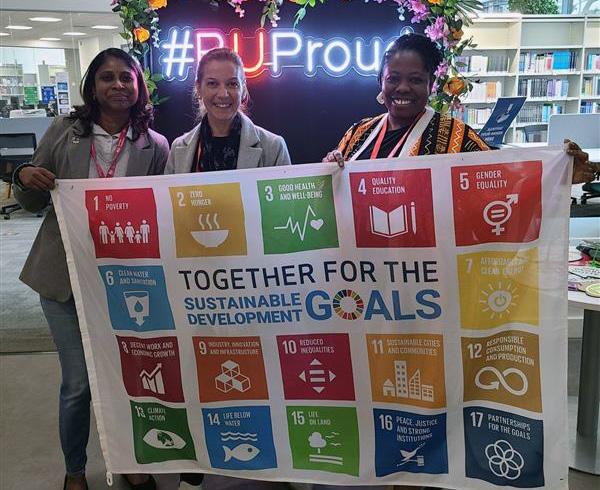
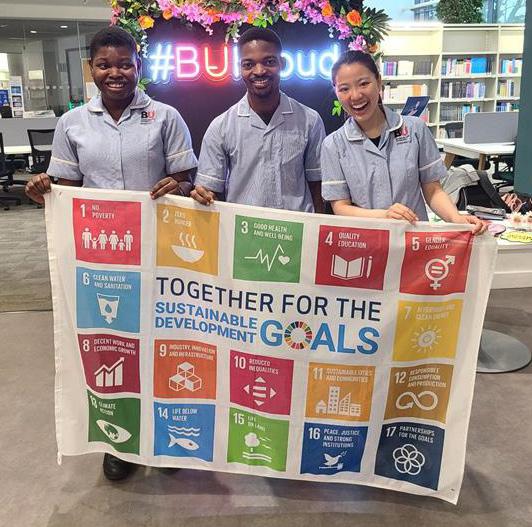
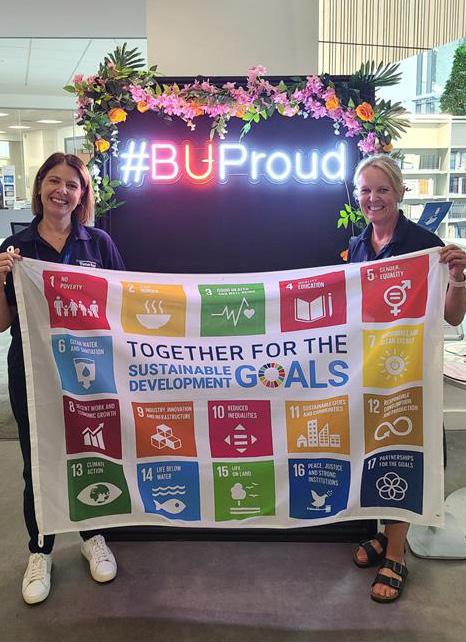
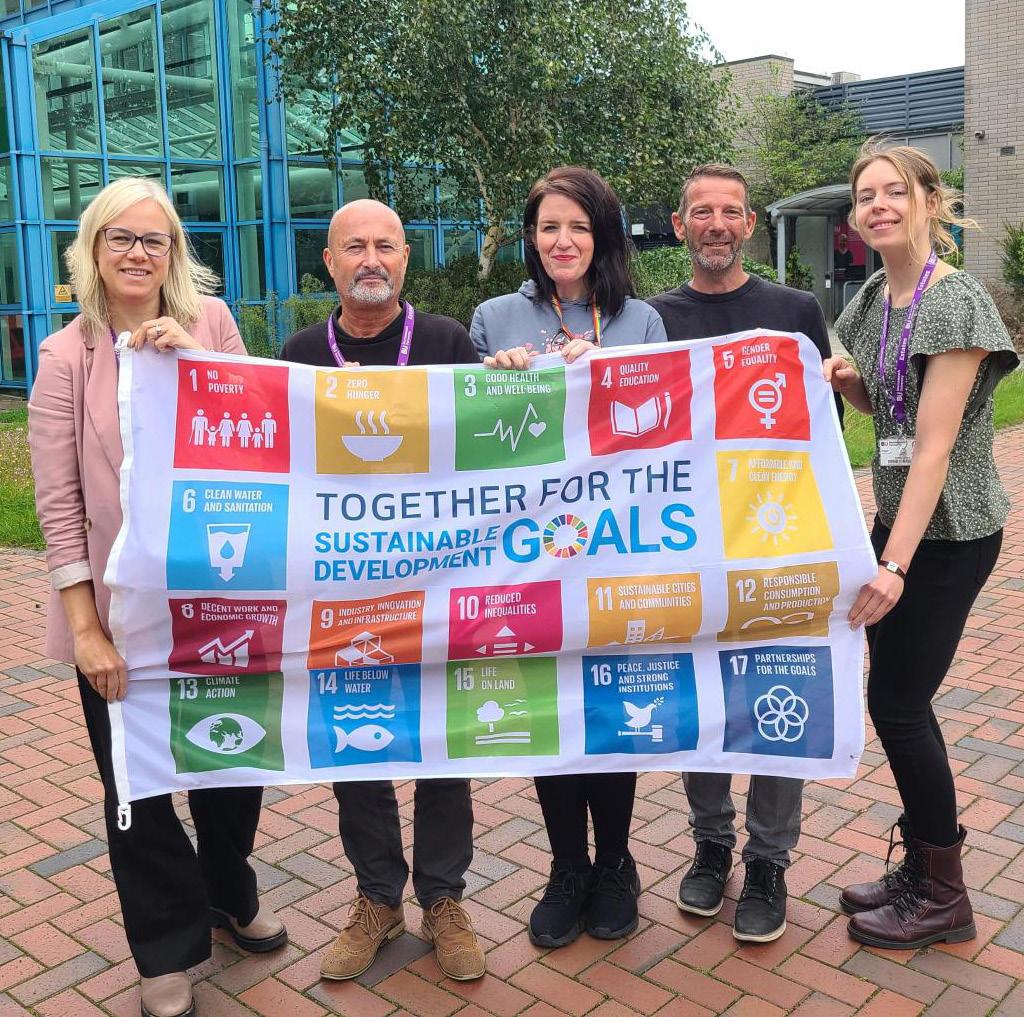
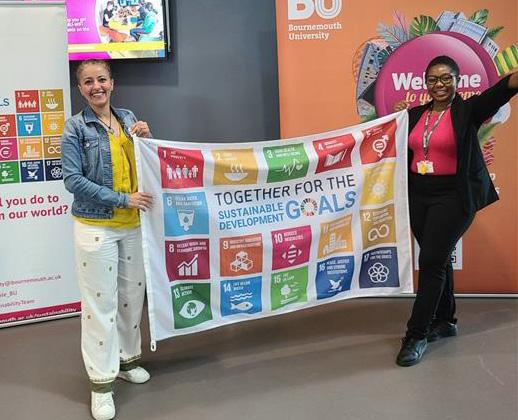
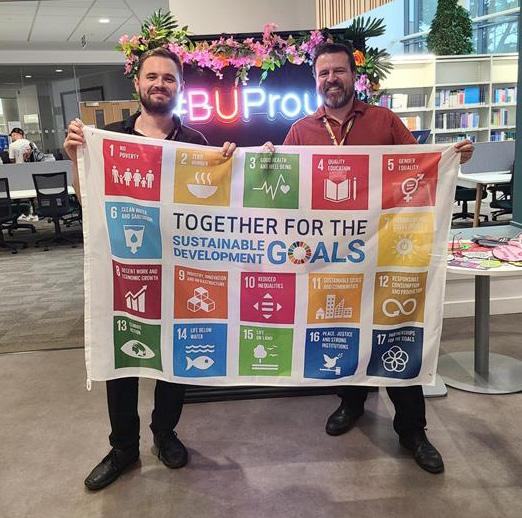
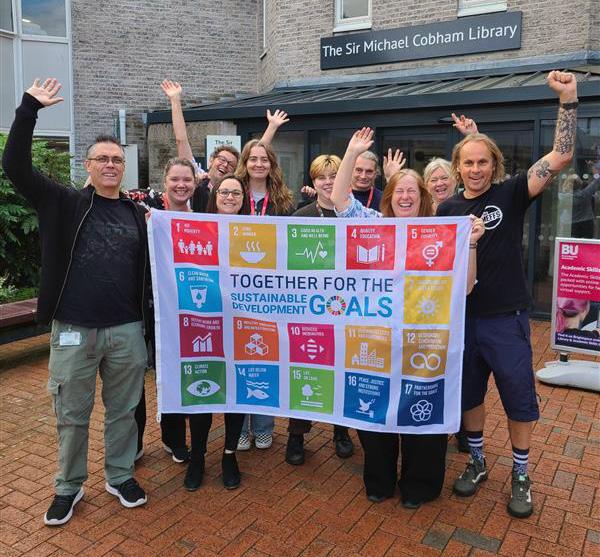



Bournemouth University helps people live better, for longer
Bournemouth University helps to prepare for and recover from crisis
Bournemouth University challenges marginalisation, misinformation and under-representation
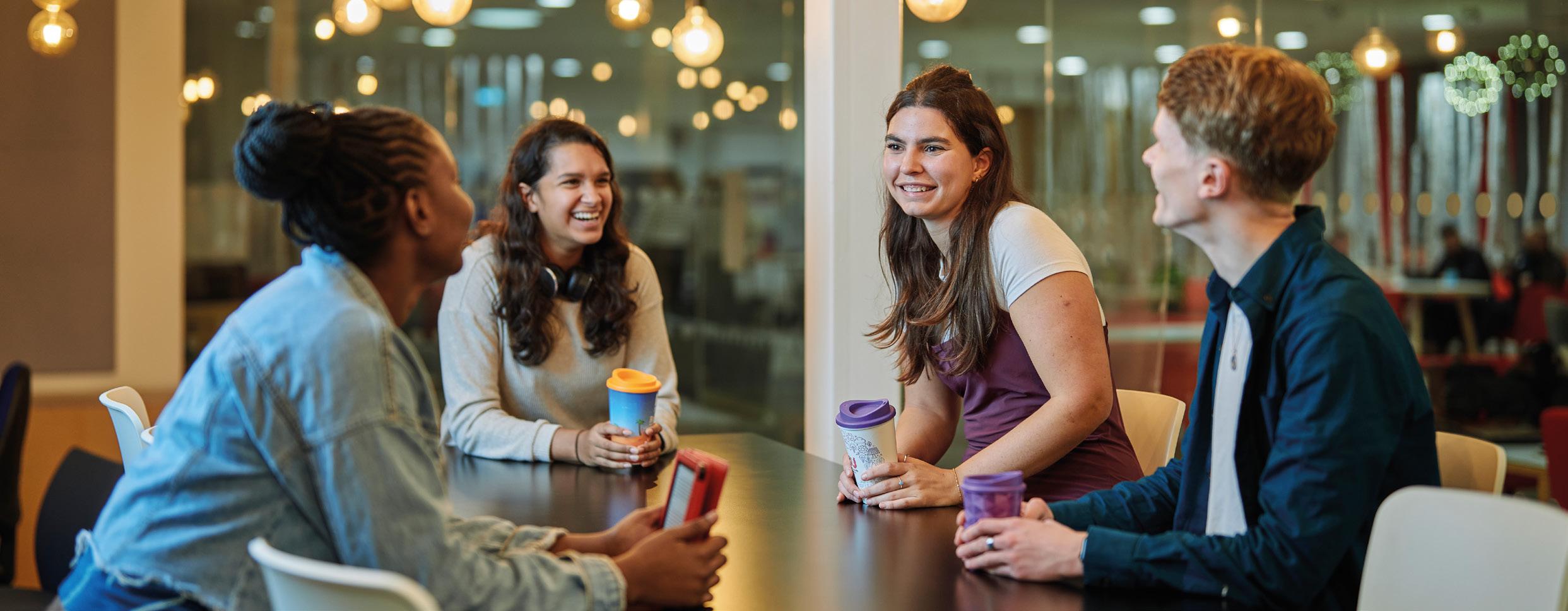
This MSc Disaster Management course provides students with an understanding of how to develop disaster management plans and frameworks, manage both natural and man-made disasters and support humanitarian operations. Moreover, it provides awareness and knowledge of the public health and economic implications, including increased poverty, disasters and how to mitigate these.
Led by BU’s Disaster Management Centre (BUDMC), it helps communities to build resilience, especially of those in vulnerable situations, and reduce their exposure and vulnerability to climate-related extreme events and other economic, social and environmental shocks and disasters.
This course is accredited by the Association to Advance Collegiate Schools of Business (AACSB). AACSB business accreditation demonstrates an ongoing commitment to excellence in teaching, research, curriculum development, and learner success.
The BA (Hons) Social Work and MA Social Work courses provide students with both an academic qualification, and a professional qualification. Students explore the nature and impact of possible causes of social exclusion and discrimination, relevant law and social policy, and the meaning of social justice in relation to the role of social workers working in complex and diverse contexts. Crucially, people with lived experience are actively and meaningfully involved in all aspects of these courses through the Public Involvement in Education and Research (PIER) partnership.
BU MA Social Work student, Dona Shaji, said: “The blend of the MA Social Work course with theory and placement sessions will help every individual student to grow and cherish as a Social Worker, in the very best manner, irrespective of their culture, region, language.”
Read more student experiences of university life on this blog.
THE Impact Rankings 2025 result
74th in the world
9th in the UK
73.9 Research score out of 100
55% programmes aligned to this UN Sustainable Development Goal
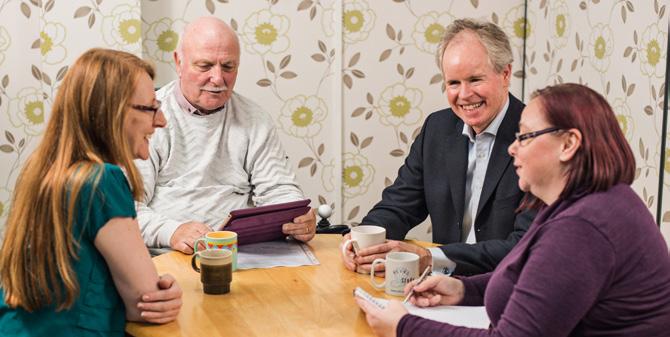
Over the past year, PIER collaborated with 50 external organisations: supporting 59 researchers, involving 61 individual PIER members, engaging with 1,881 students in education and collaborating on 12 successful research funding bids generating over £1,223,268 in income to advance health and social care research at BU.
Activities PIER members have undertaken this year include designing and delivering a poverty workshop, reviewing research funding applications, meeting regulatory body inspectors, reviewing research funding applications, co-designing and delivering public involvement research courses and community placements.
Read more in the PIER Annual Report 2023-24
The BU PIER partnership has developed a Community Researcher Model that enables those with lived experience to contribute to research at every stage, from to design, to dissemination of the output. This approach helps to build knowledge and skills within community organisations, develop research priorities, and lead future research.
For example, BU PIER partnered with Bournemouth, Christchurch and Poole Council (BCP) and the BCP Access to Food Partnership to carry out research into hidden hunger with older people living in Christchurch, Dorset.
Watch this film which summarises the research findings.
The BU PIER partnership collaborated with Our Dorset, Lantern Trust and HealthBus Trust to develop ‘The I Am More Than… project’, which focuses on connecting with people with experience of being homeless and vulnerably housed to create inclusive ways of involving them in research.
Dr Siobhan Lennon-Patience, project coordinator said: “The I Am More Than … project has enabled the time and space to build trust and relationships, a space where lived experience is valued and recognised as integral to developing a model to involve others underrepresented in research.”
We offer various types of financial support funding to our students, in addition to a range of bursaries, undergraduate scholarships and postgraduate scholarships to students. These include:
Maintenance Bursaries
2,246students supported in 2023-24
BU Laptop Support Fund
103students supported in 2023-24
BU Financial Support Fund
548students supported in 2023-24
BU Care Leavers Bursary
45students supported in 2023-24
Placement Opportunity Fund
81students supported in 2023-24
International Emergency Fund
9students supported in 2023-24
The Poverty Truth Commission is a project rooted in lived experience which seeks to tackle the root causes of poverty in the Bournemouth, Christchurch and Poole (BCP) area.
The Community Commissioners, all of whom have experienced poverty locally meet regularly with Civic/Business Commissioners (CBCs) to discuss issues such as housing, mental health, rising costs, and benefits. Professor Mel Hughes, principle academic in Social Work, is one of the CBCs.
This model brings together those with power and influence, and lived experience to tackle poverty collaboratively.
We continue to provide financial awareness and education to students with the help of external partners.
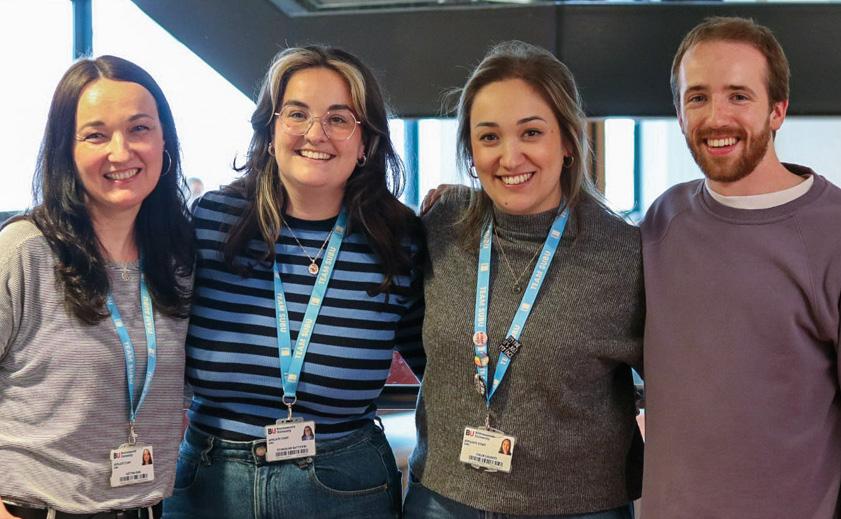
The Students Union Advice Centre is a confidential service where students can go to understand their rights, options, and next steps to resolve their issues, including financial advice.
Through SUBU Advice, students can access small emergency grants, food parcels, budgeting and money management tips, and other forms of financial support. This year, over 1,620 students have been supported through SUBU Advice.
James White, SUBU Advice Case Worker, speaks about the increasing financial challenges for university students in this episode of BU’s SDG Podcast
£2,499,907 provided to students as financial support
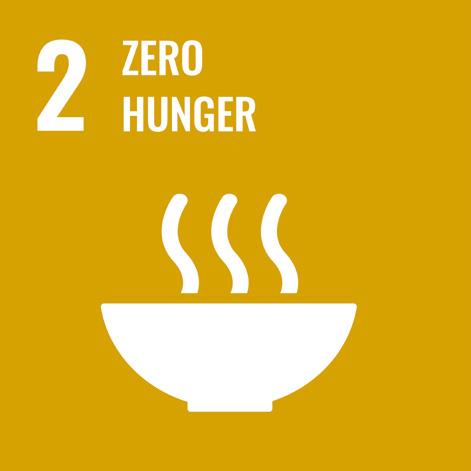
Bournemouth University helps people live better, for longer
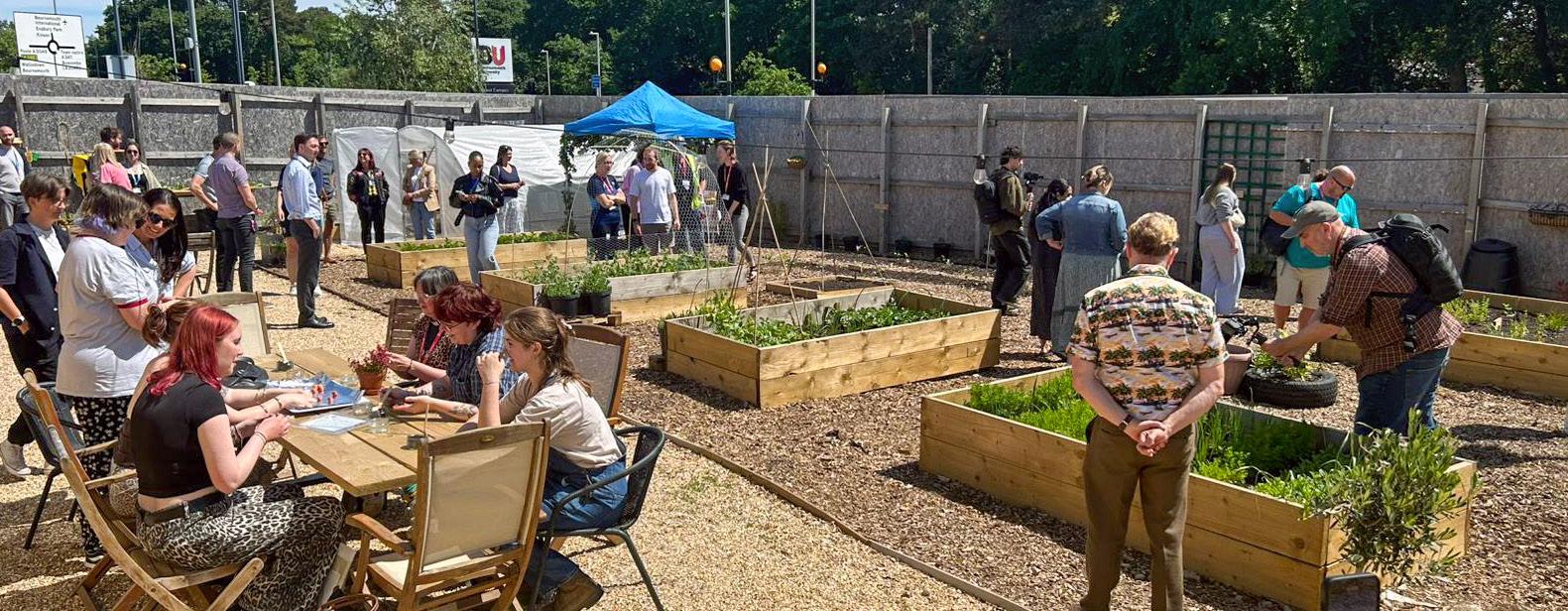
Accredited by the Association for Nutrition (AfN), the MSc Nutrition & Behaviour course is the first of its kind in the UK to explore the bi-directional impact of nutrition on behaviour and the brain, and the impact of behaviour on diet.
This course enables students to discover the role of nutrition in topics such as food promotion, prevention of diet-related disease, and the role of diet in normal ageing and age-related conditions.
Students also have the opportunity to put learning into a professional context within the healthcare, community, or private sector.
BU graduate, Harriet Kretowicz, said: “‘I really enjoyed studying the MSc Nutrition and Behaviour at BU. I now work for Cornwall Council for the Health Promotion Service as a Healthy Schools Advisor, promoting the health and wellbeing of children’’.
Bournemouth University helps to protect and preserve a sustainable environment THE Impact Rankings 2025 result
As part of this course, students are given the chance to visit Travellers Rest Farm, a sustainable regenerative farm in Dorset, to learn the history of intensive farming, high pesticide use and the impact this has had on wildlife. This trip showcases real-world solutions for reducing the environmental impact of food production.
This course studies the biological mechanisms of human health and disease, including the impact of nutrition. Students learn about different research strategies and the latest technologies, and how to apply them to address societal needs.
101-200 in the world 10th in the UK
66.6 Research score out of 100
44% programmes aligned to Sustainable Development Goals
This project aims to understand the drivers of inequalities in nutrition and healthy ageing, and to design novel, innovative and culturally tailored interventions to improve nutrition, healthy ageing and quality of life in older African adults.
Individuals from Black African communities can face challenges when trying to maintain their traditional diets, while also trying to adapt to the Western food culture. This can have implications for nutrition. Additionally, Black African communities living in the UK also tend to be affected by conditions linked to poor lifestyle including diabetes, high blood pressure, overweight and obesity.
In 2024, a dissemination event was held at BU to share findings from the project with participants, community members and stakeholders.
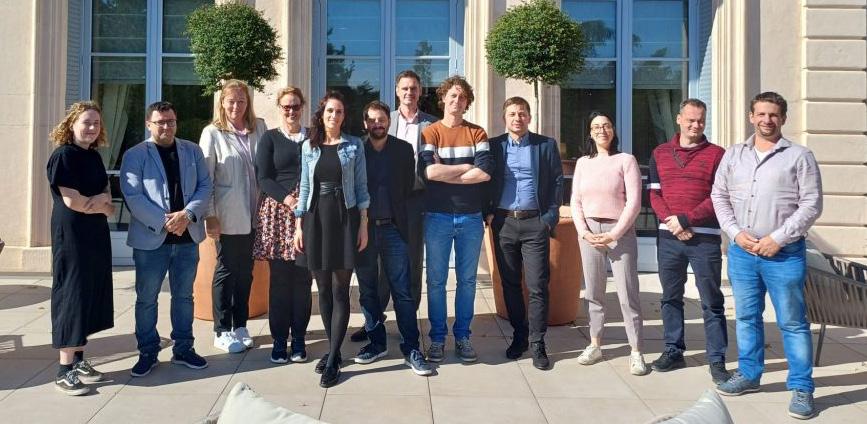
FoodMAPP is a European project that enables consumers to find and buy local food, reduce food waste, and make sustainable purchases using a map-based application. BU is leading this project in the UK.
Professor in Consumer Behaviour, Jeffrey Bray said: “Our current food supply system is not sustainable in terms of its ability to reliably provide the right nutrition for a growing world population… this project aims to transform local food supply.”
You can learn more about FoodMAPP and other projects BU are engaged with for building more resilient food systems in this episode of BU’s SDG Podcast
2,471 meals were saved through the food sharing scheme Too Good To Go.
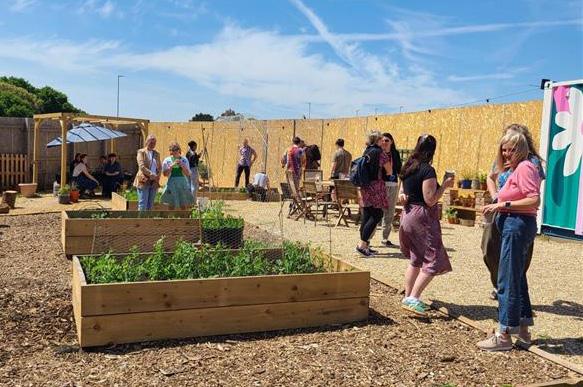
BU Students’ Union and BU estates have developed a new Community Garden on our Talbot Campus. All produce grown in the garden will be used to supply the SUBU Community Kitchen with fresh, chemical-free fruit and vegetables.
Drop-in volunteering sessions are available for anyone in the community to gain some experience and help to maintain the garden. Read more about how to get involved here
This year, we launched our new Sustainability Screenings series, which aims to bring our community together to progress the UN SDGs by using film as a tool to educate, reflect, and inspire meaningful action.
For the launch event, we hosted a screening of Six Inches of Soil, which tells the story of three British farmers standing up against the industrial food system, and transforming the way they produce food through regenerative agriculture. The event brought together local farmers, community groups and organisations, BU staff and students, and members of the public.
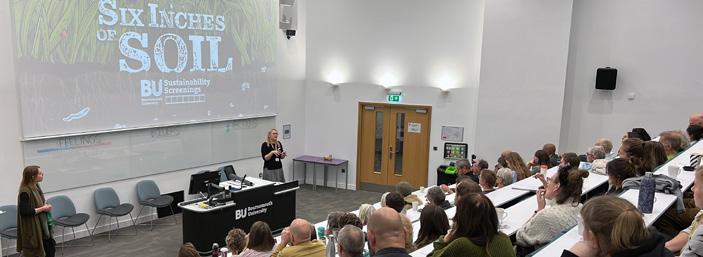
Run by the Students Union Advice Team, the Community Kitchen was set up in response to the cost-of-living crisis, with the goal of helping students who were hit by rising living costs, as well as combatting food waste and raising awareness of sustainability goals.
Located on the second floor of the Student Centre, the Community Kitchen is equipped with hot water for hot drinks, food dispensers (which are filled weekly), crockery and cutlery, a microwave, and a large table for both individuals and groups to sit around and enjoy food. The space is also stocked with surplus food from supermarkets, and the Bread Bin Community deliver bread and pastries three times a week.
This year, our catering provider Chartwells planted over 200 onions, 50 garlic, carrots and some mint in the planters on the Fusion Building terrace using some of our homemade compost. The produce grown is incorporated into the dishes served on campus.
Chartwells Head Chef, John Barrow, said: “With the ever-changing world around us and consumption going up every day, it’s great to be able to use nature to bring down waste and grow food at the same time, something I hope will become more common in the future with other food businesses.”
1.03 tonnes of food waste was composted on campus using our rotating composter.
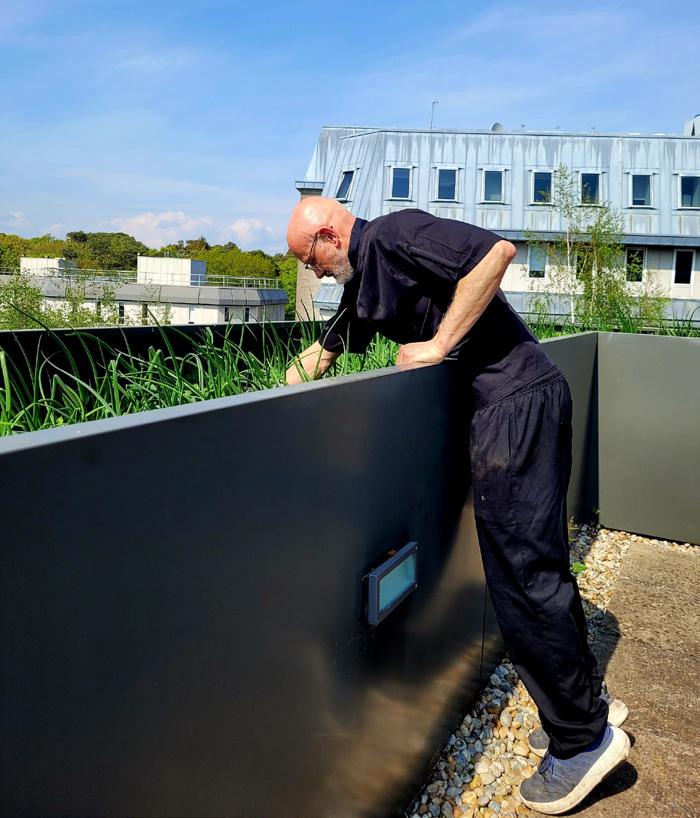
20.07 tonnes of food waste was sent for anaerobic digestion in 2023-24.

Bournemouth University helps people live better, for longer
Bournemouth University helps to prepare for and recover from crisis
Bournemouth University challenges marginalisation, misinformation and under-representation
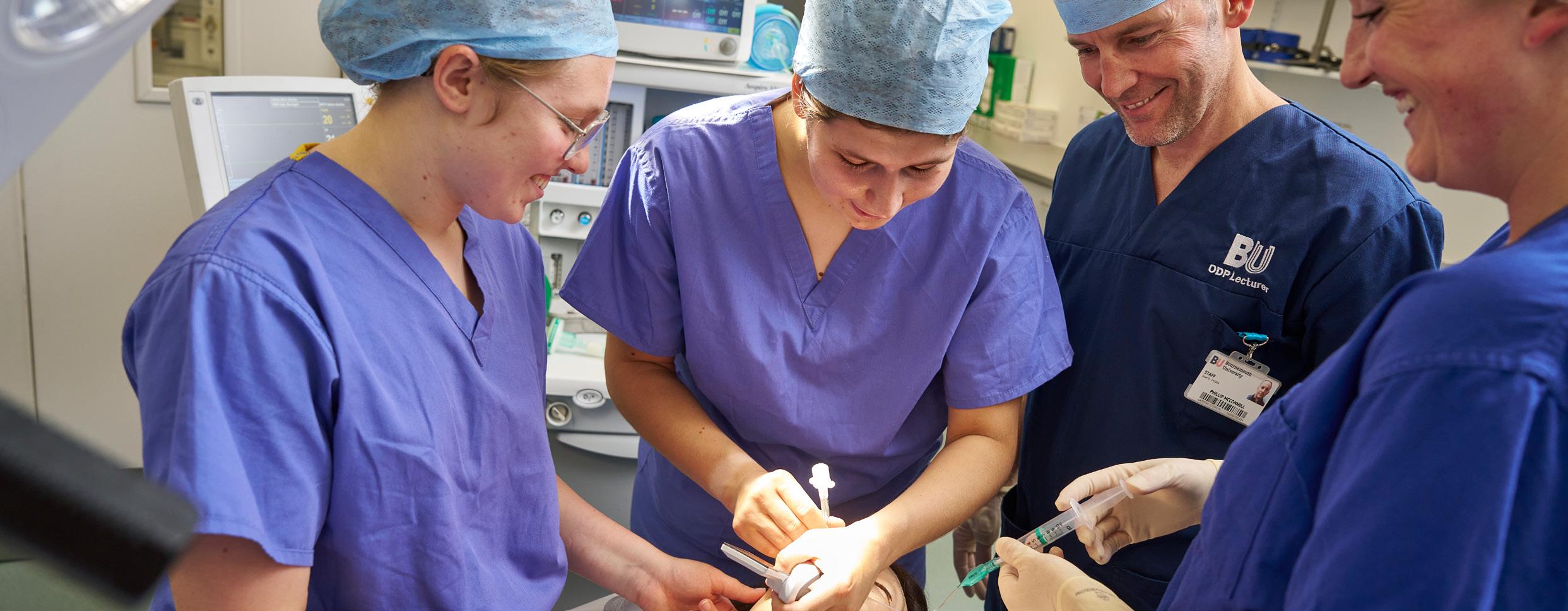
We have a dedicated Faculty of Health & Social Sciences, in which relevant courses benefit from professional accreditations or approval from bodies such as the Nursing & Midwifery Council (NMC), the College of Paramedics, the Association for Nutrition, the Chartered Society of Physiotherapy, the Royal College of Occupational Therapists (RCOT), the Health & Care Professions Council (HCPC) and Social Work England.
With over 20 programmes within the Faculty, thousands of students have graduated ready with the knowledge, skills and training to enter the NHS and broader health sector, having benefitted from courses with clinical and community simulation suites and integrated placements in a research-led environment.
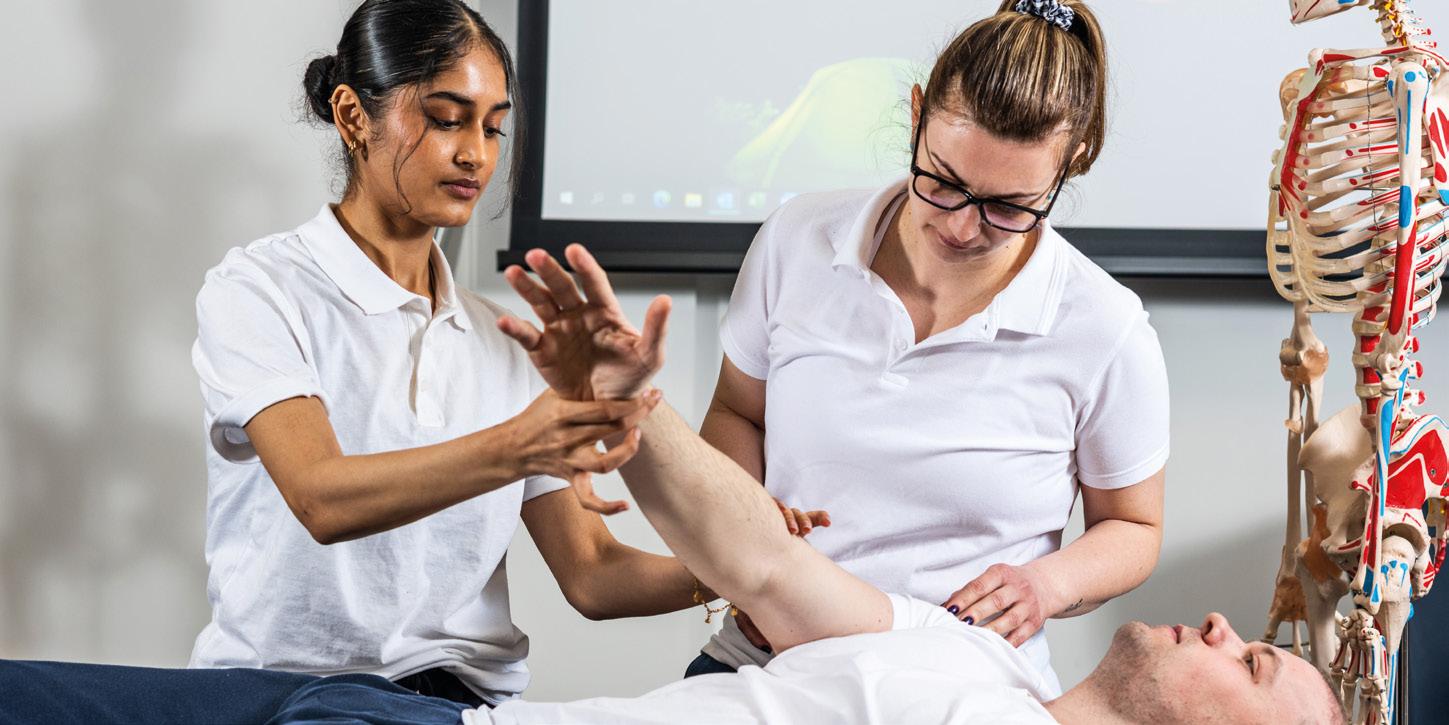
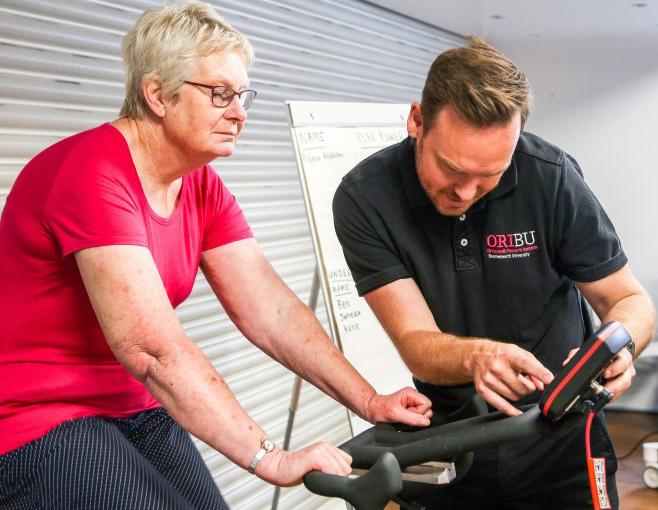
BU’s Orthopaedic Research Institute (ORI) is working with regional hospitals and healthcare partners to help people with hip arthritis to live pain-free lives through their Cycling Against Hip Pain (CHAIN) programme.
CHAIN aims to reduce pain and encourage mobility through a sixweek programme of education and static cycling sessions, and to equip participants with the confidence to selfmanage their condition.
Read more about the CHAIN project
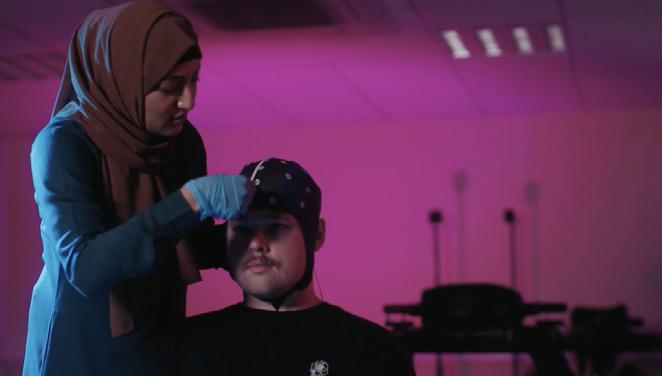
BU’s Multimodal Immersive Neurosensing (MINE) research cluster is using new, virtual reality (VR) technologies to understand human behaviour.
This project combines cognitive neuroscience, clinical and social psychology with VR and uses electroencephalography (EEG) technology to record electric brain activity in response to different scenarios. Through developing a strong understanding of why people behave the way they do; this technology could support the development of mental health treatments and resilience training. Read more about the MINE project.
Our long-standing partnership with the University Hospitals Dorset NHS Foundation Trust, recognised by the Trusts’ university status, benefits both organisations through research collaboration, placement support, and recruitment and training opportunities.
This year we delivered the BU-UHD Leadership Conference, opened by BU’s Vice-Chancellor Professor Alison Honour, the conference focussed on inspiring both university and NHS leaders to drive improvement through innovation and equality.
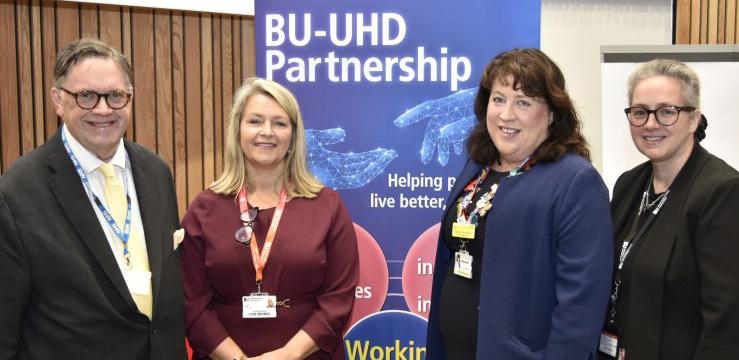
BU’s Spotlight Lecture Series look at societal issues from an evidence point of view. This year, we launched a new series looking at building an NHS fit for the future.
BU academics shared their thoughts and experience on what the future NHS looks like, followed by questions from the audience. The discussion covered strategies for solving issues of inequality, funding and resourcing, community care and healthy living, and the importance of keeping people happy and healthy in their homes.
Professor Sarah Bate, who chaired the event, said: “It is important that the work we do has impact for the community – that’s the point of good research, to look at how we can make lives, societies and systems better, and we’re delighted that our lecture series will help to engage the public in the work we do.”
We offer several mental and physical health support services on campus which are available to all BU students and staff. BU staff also have access to a free and confidential support service via the Employee Assistance Programme. Sexual and reproductive healthcare services are available to all students free via the NHS, and we support teams on campus from the Student Medical Centre and Student Wellbeing to SUBU Advice. The Dorset Sexual Trauma and Recovery Service run weekly drop-in sessions.
Sport BU offer a huge variety of activities to get involved in to support student and staff well-being, including our on-campus gym, fitness classes, and sports clubs. Our sports site, Chapel Gate, has a 65-acre sports facility home to a variety of sports and a nature connection area, offering users a space to develop an understanding of the natural world.
This year we opened the new Portsmouth Midwifery Campus, equipped with the latest equipment and facilities including skills rooms and midwifery training equipment.
Professor Alison Honour, Vice-Chancellor of Bournemouth University, said: “This is a fantastic facility to give our midwifery students the education and experience they need while they learn, and my thanks go to all at the university who have made, and continue to make, this facility run so successfully.”
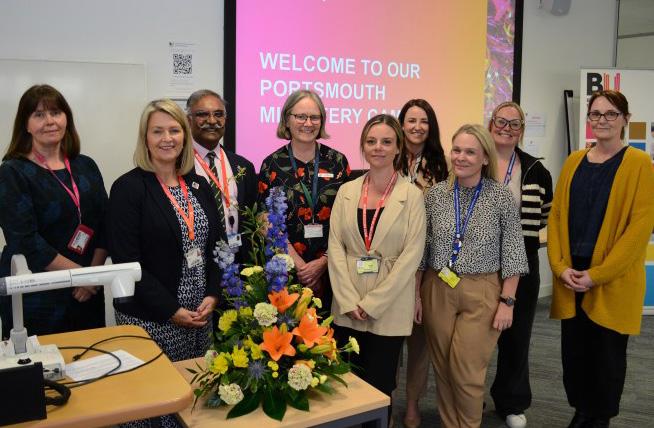
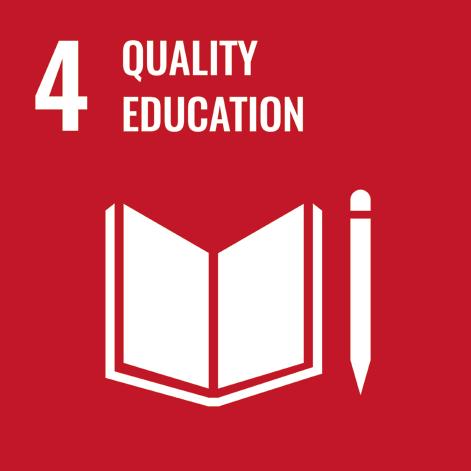
Ensure inclusive and equitable quality education and promote lifelong learning opportunities for all
Bournemouth University challenges marginalisation, misinformation and under-representation
Bournemouth University is helping creative and cultural heritage to thrive
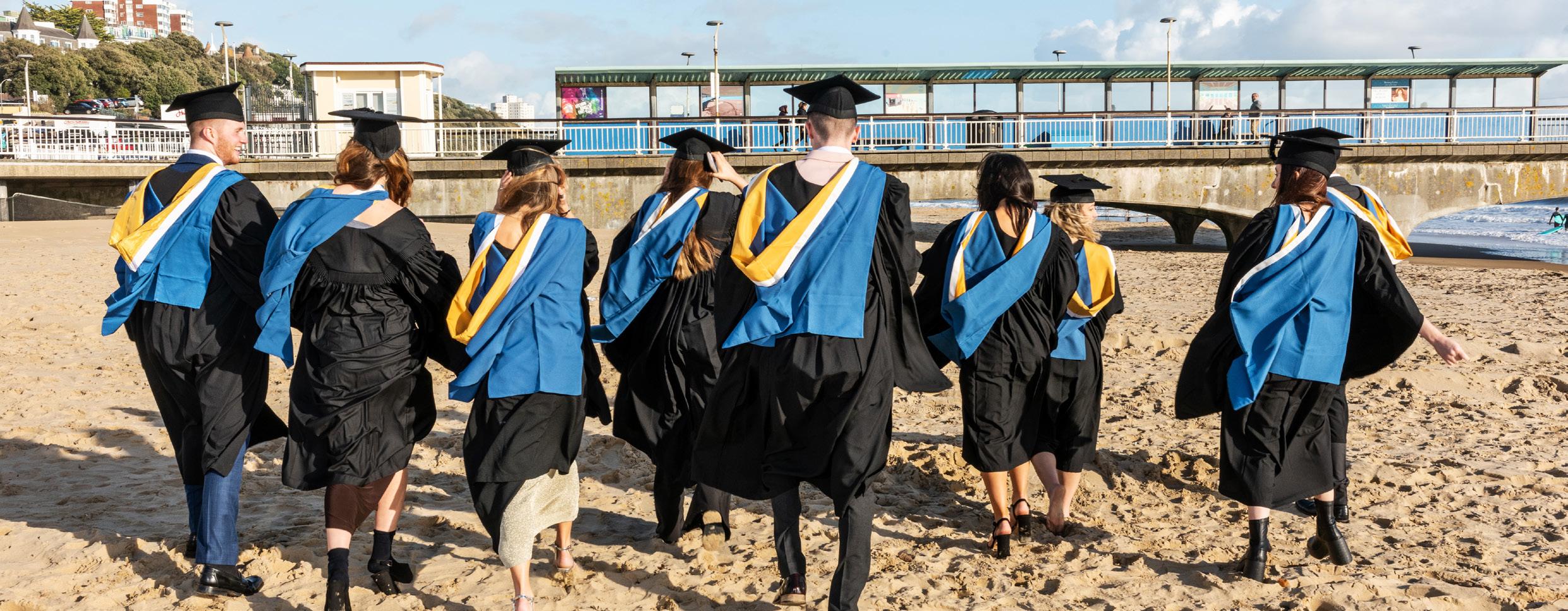
Our new fast-track courses are designed to meet the needs of highly motivated students who want to gain their qualifications more quickly and enter the workforce sooner. This degree programme is being offered on two courses –BA (Hons) Communication & Media and BA (Hons) Business & Management
Our Vice-Chancellor, Professor Alison Honour said: “Our new accelerated degrees reflect our commitment to offering flexible, innovative pathways that meet the evolving needs of today’s students. By enabling learners to complete their studies more quickly and enter the workforce sooner, we’re not only enhancing their employability but also responding to the demands of a fast-moving, competitive job market.”
Taught within BSc (Hons) Cyberpsychology, BSc (Hons) Psychology, BSc (Hons)
Psychology with Counselling, and BSc (Hons) Psychology with Forensic Investigation, this unit provides an introduction to educational psychology, special educational needs, labelling, and inclusive education. It empowers students with knowledge that reflects how education can reduce prejudice and promote equity in the schooling for all children.
It covers conditions that can affect learning and schooling experiences, gender stereotypes in learning and how gender biases can affect academic achievement, as well as reflecting on inclusive learning practices and how cultural norms affect the definition of this concept.
Students discuss how teachers can motivate their students, and work collaboratively with parents to explore how schools can build strong partnerships with external professionals, families and the community to promote resilience in students.
THE Impact Rankings 2025 result
601-800 in the world 21st in the UK
56.1 Research score out of 100
84% programmes aligned to this UN Sustainable Development Goal
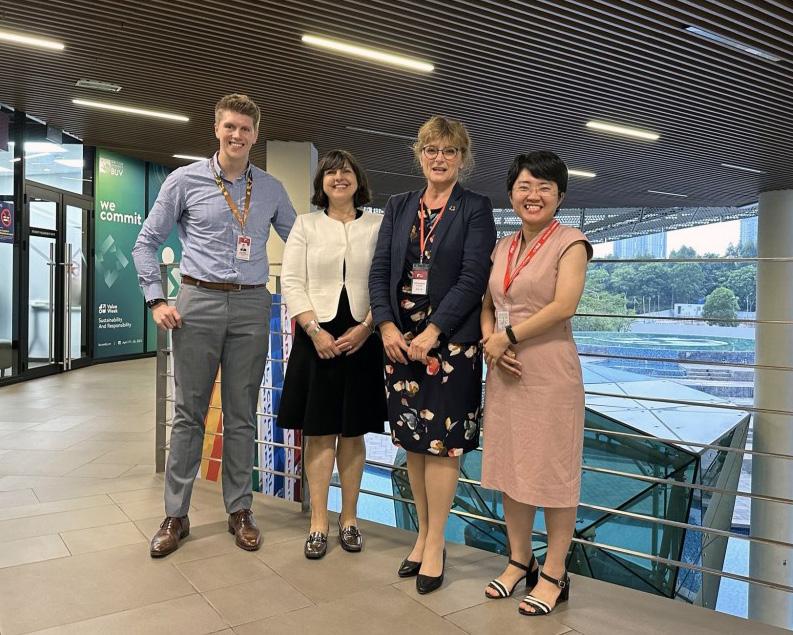
Funded by the British Council, BU academics are working with Vietnamese Higher Education Institutions (HEIs) to establish a sustainable digital education model that will enhance learning, teaching, and administration.
By doing so, this project will create a more inclusive and educational environment, and improve data literacy –a crucial skill in today’s workforce.
This collaborative and innovative approach is intended to serve as a model for other countries undergoing similar transitions in educational digitalisation.
This year we have continued to host a broad and varied series of workshops and events showcasing the opportunities and benefits of coming to university to young people. Our Schools Liaison team work with both students and teachers across primary and secondary schools, with a focus on those living in low participation neighbourhoods, students from low socio-economic backgrounds, young people in care and students with special educational needs.
We have also continued to offer sustainability focused sessions as requested by some schools, including tours of campus to review our renewable energy generation and nature projects.
If you would like to arrange a school visit to our BU campus, or for BU to come to visit your school, please contact outreach@bournemouth.ac.uk
In collaboration with Newcastle University and Cardiff University, BU has developed a postgraduate researcher (PGR) network - SPROUT PGR Sustainability Collective.
In doing so, we have created a community of researchers who are thinking about how sustainability can enhance the rationale and impact of their research. With the SDGs as a framework, we invite PGRs to share their research and how it relates to the goals and their targets.
In a series of online events, we examine the challenges of interdisciplinary research, consider ethics and social responsibility within research, reflect on creating opportunities for funding of
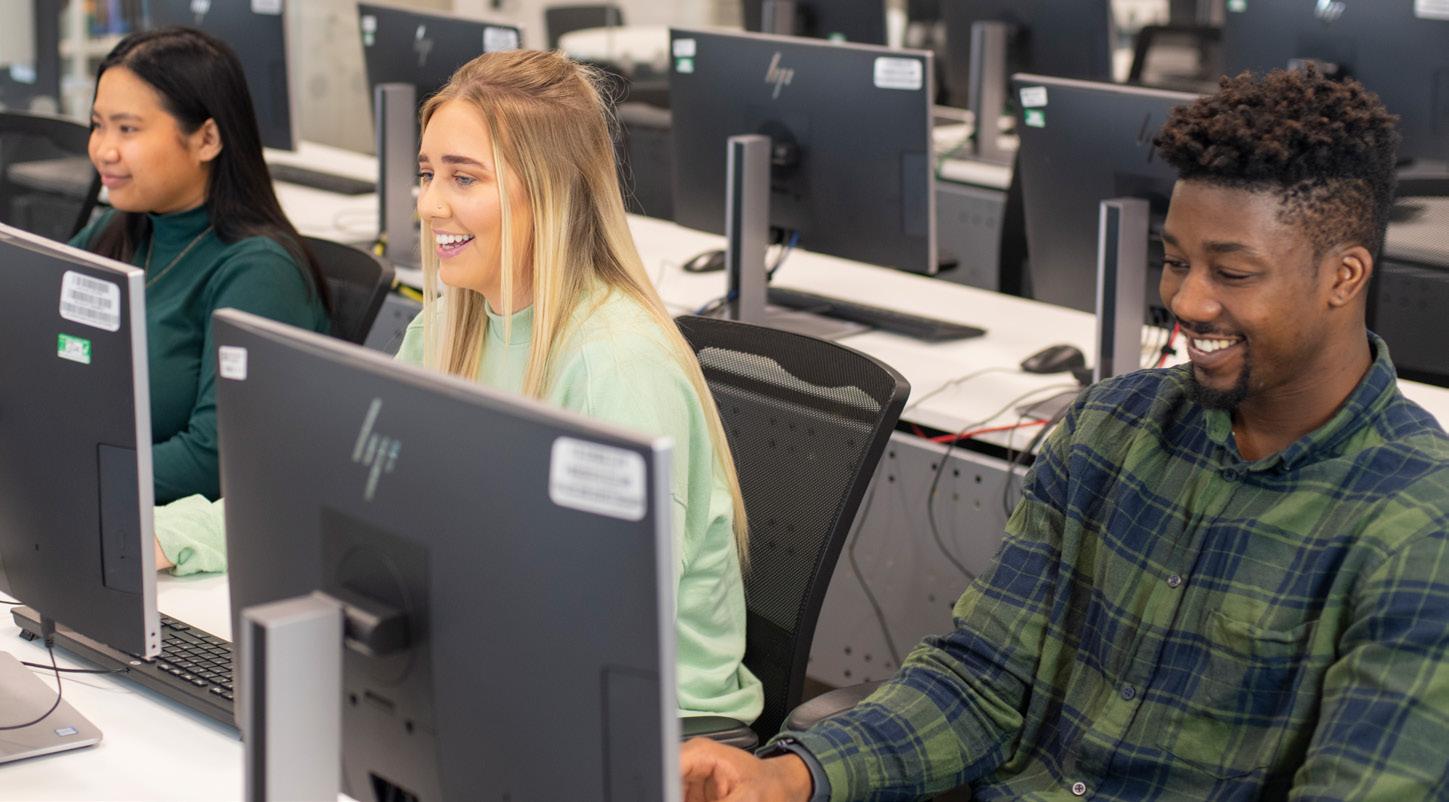
Skills Hub
To support our students to complete their courses efficiently and with confidence, our Academic Services department has developed an Academic Skills Hub, available to all students through our Brightspace Virtual Learning Environment.
This hub is packed with online resources and opportunities for faceto-face or virtual support, designed to help our students to develop skills in academic writing, critical thinking, presentation and seminar skills, reading, referencing and more.
Visit the Academic Skills Hub
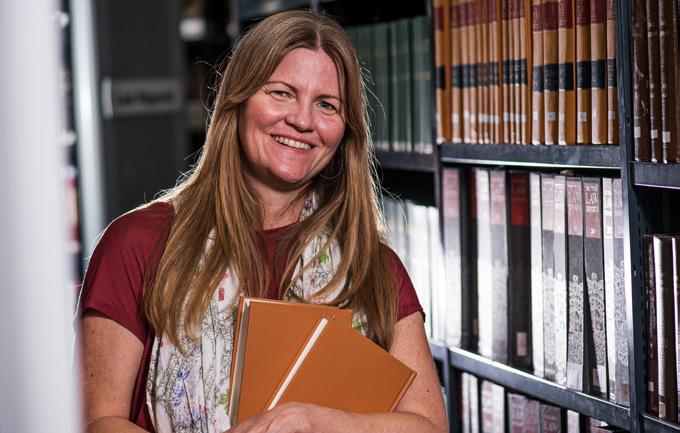
future projects related to sustainability research and discuss the skills required for a job related to sustainability.
In 2023, Bournemouth University retained its Silver rating in the Excellence Framework (TEF) for all our undergraduate courses. This rating lasts for four years from 2023.
The TEF is a national scheme run by the Office for Students (OfS) that aims to encourage higher education providers to improve and deliver excellence in the areas that students care about the most, including teaching, learning and achieving positive outcomes from their studies.


Bournemouth University challenges marginalisation, misinformation and under-representation
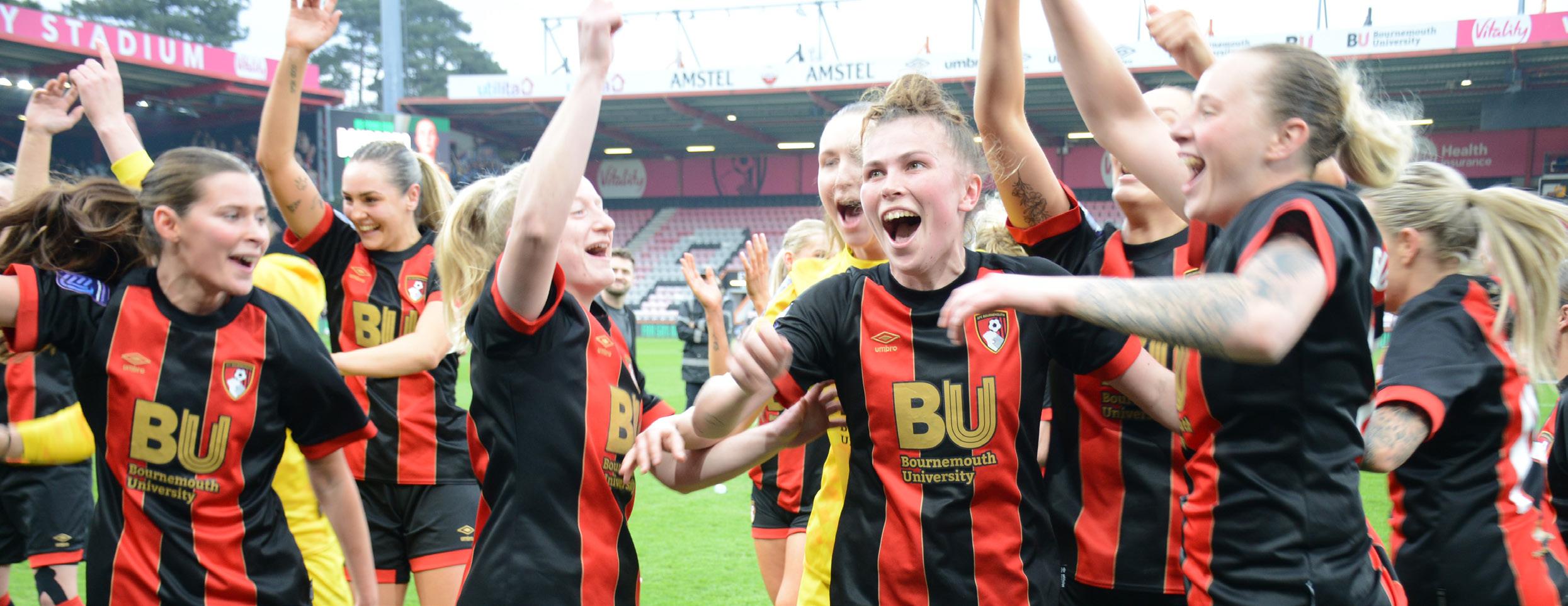
Our design and engineering courses at BU, including, BSc (Hons) Design Engineering, BSc (Hons) Product Design, and BEng (Hons) Mechanical Engineering, are wellestablished, accredited, and equipped with state-of-the-art facilities including the latest rapid 3D printing, prototyping and manufacturing equipment.
We are also committed to fostering an inclusive and supportive environment for women in Science, Technology, Engineering and Maths (STEM). Each year, the Design and Engineering department proudly celebrate International Women in Engineering Day during the annual Festival of Design and Engineering, to celebrate the remarkable contributions of our female students and staff within the department.
BSc Product Design student, Millie Hanlon, said: “I think the industry can really benefit from a women’s perspective, so I think it’s important to make that change.”
Sociology is the study of how people interact with each other; a topic that is rapidly becoming more relevant in our contemporary world.
The final year unit Troubling Gender on the BA Sociology course explores gender as a socially constructed and historically variable aspect of societies, past and present.
Students are required to examine the ways in which gender informs and structures social inequalities, and analyse the interrelationships between gender, power and other social categories (e.g., class, sexuality, race, ethnicity, religion, age, and nationality).
THE Impact Rankings 2025 result
201-300 in the world 17th in the UK
62.2 Research score out of 100
80% programmes aligned to this UN Sustainable Development Goal
BU is committed to providing equal pay for work of equal value for all our employees.
To achieve this aim and support development, progression and achievement for all, we continue to implement our Gender Pay Gap Action Plan. This includes taking action to attract female talent and mitigating bias in the hiring process, targeting investment in women’s career development, fostering a working environment where women can thrive, and championing gender equality at a department/faculty level.
Our Gender Pay Gap report measures differences between the average (mean and median) earnings of men and women who work at BU. When the 2023 and 2024 gender pay reports are compared the results demonstrate our gender pay gap continues to steadily decrease:
• The mean base pay gap has reduced from 14.9% to 13.4%
• The median base pay gap has also reduced from 15.8% to 13.7%.
The BU Women’s Academic Network (WAN) aims to support women and to raise their profile within organisations and beyond, as well as lobby on gender inequality issues.
The network hosts a programme of events that raise the profile of women across the sector and create a regular networking forum. It also works alongside professional departments at BU to offer mentoring support and high-profile role models to female academics to ensure academia is equal, diverse, and inclusive.
Athena SWAN
BU is proud to have held the Athena SWAN Bronze Award since 2015. This award is a demonstration of our commitment to ensuring a fair, inclusive and supportive environment where all staff and students can thrive, reaching their full potential.
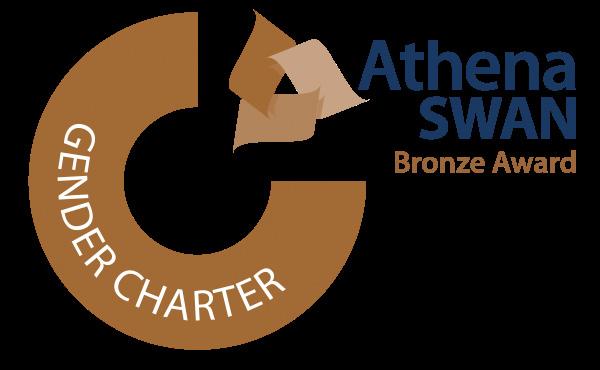
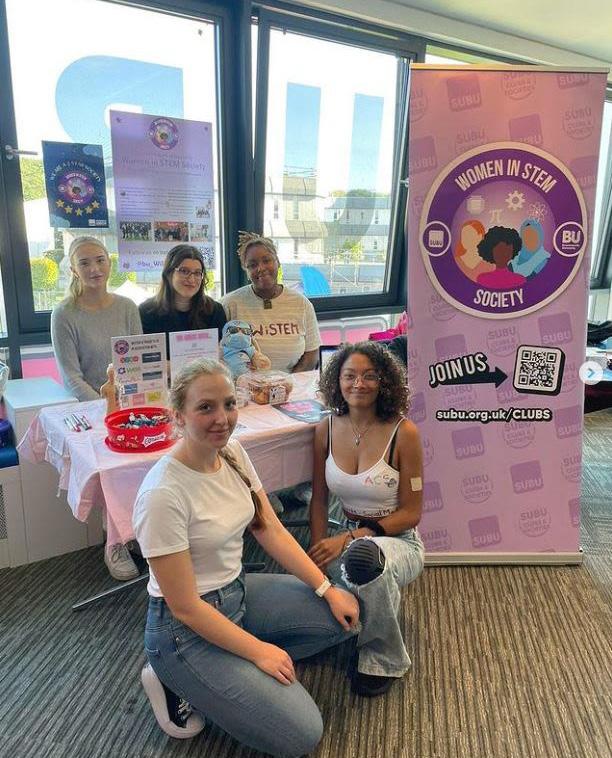
The Women’s Network is one of SUBU’s six Liberation Networks – all of which are designed to create communities and promote intersectionality.
The Women’s Network supports students who self-define themselves within this group. They run a variety of events and campaigns to increase awareness and drive change, including drink spiking awareness, leadership and business events for women, raising awareness for Cervical Cancer Screenings, and holding film nights to showcase strong female representation within the media.
SUBU Women’s Officer Mia Evans said: “I believe in embracing and celebrating our differences and making everyone feel welcome and comfortable.”
Dr Mili Shrivastava and Dr Sukanya Ayatakshi-Endow, both from BU’s Business School, have contributed evidence to a parliamentary enquiry that aims to explore the challenges that women face when trying to start and grow their own businesses. They identified key barriers including social norms, gender stereotyping, limited exposure to STEM fields, and feelings of patronisation. However, they also emphasised the value of support from fellow female entrepreneurs, business development support, and targeted opportunities for ethnic minority women to help strengthen their professional connections.
Women and Equalities Committee (WEC) Chair Sarah Owen MP said: “As the Government aims to strengthen economic growth, a timely assessment is needed into what more could be done to help the development of femaleled enterprises.”
The Aurora Programme is a leadership development initiative for women, designed to support and empower women in higher education with their career development.
This opportunity is open to all women at BU in professional services or academic roles, in grades 4 up to grade 8 who are looking to advance their career. It is especially suitable for those with little or no experience in management and leadership.
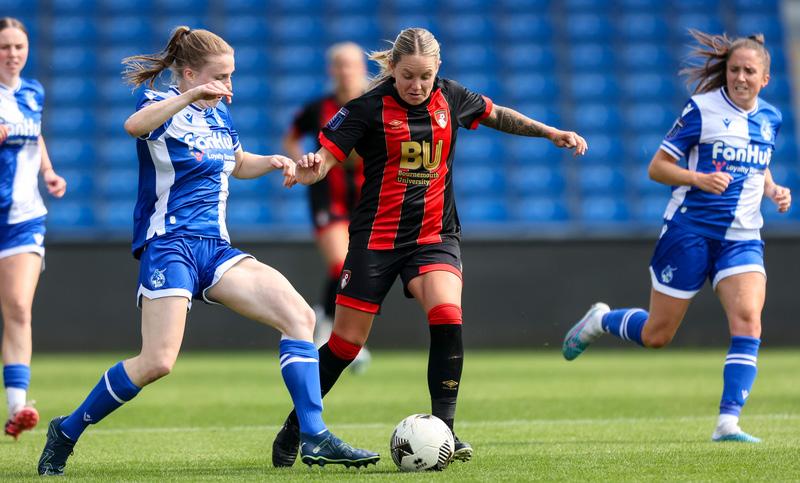
BU is the official higher education partner of AFC Bournemouth, and the principal partner of the women’s and girls’ teams. Off-pitch, we collaborate with AFC Bournemouth to educate and inspire
women into football through resilience workshops, masterclasses, and more.
Each year, the partnership is celebrated through the BU Big Match. This year, the event was attended by more than 100 students, all getting involved with activities around the match.
Professor Alison Honour, Vice-Chancellor of Bournemouth University, said: “I was so pleased to see so many students supporting the event, whether it was our sports therapists working with the women’s team, the sports journalists in the press box, the cheerleaders performing in front of 7,000 fans, or teams supporting the event with pre-match activity.”

Bournemouth University helps people live better, for longer
Ensure availability and sustainable management of water and sanitation for all
Bournemouth University helps to protect and preserve a sustainable environment
Bournemouth University challenges marginalisation, misinformation and under-representation
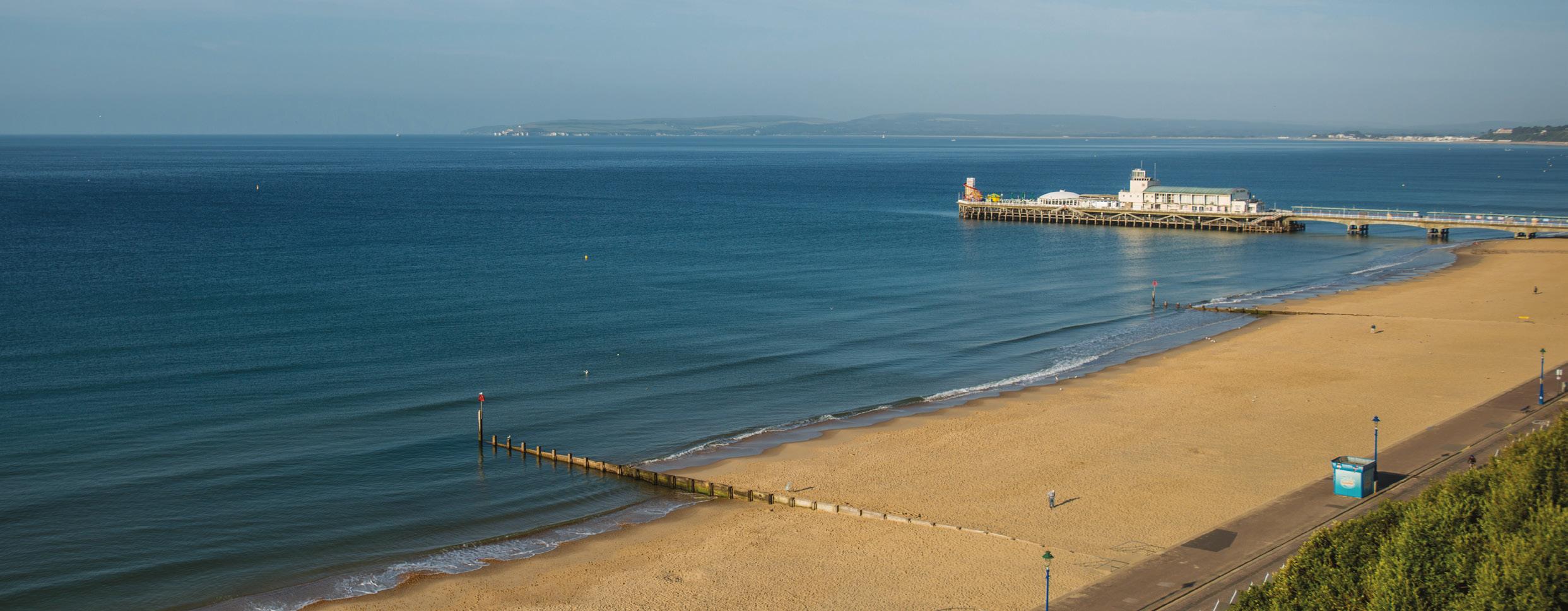
Our BSc (Hons) Environmental Science course provides a broad understanding of how humans shape the world and how we can begin to tackle issues that arise from this, as well as practical experience through fieldwork, lab work, computing, data analysis, report writing, and work placements.
Fieldwork opportunities can take place overseas or more locally along the World Heritage Site Jurassic Coast, East Devon World Heritage Coast, and the New Forest. Watch this video to learn more about the course.
The final year Freshwater Resource Management unit of this course covers the conservation and management of freshwater resources, sustainable development, and planning policy.
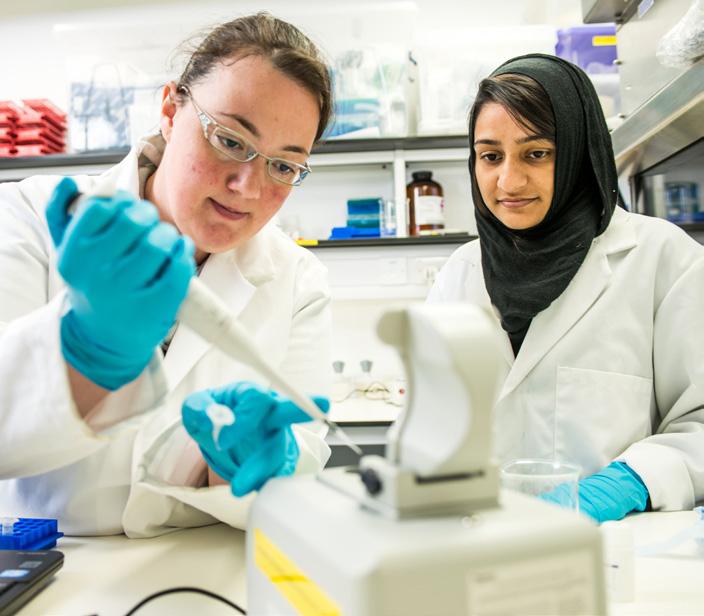
THE Impact Rankings 2025 result
71st in the world 5th in the UK
78.8 Research score out of 100
45% programmes aligned to this UN Sustainable Development Goal
Assessing water quality at Poole
Poole MP Neil Duncan-Jordan is often contacted by local residents who are concerned about the water quality for swimming in Poole. In response, Duncan-Jordan reached out to Dr Daniel Franklin and Magda Barrow at BU for expert advice about assessing and monitoring the quality of water, and how to test water for pollutants using our labs on our Talbot Campus.
Key markers the team are looking for include bacteria or nitrates, which could be signs of waste in the water, or agricultural run-off from surrounding land, all of which could affect the quality of the water.
Dr Daniel Franklin said: “We hope that ongoing work in this area will continue to shine a light on the issues and thereby lead to better management and a cleaner and safer harbour.”
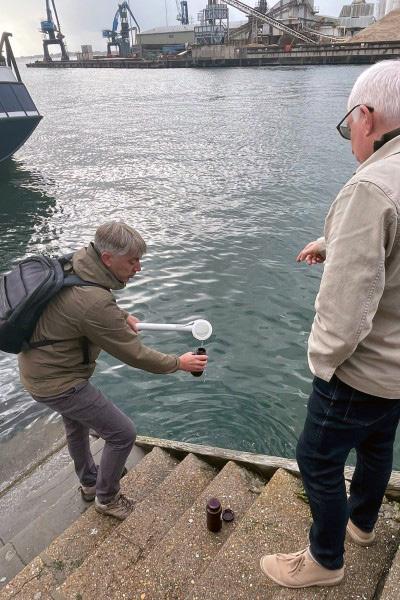
Water, Sanitation, and Hygiene (WASH) facilities in schools in Nepal
Professor Edwin van Teijlinggen, Professor of Reproductive Health, has been investigating how the provisioning of WASH facilities in schools in Nepal can impact students’ health status, school attendance, and educational achievements.
This research revealed that poor school WASH facilities hindered students’ school attendance, particularly for menstruating girls. In particular, schools that lack water and soap, secure toilet doors, and do not have separate toilets for girls have high rates of absenteeism. Therefore, it is critical that WASH facilities are provided to improve health and well-being, attendance, and academic performance.
The SUBU Environmenstrual Collective is a campaign created by the VP Welfare & Community to promote sustainable sanitary products, and to lobby our commercial services to stock student costfriendly products.
Free sanitary product stations are now available in toilet areas across Talbot and Lansdowne campuses, and our new campus at Portsmouth, providing free menstrual products to all BU students. These are provided by the BU estates team through our cleaning contractor.
BU have partnered with City to Sea to become the first Refill Campus. This means we have pledged to take steps to ensure that all our buildings are free of single-use plastic.
You can see our commitment to becoming a Refill Campus from the eye-catching artwork on 45 of our water refill points across BU, making it easier for students and staff the find a refill point and use their reusable water bottles.

BU has introduced rainwater harvesting systems (RWHS) in our Fusion Building, Poole Gateway Building, and Bournemouth Gateway Building.
Rainwater captured by RWHS is used to supply the toilets instead of treated drinking water. This saves energy whilst also reducing the potential for flooding on campus.
Our systems supplied around 2% of the water used across the whole of BU for 2023-24.
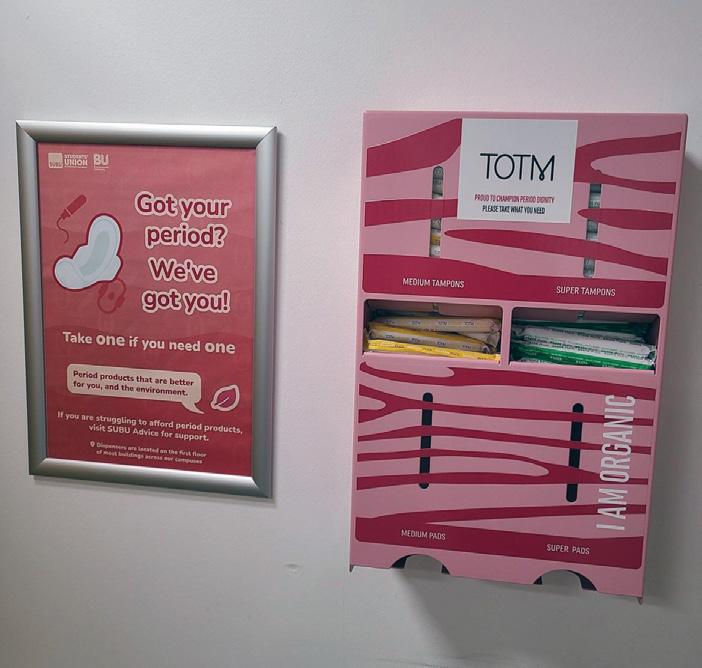

This year, a team of first year BA Media Production students produced a short documentary to raise awareness of SDG 6: Clean Water & Sanitation, using our Refill Campus as a case study. The students also reached out to BCP Council and NGO Friends of the Earth as part of their project. You can watch the video here.
Poole Gateway Building
45,000 litres of rainwater used in 2023-24
Fusion Building
553,000 litres of rainwater used in 2023-24
Bournemouth Gateway Building
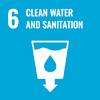
418,000 litres of rainwater used in 2023-24
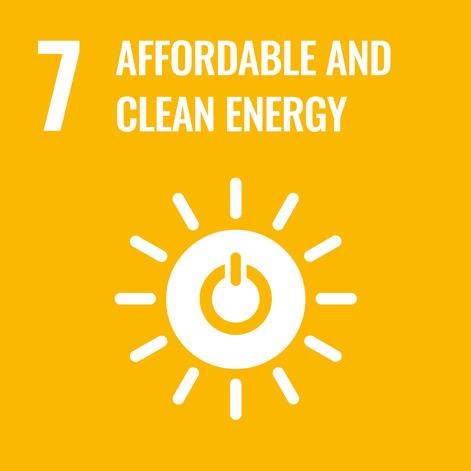
Ensure access to affordable, reliable, sustainable and modern energy
Bournemouth University helps to protect and preserve a sustainable environment
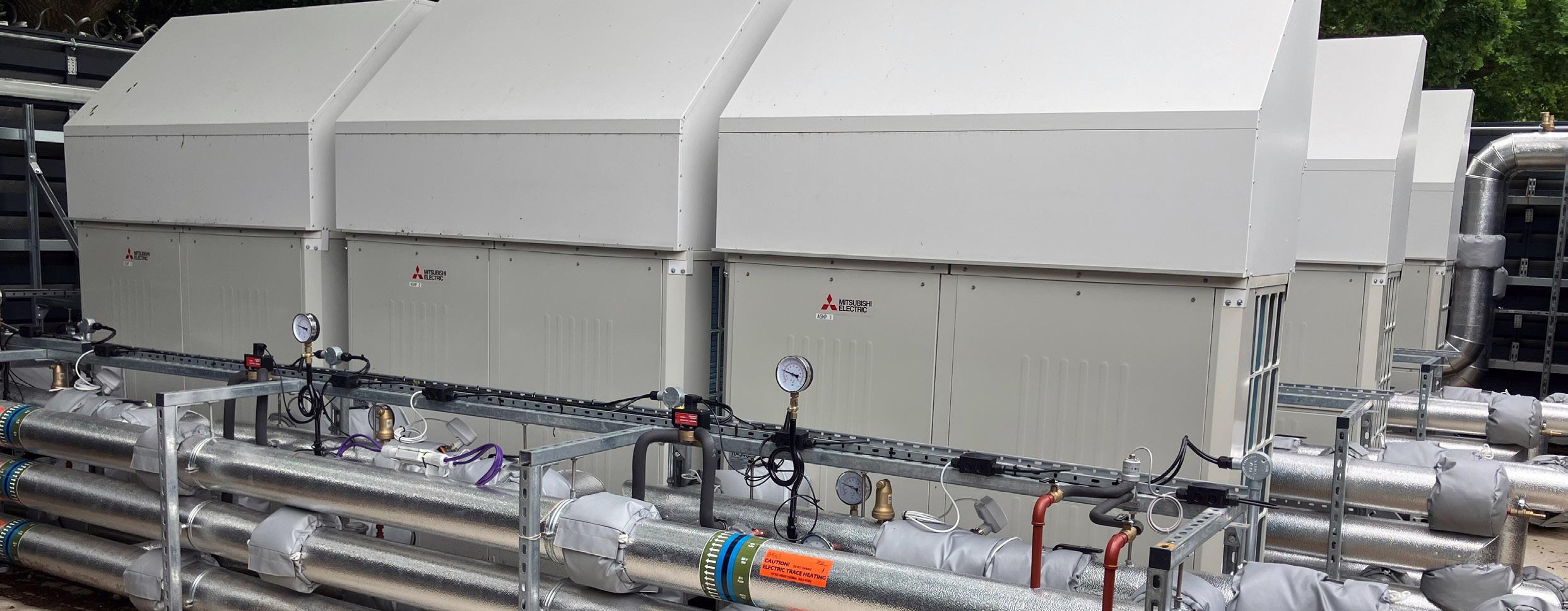
The need to phase out the use of fossil fuels and the development and implementation of green technology has become a major political priority.
This short online course examines the environmental and social impacts of different technologies, to evaluate critically which approaches might truly be considered ‘green’.
Key topics covered include motivations for using green technologies, Life Cycle Analysis and Environmental Impact Assessment, energy efficiency of buildings, carbon capture and engineering, and more.
Similar short online courses available at BU include Frontiers of Sustainability Science, and Sustainable Development in Practice
Engineering Principles is a foundational level 4 unit taught across all our Design Engineering and Mechanical Engineering courses.
The unit helps students to understand the application of core engineering principles for designing components and structures, and to develop reliable solutions. It also explores the design principles of solar panels and alternative energies under its two main themes, solid mechanics and thermofluids, covering energy efficiencies and cost benefit ratios through conversion and heat transfer.
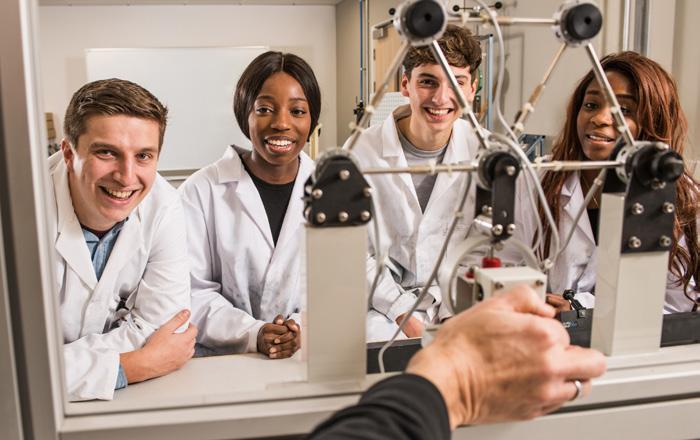
THE Impact Rankings 2025 result
301-400 in the world 24th in the UK
55.0 Research score out of 100
51% programmes aligned to this UN Sustainable Development Goal
Professor Zulfiqar Khan of Design Engineering and Computing has contributed to research that provides a new model for improving the thermal efficiency of heat transfer fluids (HTFs) used in solar thermal applications, while also minimising energy consumption that is needed for pumping the fluids.
Unlike other models, this one recognises the combined effect of corrosion behaviour and heat transfer properties of liquids.
This model provides a governing principle for enhancing concentrated solar power systems.
The RGF fund has been utilised by BU for nearly 15 years and ended in March 2025. With a total initial fund of £250,000 (£50,000 from BU and £200,000 from Salix) energy saving projects have been completed with the savings reinvested back to enable further projects. Since the initial fund value BU has reinvested over £1.1M and completed 100 projects since its first project in February 2010. Read more about the success of this scheme in this article on the Salix website. This year it was used for LED projects at Studland House, Executive Business Centre and our Yeovil Campus with further projects at The Old Fire Station (TOFS).
BU data centres are responsible for 12% of our total electricity use. The Sustainable IT working group continue to meet quarterly to address sustainable IT issues such as reducing emissions and increasing efficiency, and to support the delivery of the Sustainable IT Policy
We have a target of 15% reduction in power consumption of IT equipment in data centres by 2025/26. IT services replaced some data centre equipment with new technology. The data for 23-24 shows a clear reduction in energy consumption with Jurassic House consuming 12% less electricity and Studland House 9% less.

Lush Limited is a British cosmetics retailer which is headquartered in Poole. BU’s NanoCorr, Energy and Modelling (NCEM) Research Group, led by Professor Zulfiqar Khan, have been working with Lush to investigate the potential of harnessing tidal energy from Poole Harbour.
BU students benefit from this collaboration through research informed education, and having the opportunity to engage with industry. Currently, three
students are focussing on energy systems as their final year project, inspired by the BU-LUSH collaboration.
Professor Khan said: “This recent collaboration with LUSH is a testament of our commitment to the UNSDGs, and to UK and EU clean energy directives. Initiatives like this has led to the emergence of BU as a global leader in Clean Energy Systems.”

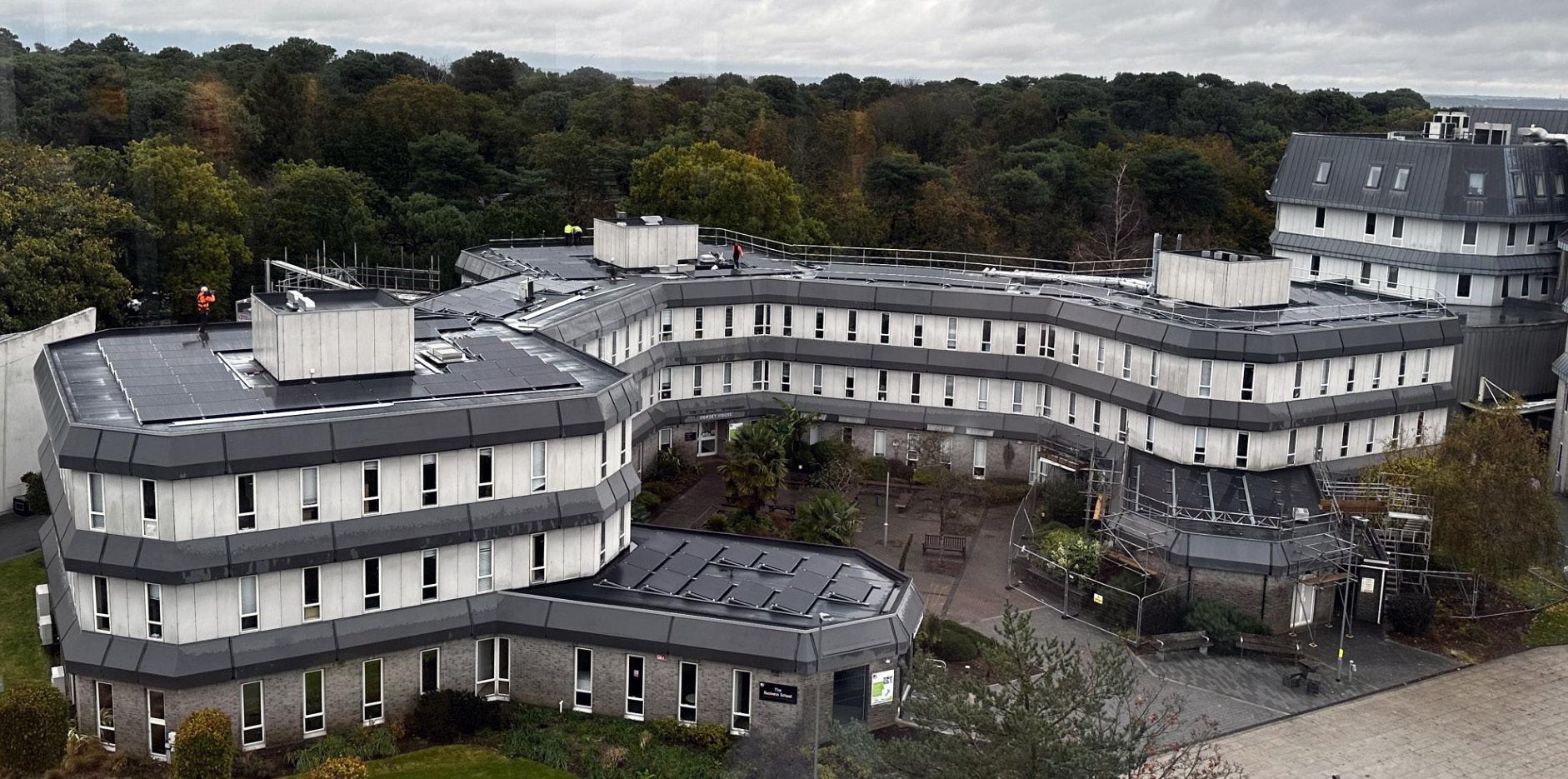
This year we have delivered our first existing building heat decarbonisation project. We have replaced end of life gas boilers in Dorset House on our Talbot Campus with nine air source heat pumps, which transfer heat energy from the air outside to water storage tanks. This water is then used in the existing heating systems in the building. This system will save around 64.4 tonnes of carbon dioxide equivalent per year.
This project has been part funded by the university and part through the UK Government’s Public Sector Decarbonisation Scheme (PSDS). This project supports our Heat Decarbonisation Plan which was funded by the UK Government Low Carbon Skills Fund. It identifies projects to switch away from fossil fuel heating to lower carbon options.
Watch this video to learn more about this exciting renewable technology on our campus.
To help provide the green electricity needed to power the heat pumps we have installed a new 80kWp solar photovoltaic (PV) array on the roof of Dorset House. This includes 192 solar panels and should produce around 80,000kWh of electricity each year.
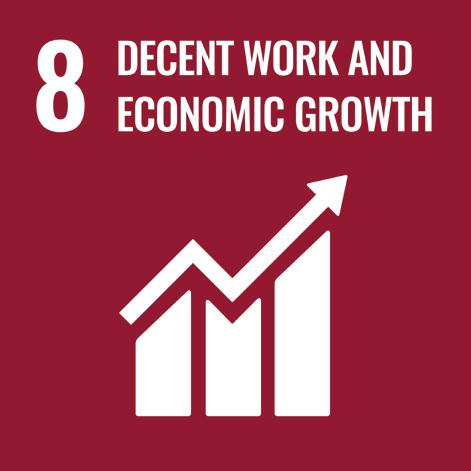
Promote sustained, inclusive and sustainable economic growth, full and productive employment and decent work for all
Bournemouth University helps to prepare for and recover from crisis
Bournemouth University is acting as a catalyst for growth, using our skills and expertise to boost skills and advance the region
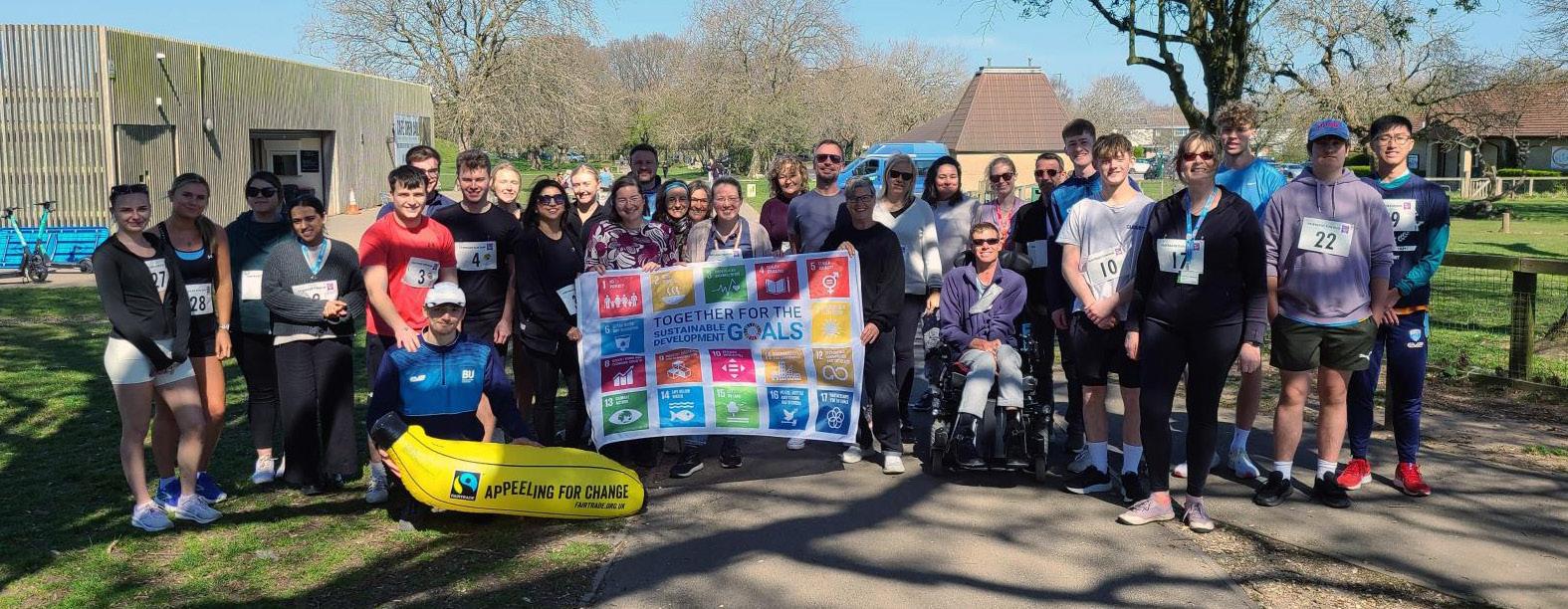
BA Business & Management (Global Operations)
This course investigates how global operations and supply chains can achieve competitive advantages through planning, sourcing, making, delivering products and services to global businesses and their customers.
The Globally Responsible Business Practice unit taught as part of the BA Business & Management course aims to put ethics at the core of our thinking about business globally, and generate insightful thoughts on sustainable business practices, stakeholder engagement and the importance of accountability in the relationship between businesses and their various stakeholders. It uses case studies of corporates practice, CSR theory and cutting-edge contemporary developments to examine how business aligns to the UN SDG agenda.
MSc Sustainable Economic Development & Emerging Markets
The MSc Sustainable Economic Development & Emerging Markets course examines the issues surrounding sustainable development involved in emerging market economies.
With content covering sustainable regional development, global economic challenges and entrepreneurship, students graduate understanding pervasive, contemporary and emerging issues in sustainable and ethical economic development, as well as how to address them innovatively and critically.
18th in the world 2nd in the UK
82.5 Research score out of 100
78% programmes aligned to this UN Sustainable Development Goal
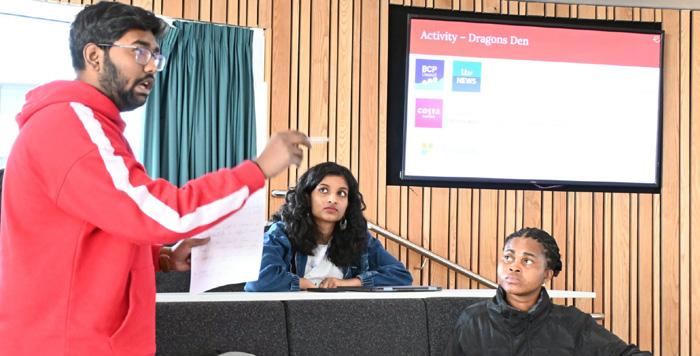
Managed by CareersBU and industry partners, the Graduate Skills Programme (GSP) is a free extracurricular employability programme available to all students at BU. Through this programme, students have access to a variety of industry-led masterclasses, industry insight days, online learning resources, and extra-curricular opportunities.
This year, we’ve welcomed 32 speakers from 29 different organisations from a wide range of sectors including finance, IT, healthcare, marketing, sustainability, education, including companies such as IBM, Mariott Bonvoy Hotels, University Hospitals Dorset and BCP Council. Topics have ranged from leadership to networking to cyber security to growth mindset, to giving back to the community. Student feedback is incredibly positive, as summed up by this quote from one of our graduates; “I am a master’s student
and have worked in education for 10 years, so very much feel like I am starting again. This programme has given me the confidence to feel like I can branch out of teaching and begin applying for jobs outside the classroom. I have been blown away by the knowledge and calibre of the speakers you have brought in to deliver the masterclasses and workshops and I have thoroughly enjoyed the whole GSP.”
Using our expertise as a catalyst
At BU, we strive to contribute to regional growth through partnerships with local businesses and public bodies, by providing our academic expertise, producing a highly skilled workforce, and through our economic activity.
For example, this year Professor Davide Parrilli from our Business School was invited to a round table discussion to contribute to the future of regional economic development in the UK, alongside senior officials of the UK Government.
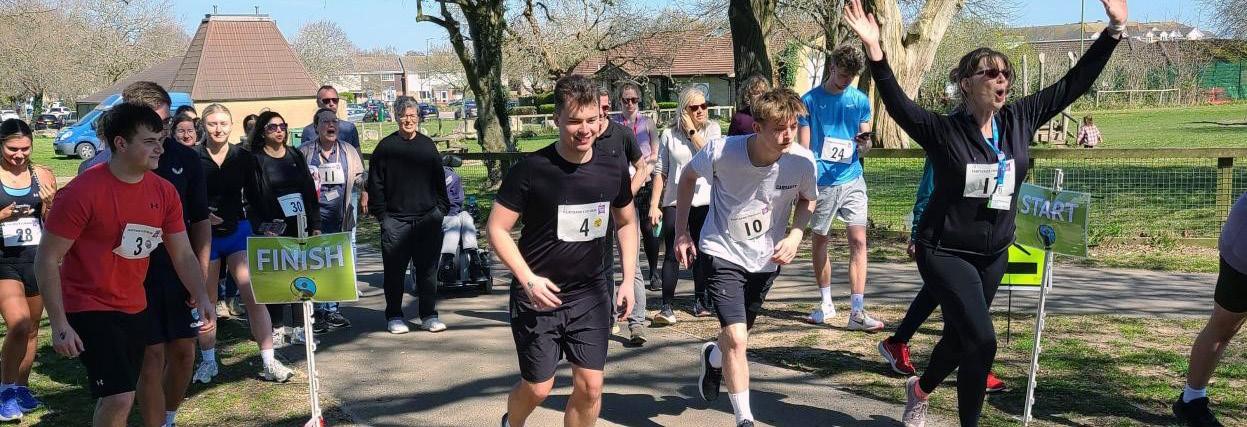
Fairtrade works with farmers, businesses and governments to make trade fair. We support this mission at BU, which is why we have been a Fairtrade University since 2006. In 2024, we recertified as the only 3-star Fairtrade University in the UK. We continue to stock Fairtrade products where possible across our campus, and deliver new, exciting events and activities to champion the message of Fairtrade at BU.
This year, two of our BSc Sports Management students planned and co-
ordinated a Fairtrade Fun Run to raise awareness of Fairtrade, with support from the Sustainability Team, SportBU, the Student’s Union, and Elena Fernández Lee from the Fairtrade Foundation who opened the event on the day.
The Fairtrade Fun Run was attended by a mix of students and staff, creating a real sense of community and common purpose. The top three winners received a Fairtrade hamper filled with Fairtrade goodies, put together and donated by our catering provider Chartwells.
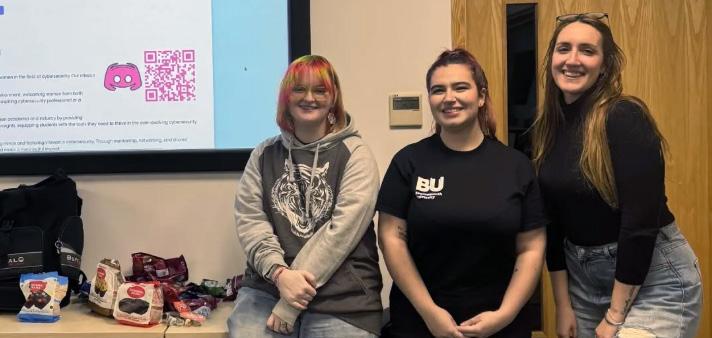
CyberSecWomen is a student-led society dedicated to empowering women in the field of cybersecurity, regardless of their background or experience level.
They focus on practical skills and insights to ensure students are prepared to thrive in the ever-evolving cybersecurity landscape. They also aim to foster interest in the field through mentorship, networking, and events including guest talks, hackathons, and Capture the Flag (CTF) competitions; a challenge where teams or individuals must find a missing piece of information, or ‘flag’, within a system.
Iris Compan Del Monte, BSc Cyber Security Management graduate and Founder of CyberSecWomen said: “I started CyberSecWomen to create the kind of supportive space I wish I’d had, where women feel encouraged to try, learn, and belong in cybersecurity.”
This year, our Business School signed the Charter for Inclusive Entrepreneurship, joining universities and other organisations across the UK in a collective effort to foster a more inclusive enterprise system.
The Charter acknowledges the failing of the current system in providing fair and productive access to entrepreneurship opportunities, particularly for underrepresented social groups including women, ethnic minorities, young people, migrants, and individuals with disabilities. The Charter aims to enable equitable access to entrepreneurship and improve outcomes for all individuals.
Professor Lois Farquharson, Executive Dean of Bournemouth University Business School, said: “Signing the Charter for Inclusive Entrepreneurship reflects our commitment to breaking down barriers and creating opportunities for underrepresented groups.”
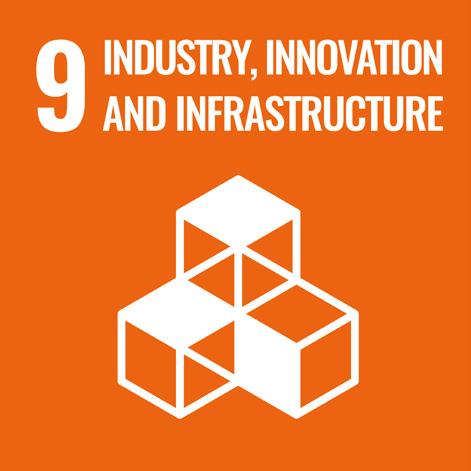
Build resilient infrastructure, promote sustainable industrialisation and foster innovation
Bournemouth University helps to protect and preserve a sustainable environment
Bournemouth University is helping creative and cultural heritage to thrive
Bournemouth University is acting as a catalyst for growth, using our skills and expertise to boost skills and advance the region
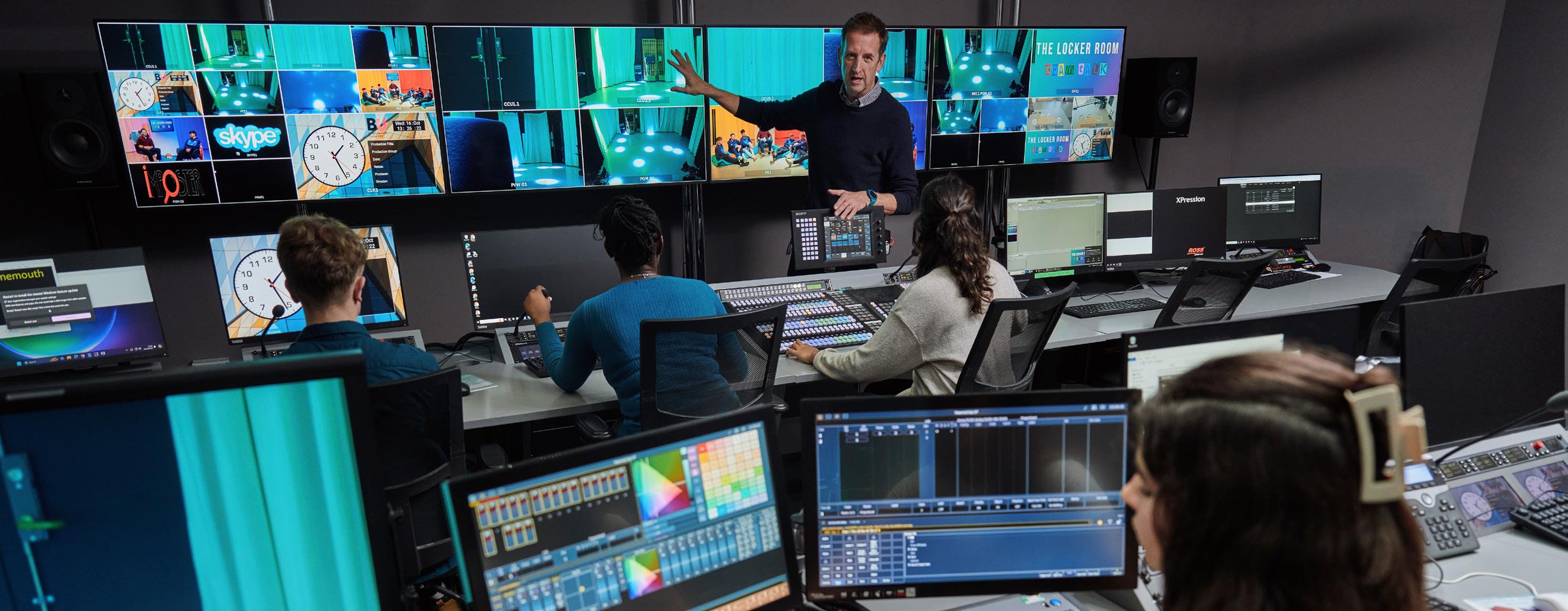
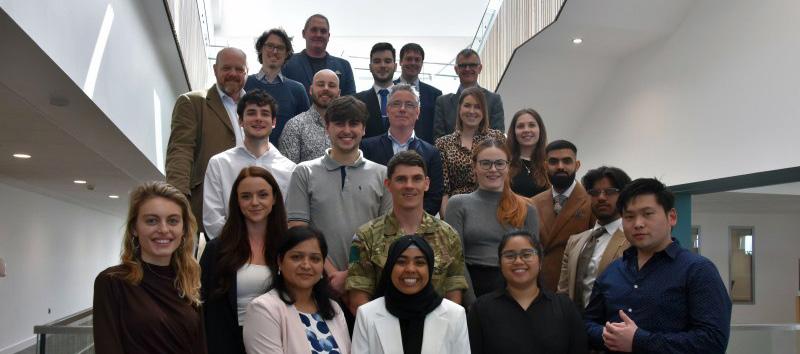
The Hacking for Sustainability (H4S) module is an entrepreneurial module available to our Business & Management students.
Students are challenged with generating solutions to real sustainability challenges for the Ministry of Defence (MoD), with a focus on innovation, professionalism, and purpose - providing students with a distinct career advantage.
Unit Leader for the H4S module, Dr Mili Shrivastava said: “For students, it’s more than a unit - it’s a hands-on experience that builds real employability. For partners, it’s a chance to collaborate with the next generation of strategic thinkers and innovators.”
This unique course enhances our students knowledge of innovative practices, managerial processes and entrepreneurial behaviours contributing to the growth of sport as a global industry.
Students studying MSc Sport Innovation Management & Entrepreneurship will learn from a team of research-active academics who have strong links with both the sport industry and the wider business community. This course is ideal for those looking for a career in sport innovation management, sport marketing and sport business.
601-800 in the world
25th in the UK
38.8 Research score out of 100
84% programmes aligned to this UN Sustainable Development
The Centre for Sustainable Business Transformations (CSBT) delivers interdisciplinary research and knowledge exchange that address the needs of businesses, policy and society.
This year, the CBST welcomed academic experts and business leaders to discuss the evolving landscape of sustainability reporting, corporate responsibility and environmental, social and governance (ESG) regulations; a topic that is becoming an increasingly critical component for driving competitiveness, building reputation, and developing stakeholder trust. Professor Marcjanna Augustyn, Head of the CSBT, also discussed the motivations and challenges, technology enablers, and standards and compliance.
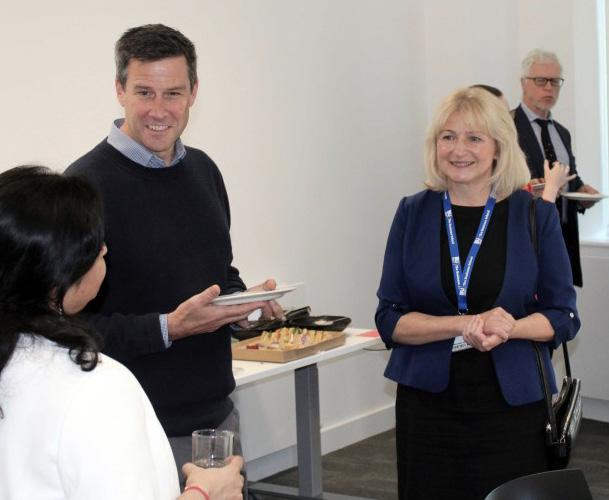
The Festival of Design and Engineering is a celebration of our students creativity, ingenuity, and ability to develop technologies that address real-world problems.
From health and well-being to environmental challenges, student projects encompass everything from market need, to function and aesthetics, to sustainability.
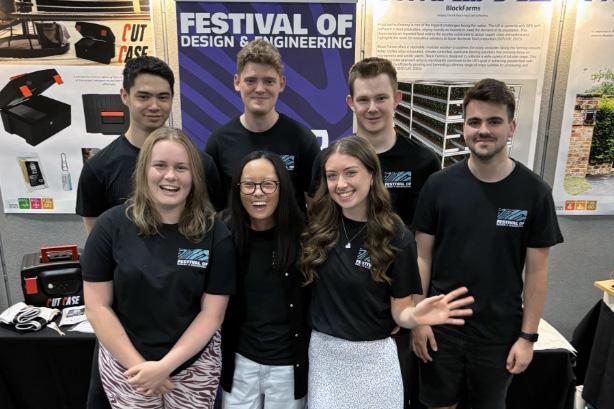
The student owned business fair is a celebration of creativity and entrepreneurship and provides our students a space to showcase their innovative business ideas and start-ups. This year the event was organised by SUBU and took place leading up to Christmas. The students showcased their Christmas themed goodies such as handmade candles and jewellery. They also had the opportunity to pitch their business ideas for a chance to win £200, and to engage in a panel discussion with influencers, film makers, product designers, app developers and craft shop owners.
Students have the opportunity to showcase their designs and prototypes to industry, commerce, friends, family and the public.
This year, examples of projects include the Electric Tractor by Archie Evans, designed to reduce dependency on manual labour in low-income areas and promote sustainable agriculture growth. OSMO, created by Abigail Arkle, turns wastewater into portable drinking water to provide safe drinking water to community lacking reliable purification systems.
You can explore more of the incredible work of our 2024 student cohort here
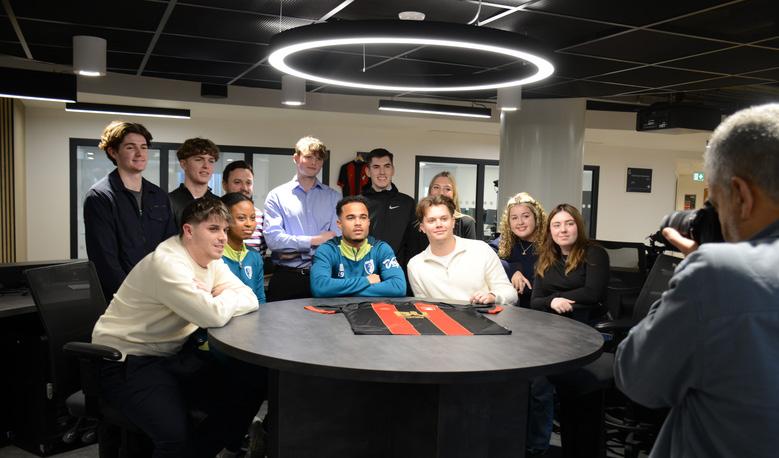
Dr Bryce Dyer, Associate Professor in Sports Technology, has worked on a range of high-profile projects, including designing medal-winning prosthetics and equipment for athletes at the Paralympic Games.
Dr Dyer also engages with the evaluation and development of new policy in sport technology, and actively investigates the ethics of emerging technologies in sport.
Learn more about the evolution of prosthetic technology in this episode of The Sports Engineering Podcast
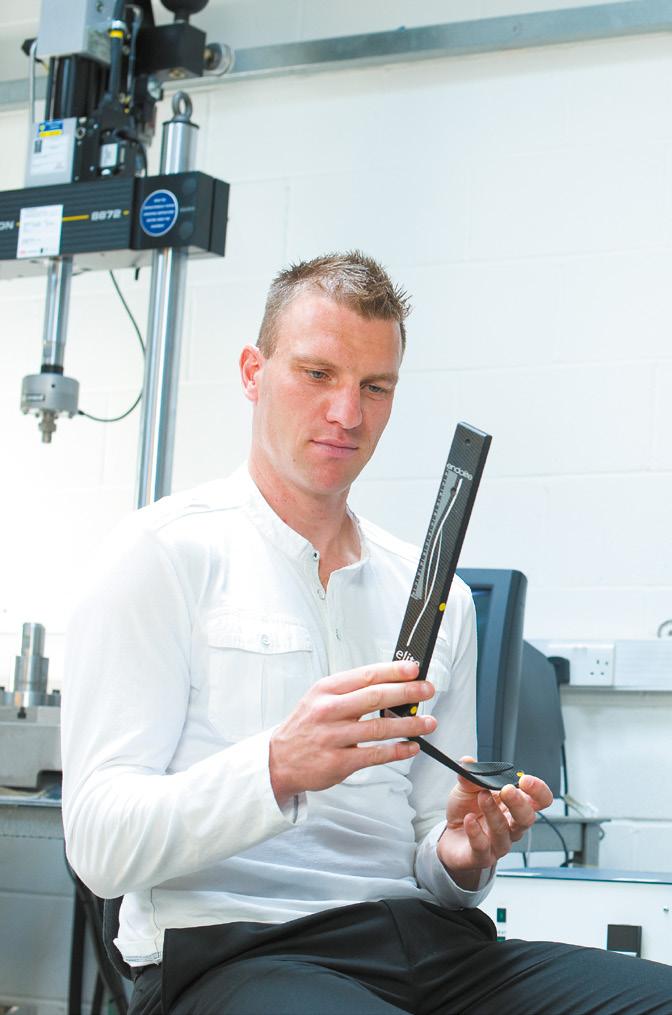
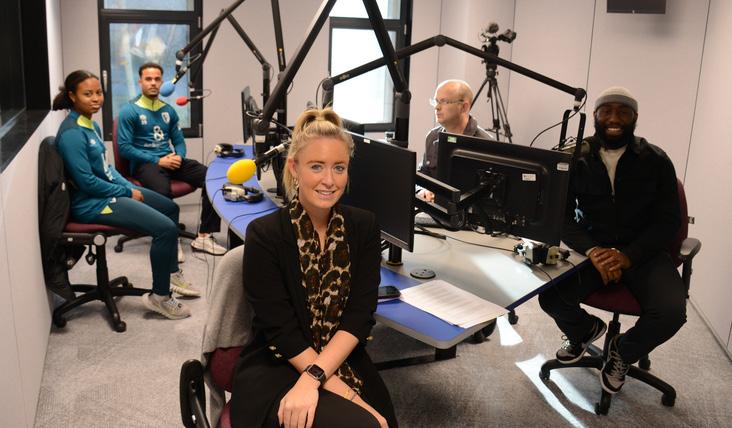
The redevelopment of Weymouth House has seen the addition and expansion of fantastic teaching facilities, new PC labs, radio studios, podcasting rooms, welfare facilities, and a social collaboration space at the heart of the building.
This major BU project will create an active and vibrant learning space for students, foster a sense of belonging, and help to develop a stronger identity for the Faculty of Media & Communication on Talbot Campus.
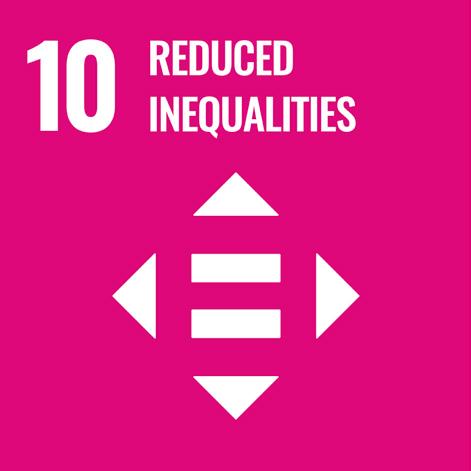
Bournemouth University challenges marginalisation, misinformation and under-representation
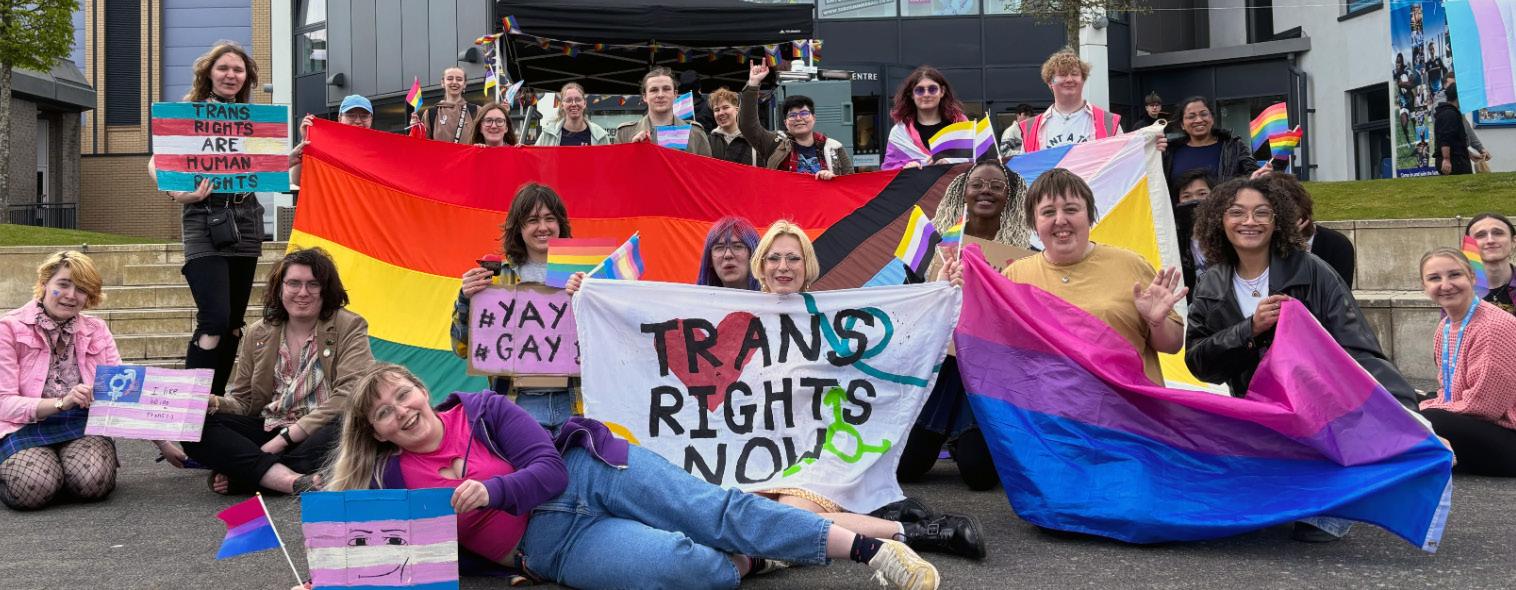
Our MSc Public Health course reflects on local, national and international public health agendas, with a particular focus on reducing inequalities, climate change, and lived experience.
Students learn about epidemiology and critical evaluation techniques to identify what influences the health of national and international populations, and to formulate their own health solutions. This course also attracts students from across the world, allowing students to share experiences and gain perspectives.
Read more student experiences of university life on this blog
This course explores topics in political journalism, gender and race, and emotions driving politics. Students are provided with insights into the latest developments in political communication worldwide, and the practical knowledge they need to analyse and tackle current political communication issues.
Those who study this course also benefit from BU’s extensive links with political organisations, NGOs, and communication consultancies at local, national, and international levels.
70.4 Research score out of 100 101-200 in the world 35th in the UK
Tackling inequality in maternity
Professor Vanora Hundley and Professor Edwin Van Teijlingen from the Centre for Midwifery and Women’s Health are working in partnership with Sheffield Hallam University to reduce health inequalities for marginalised mothers and babies, by establishing the Maternal and Infant Health Equity Research Centre.
This research centre will focus on issues highlighted by women from migrant, ethnic minority and deprived communities, and marginalised groups such as mothers with disability. Researchers will work with mothers and families, communities and charities to explore innovative solutions using emerging technologies.
Professor Hundley said: “Our approach brings together digital, social science and midwifery expertise to generate new insights and solutions to the disparities in maternal and newborn outcomes.”
Dr Jayne Caudwell and Dr Frankie Gaunt from the Department of Social Sciences and Social Work have been conducting workshops with young people from the LGBTQ+ community to understand their views and experiences of the online world.
Those who participated were asked about the online platforms they use, and whether they foster a sense of security, happiness, and belonging.
They found that while mainstream media is often negative, the internet and social media provides a platform for sharing positive LGBTQ+ stories. Six key themes were drawn from this research, which were displayed as posters at the Lighthouse Poole and as part of the ESRC Festival of Social Sciences in 2024.
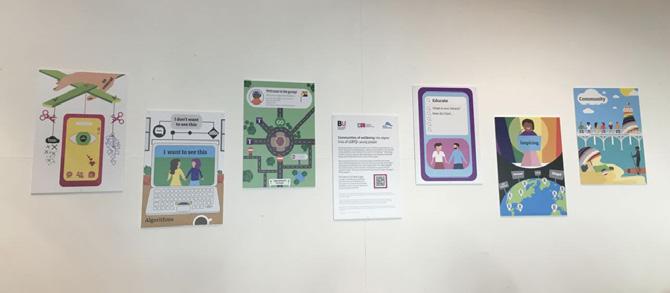
Alumni of the Year 2023: Enriching Society Award Winner, Annabelle Bridges
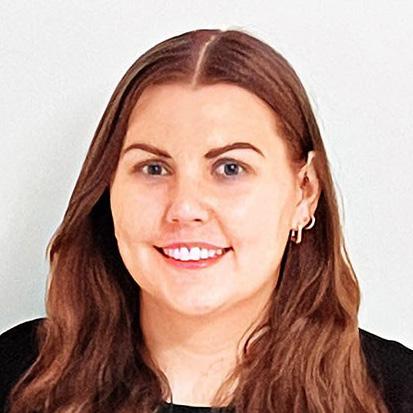
After suffering a spinal cord injury, leaving her paralysed from the waist down for months and later being diagnosed with Multiple Sclerosis (MS), BA Accounting & Finance graduate Annabelle decided to raise awareness of disabilities and drive positive change. Annabelle is now an active member of the firm’s disability working group at Grant Thornton, as well as co-chair of the firm’s disability awareness network. She is also a volunteer and trustee of the charity - MS Together. Annabelle said: “If we all do our bit, by working together and through active allyship, I believe we can collectively make a real difference towards having a truly inclusive society.”
As part of LGBTQ+ History Month, the BU staff PRIDE Network hosted a panel discussion on the theme of activism and social change.
The panel comprised of BU Alumni, Karen Butters, Head of Health, Safety and Wellbeing at BU, and Dr Sarah Hillier, chair of the BU staff PRIDE Network and Senior Lecturer in Nutrition. Sarah also introduced Rainbow Office Hours at BU and played a pivotal role in developing this event.
Matthew Usher, Head of Brand Communications & Marketing at BU said: “The discussion reminded me that every conversation, both big and small, is part of the change, whether you are a member of the community or an ally.”
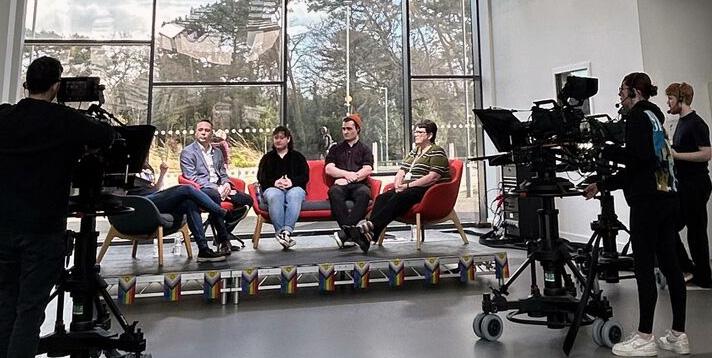
Our six Liberation Networks at BU, all led by students, are a space for marginalised communities to gather, create communities and promote intersectionality.
These include the Black Students Network, the LGBTQ+ Network, the Asian, Arab & Ethnic Minorities Network, the Disabilities, Accessibility and Neurodiverse Network, the Trans, Non-Binary, Intersex and Gender Identity Network, and the Women’s Network.
The Liberation Networks are open to all BU students, providing a place for meeting like-minded people and support with campaigning for change.
Inclusivity is a core value that underpins our institutional strategy. Our commitment to meaningful change has been recognised externally, with BU ranked No. 2 in the inaugural Higher Education (HE) Honordex report evaluating Equality, Diversity, and Inclusion (EDI) practices across UK universities.
This year BU signed up to Hidden Disabilities sunflower scheme; hosted a vibrant ongoing calendar of EDI events, attracting over 400 attendees; introduced new bitesize EDI learning to engage a wider audience; continued investment in diverse leadership talent pipelines through the Inclusive Coaching pilot and Aurora cohort; supported over 3,000 student visits to our Mental Health Retreat; and strengthened inclusive leadership by embedding psychological safety into our Change Leadership workshops, attended by 90% of managers.
We are proud to be signatories of several national equality schemes, including the Mindful Employer Charter; University Mental Health Charter; Athena SWAN; the Race Equality Charter; achieving Disability Confident Manager status; being a Stonewall Diversity Champion; and members of the Business Disability Forum.

Diversity monitoring
14.06% of staff from an ethnic background
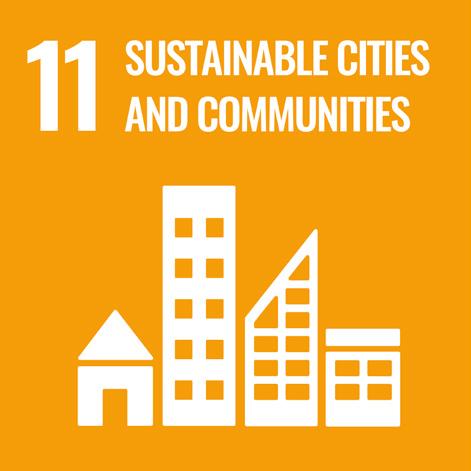
Bournemouth University helps to protect and preserve a sustainable environment
Bournemouth University helps to prepare for and recover from crisis
Bournemouth University is helping creative and cultural heritage to thrive
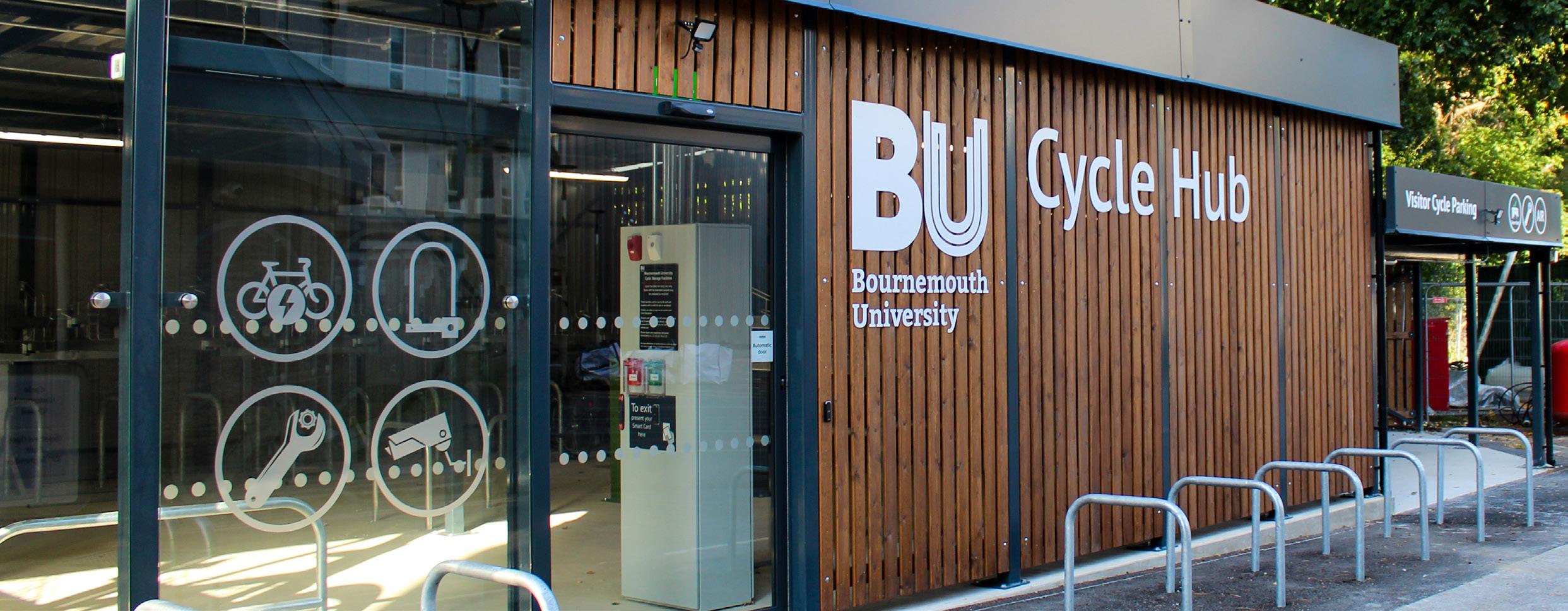
This multi-accredited course explores the environmental, social, and economic impacts of the visitor economy on destinations and communities.
Core units include The Visitor Economy, Sustainable Tourism Destinations, and Understanding the Tourist. Throughout the course, students have access to leading industry speakers, consultancy projects, live scenarios and exciting field trips to tourism hotspots. They also have the opportunity to study abroad with one of our many partner institutions across the world.
This contemporary course examines the practice, management and realisation of safer sporting environments and communities.
Taught by research-active academics who have strong links with both the sport industry, core units include Inclusive Practices in Sport, Mental Health in Sport, and a ‘real-life’ project to resolve a societal problem within a sport organisation.
The MSc Safe Sport course is deal for those looking to pursue career working for national sporting governing bodies, sports consultancy enterprises, schools and specialist sports colleges, community groups and charitable sporting organisations.
101-200 in the world
13th in the UK
65.6 Research score out of 100
75% programmes aligned to this UN Sustainable Development Goal
Led by Professor Lee Miles, our Disaster Management Centre continues its Driving African Capacity Building in Disaster Management (AFRICAB) project based in West Africa, which aims to meet the urgent needs of African disaster managers and stakeholders. This includes the ability to detect and understand deficiencies in their disaster management systems.
The project has produced numerous impacts. For example, the AFRICAB Report included 27 key recommendations for national policymakers, and has been highly utilised by stakeholders including Freetown City Council (FCC) in the development of various procedures and Freetown’s first ever Climate Action Strategy.
Building upon the co-operation of AFRICAB, the Evaluating Local Disaster Management in Sierra Leone (EVALDIS) provides an evaluation of the existing state of disaster management within provinces, districts, wards, and local communities, which helps to inform and shape the direction of the National Disaster Management Agency (NDMA). In 2024, the findings of EVALDIS were incorporated into a national disaster management constitution across Sierra Leone, encompassing over 8.4 million people.
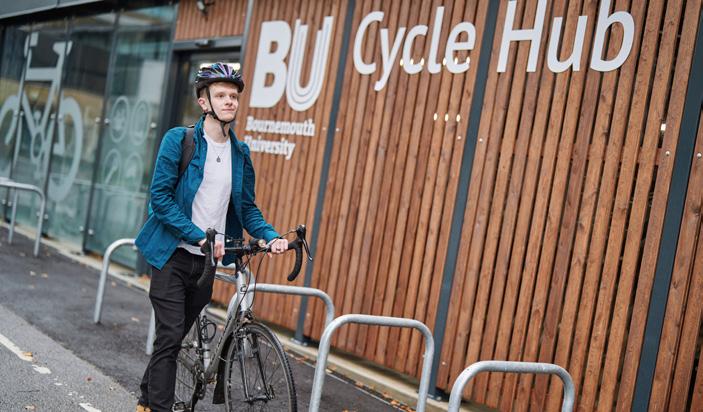
To support our students, staff and the local community to make more sustainable travel choices, we have built a new Cycle Hub behind Dorset House on our Talbot Campus.
This new compound has space for 194 bikes, including space for adapted bikes, cargo bikes, and charging stations for e-bikes. There are tools and pumps available for everyone to use, a covered visitor cycle storage area, and CCTV for improved security. There is even a green roof on top of the compound to support nature.
You can watch a short video about our new Cycle Hub here
BU have also supported the NDMA in constructing three Service Delivery Charter signposts and one billboard. This infrastructure will serve as a vital communication tool, ensuring that citizens understand NDMA’s role in disaster preparedness, emergency response, and recovery efforts.
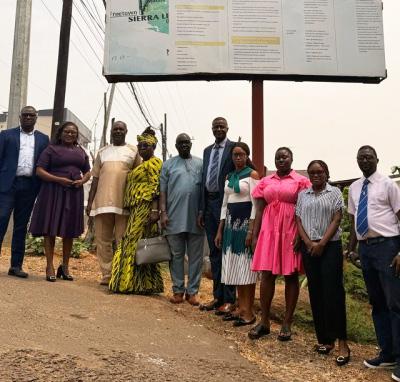
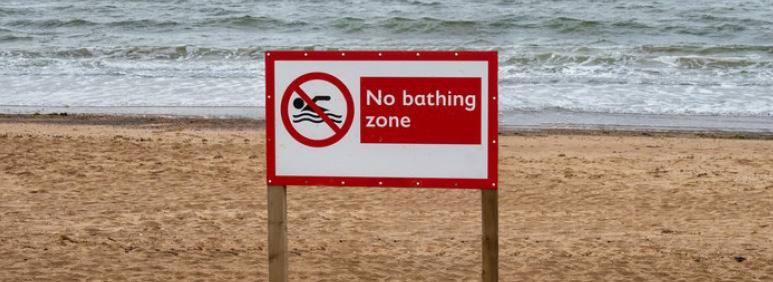
As a coastal area, the sea is a great source of joy for our community. However, drowning remains a major public health issue; especially for males who are 80% more likely to drown than females globally.
To address this, BU researchers monitored young men’s real-time reactions to watching water safety campaigns to understand which types of messages encouraged them to make safer decisions around the water. They found that the human brain does not process water warning signs that depict the ocean as dangerous, because it conflicts with the sense of enjoyment people feel when they are by the water.
These findings are being used by the Royal Society for Prevention of Accidents (RoSPA) and the RNLI to help frame messages for future safety campaigns.
To encourage active travel at BU, we host a series of events including the Be Safe/ Be Seen campaign and the promotion of the six reasons to cycle campaign. For Climate Action Month we hosted our annual BU Big Bike Fair, attended by Cycle Solutions, Synchgo, the Bournemouth Central Neighbourhood Policing Team, and our Bike Doctor, who ran a free bike maintenance workshop for our staff to learn basic skills for fixing their bike.
We also continue to offer free Bike Doctor Sessions fortnightly to provide bike services to students and staff. Between August 2023 and July 2024, the Bike Doctor serviced 208 bikes. For the same period, 25 staff members used our Cycle to Work scheme, purchasing equipment with a combined value of £42,039.
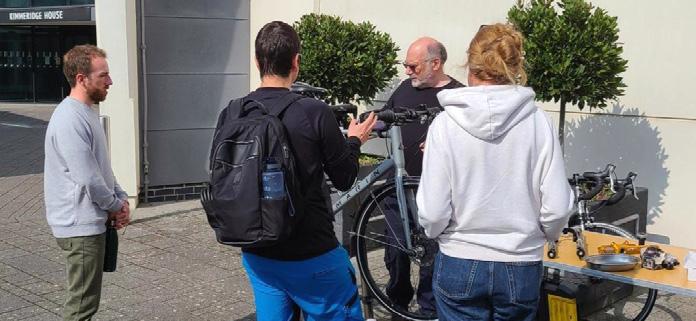
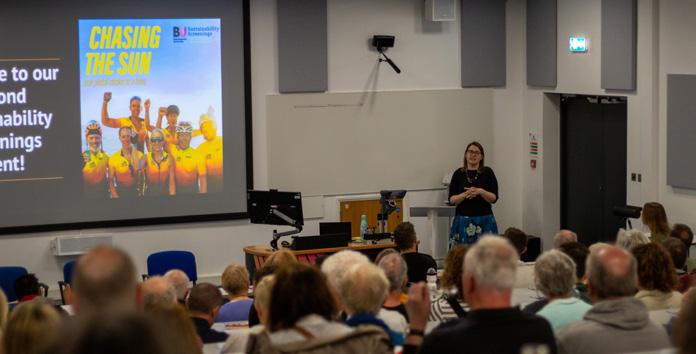
As part of our Sustainability Screenings series, we hosted a public film screening of Chasing the Sun, a film about the power of the bicycle to improve public health, build community, and tackle climate change.
The film was followed by an engaging panel discussion with the film Producer; Phil Webb, Travel Planning Officer at BCP Council; Amanda Shorey, BU Professor of Orthopaedics; Tom Wainwright, and BU Lecturer in Law; Joesph McMullen.
The conversation focussed on the impact of poor air quality, the health benefits of cycling particularly for older people, and how we can come together as a community to campaign for better cycling infrastructure in the local area.
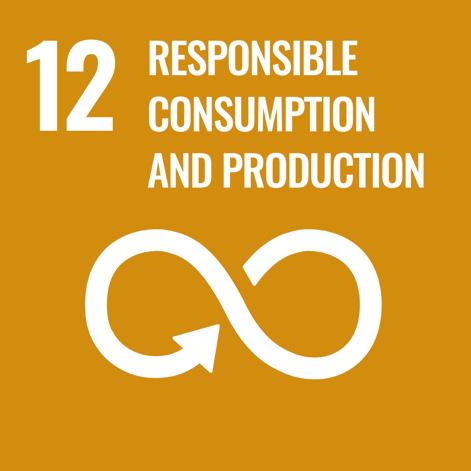
Bournemouth University helps to protect and preserve a sustainable environment
Bournemouth University helps to prepare for and recover from crisis
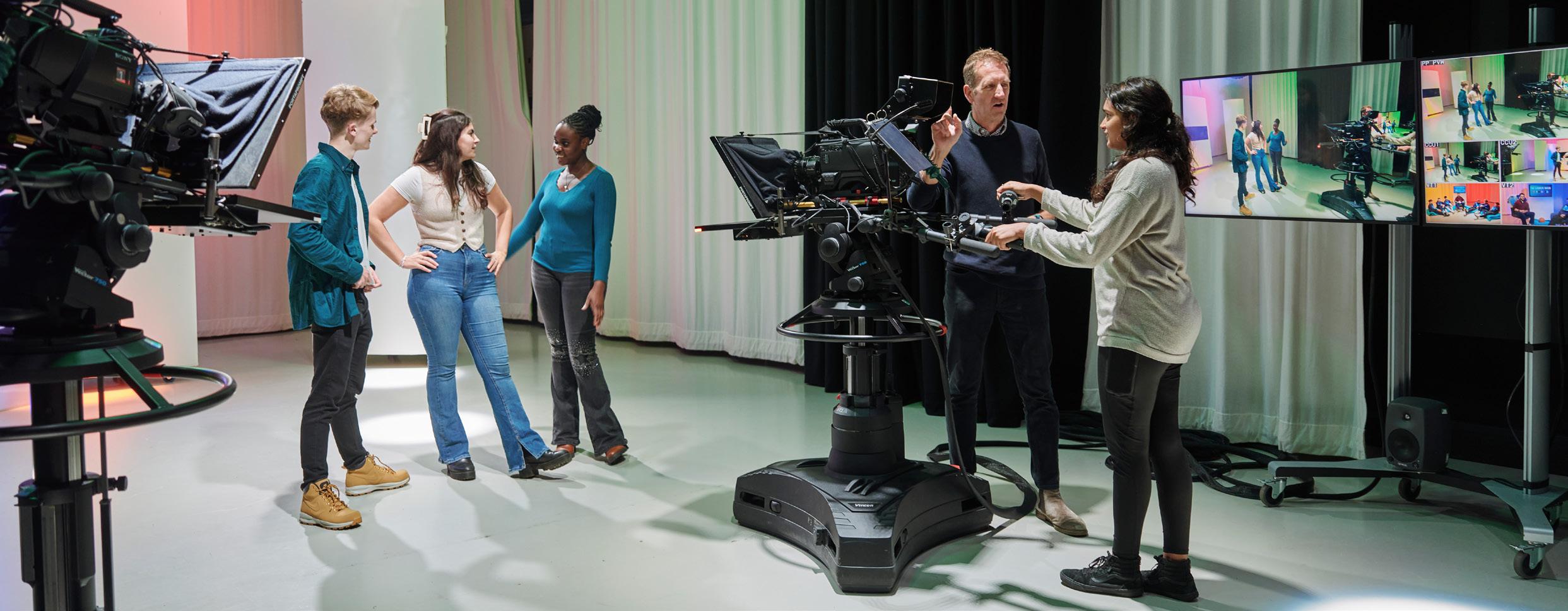
BA (Hons) Marketing Communications with Advertising
Through working on real-world industry briefs, this course provides students with the knowledge and strategies needed to become proficient in advertising strategy, with the ability to attract, develop, and retain customers within a competitive environment.
In the first year of study, students have the opportunity to work with BU’s Sustainability Team to produce an Integrated Marketing Campaign to progress a Sustainable Development Goal of their choice at BU.
BAFTA albert
education partnership
albert is the leading screen industry organisation for environmental sustainability. BU partnered with BAFTA Albert in 2019 to help our students from the Department of Media Production to develop the skills needed to shape the future of sustainable practices in the media industry.
BU Film graduate, Horace Tang said: “With this certificate, it shows we are equipped to work in a sustainable way, a valuable mission led by albert. It is my responsibility to bring this knowledge to the crews I work with, encouraging sustainable practices whilst on set.”

11th in the world 1st in the UK
91.3 Research score out of 100
82% programmes aligned to this UN Sustainable Development Goal
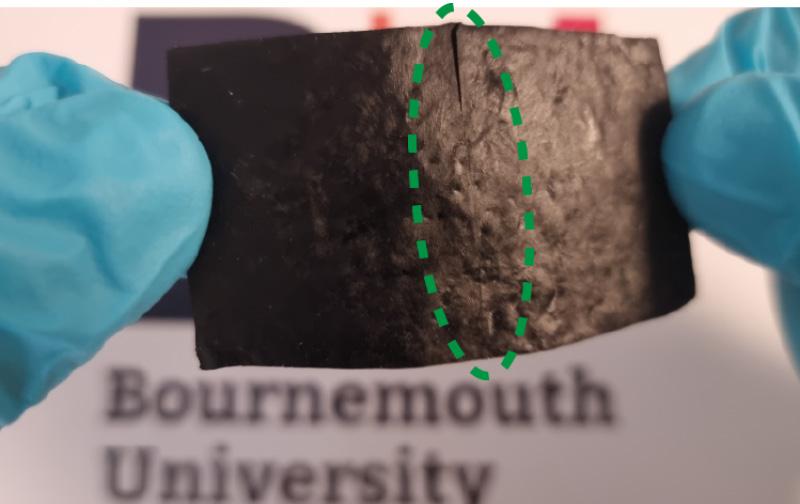
BU researchers have made advances in the development of plastic that can fix itself after it has been cracked or broken into pieces. They found that mixing a material called MXene with various other chemicals creates a healing agent with glue-like properties that can be added to plastics. When the plastic breaks, this agent is exposed to the humidity in the atmosphere, at which point it is activated and bonds the broken plastic back together.
Dr Amor Abdelkader, Associate Professor in Advanced Materials said: “We are following the same process as Mother Nature - when you cut your finger, the blood will initially solidify to cover the crack until the skin tissue seals it, and that is what we are doing with our plastics.”
Wishcycling – ‘eco-friendly’ labels confuse shoppers
The term wishcycling refers to the act of throwing something in the recycling bin, in the hope that it can be recycled, but without knowing for sure.
Postdoctoral Research Fellow at BU, Anastasia Vayona, has produced research indicating that misleading environmental claims by companies, or ‘greenwashing’, are making recycling more confusing and less effective.
The study also revealed that environmentally conscious consumers can be most susceptible to greenwashing, given their strong environmental values.
Vayona said: “We need to be both environmentally conscious and critically aware consumers. But it’s important to remember while our daily choices and actions matter, the key to real change lies in pushing for corporate and policy-level transformation of our packaging systems.”
At BU, we encourage our students to use our campuses as Living Labs and support them to campaign for what they believe in.
BSc Ecology & Wildlife Conservation student, Rupert Abbott, together with other students, created a small art display to raise awareness of the issues associated with disposable coffee cups, with the intention of surveying people after a few weeks of having this display up to identify any behaviour changes.
BSc Geography student Abi Wills-Hart and her peers started an Instagram page (Getwasted._) encouraging people to reduce food waste as part of their assignment, featuring a very successful

Student project to reduce disposable cups.
video for a zero waste cauliflower recipe. They gained 123 followers and reached over 1,000 accounts during the time allocated to them.
The Big Give is an annual sustainability campaign run by the SUBU Student Opportunities Team, which encourages students to clear out their houses and halls accommodation before they leave Bournemouth for the summer. Large purple bins are positioned in strategic locations for students to donate their unwanted items.
In 2024, the Big Give’s ninth year, 4045 bags were donated by BU students (up from 2530 last year), which will raise over £60,375 for the British Heart Foundation to continue their work in beating heart disease. Prama UK collected 720 bags (up from 500 last year) raising £10,780, which will support Prama to continue helping older people living in the local community.
Unwanted, unopened non-perishable food items were donated to the SUBU Community Kitchen an on-campus foodbank especially for students.
At BU we focus on waste prevention, rather than just increasing recycling rate. Why? Because recycling rate doesn’t tell the full story. Our goal is to produce less than 20kg of waste per full-time equivalent (FTE) per year.
In 2023/24, we achieved 14.6kg per FTE/year. Our total waste produced (on campus, in our Student Village, and from construction activities) was 519 tonnes and we recycled 78% of it (a reduction from 563 tonnes in 2022-23). To break this down, our waste produced on our campuses and in our residential accommodation the Student Village was 332 tonnes, and we recycled 60% of it. For construction activities, we produced 187 tonnes of waste and recycled 96% of it.
To reduce the use of disposable coffee cups on campus, the BU Sustainability Team and our catering provider Chartwells have collaborated to design our Cup Exchange Scheme. This scheme enables
users to purchase a drink in a reusable cup and then hand it back in exchange for a token. When the user next wants to buy a drink, they can exchange their token for another reusable cup.
To increase uptake, we implemented our first ‘No Disposable Cups Week’, where catering staff refuse the sale of disposable cups where possible. When we ran this in June 2024, disposable cup sales reduced to 12% (compared to 88% in June 2023).
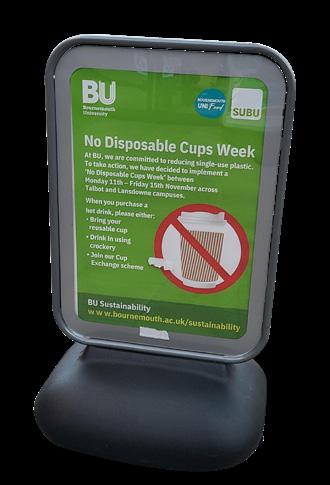
This year, our catering provider Chartwells has introduced a new Carbon Labelling system to help our community to make more informed choices about the food they consume. The carbon footprint values are calculated by Foodsteps using publicly available data and information from industry and academia. A-E ratings and traffic light colours to indicate the carbon intensity of a food item, which aligns with the global carbon budget set by the EATLancet Commission.
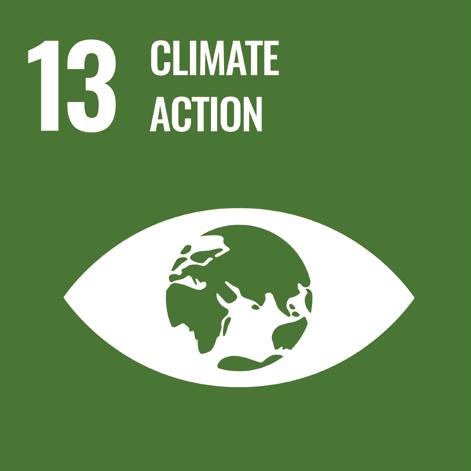
Bournemouth University helps to protect and preserve a sustainable environment
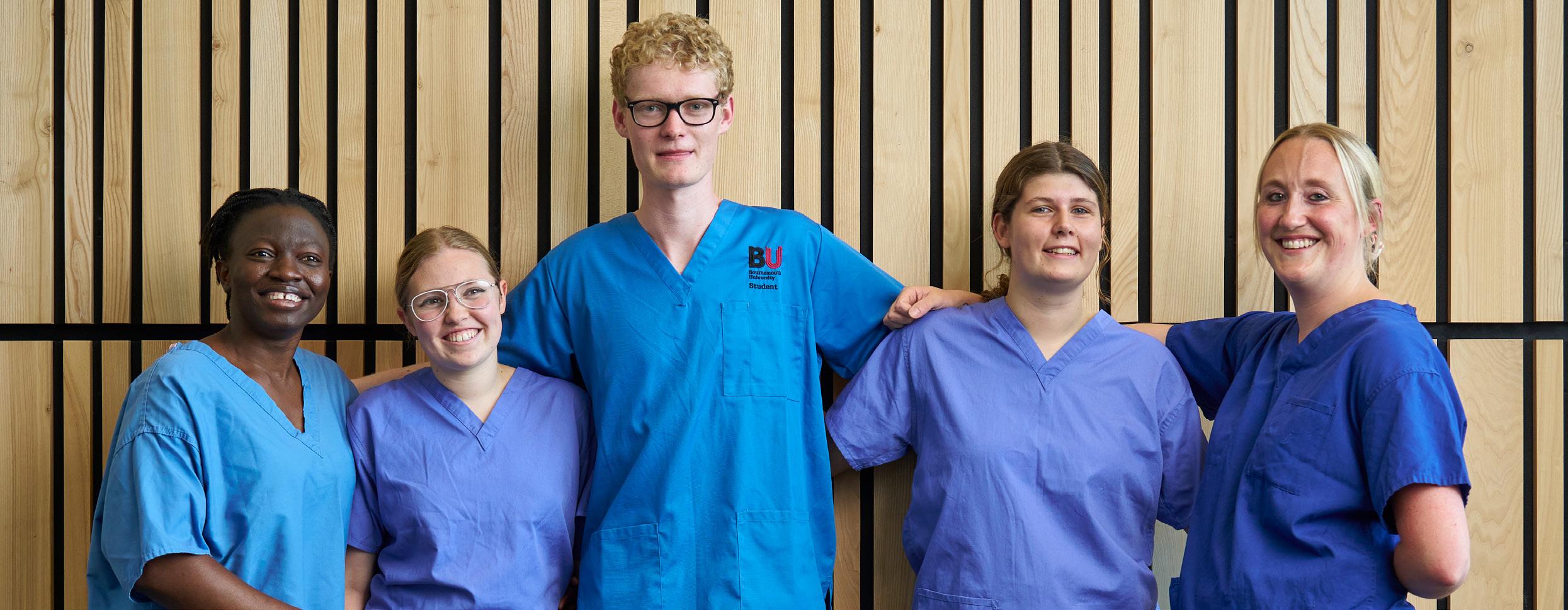
Within our Climate and Ecological Crisis Action Plan (CECAP) we have committed to embedding climate education within every level of every programme across BU in order to provide our students with the skills, knowledge and values to contribute to and lead the transition to a low carbon society.
As of December 2024, 69% of our programmes included the climate and ecological crisis somewhere within their content. To reach our target of 100%, whereby each student is exposed to climate action at each level of their study, the Sustainability Academic Network (SAN) come together regularly to share best practice around the integration of climate action into teaching.
The SAN also have access to a Climate Action area on our Brightspace VLE, which provides a guide for academics for
achieving this goal, and demonstrates how SDG 13 is inter-related with the other 16 SDGs.
Accredited by the Institute of Environmental Management and Assessment (IEMA), this unique distance learning course provides the scientific foundations of climate change and other sustainability topics, and an insight into the challenges of transitioning towards a green economy.
MSc Green Economy students have the opportunity to explore realworld environmental issues, develop their understanding of sustainability frameworks and tools, and engage with fellow students from across the world, providing valuable insights and different global perspectives.
THE Impact Rankings 2025 result
44th in the world
8th in the UK
76.1 Research score out of 100
72% programmes aligned to this UN Sustainable Development Goal
As the world moves away from fossil fuels, the ability to capture and store energy efficiency poses a significant challenge.
The NanoCorr, Energy & Modelling (NCEM) Research Group led by Professor Zulfiqar Khan has made huge advancements in the field of thermal energy storage. Their research focusses on the conductivity, stability, and compatibility of the materials used for energy storage to make them more efficient, stable, and commercially viable. Their findings have been featured on the International Atomic Energy Agency (IAEA) website - an influential global body under the United Nations that work to promote the peaceful use of nuclear and clean energy technologies. This research exemplifies how innovative materials science and engineering can contribute meaningfully towards battling climate change.
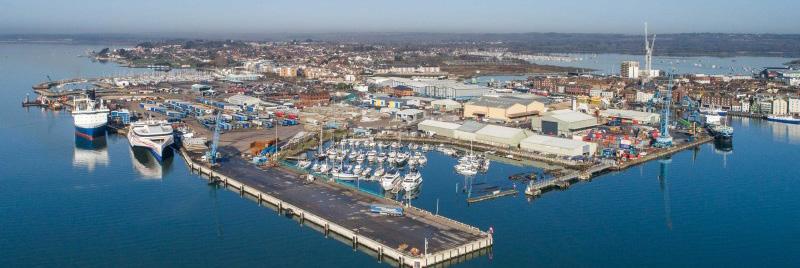
for the Port of Poole
BU academics from the Business School have contributed research and strategic expertise towards the development of a Decarbonisation Plan for the Port of Poole.
This plan sets out a roadmap to achieving net zero by 2050, focusing on innovative technologies, sustainable practices, and collaboration with key stakeholders.
Baseline emissions calculations revealed that marine vessel emissions contributed to approximately 70% of total emissions, followed by buildings, road traffic, and port operations, therefore key actions include the adoption of alternative fuels, electrification of port operations, and improvements in energy efficiency.
Dr Mili Shrivastava, Deputy Head of the Centre for Sustainable Business Transformations at BU, said: “This project at the Port of Poole showcases the power of collaboration and a shared commitment to decarbonisation.”
BU hosted the Dorset COP
Dorset’s own community-led conference of the parties (COP), brought together local MPs, councillors, businesses, community groups and charities, students, and residents from across the county to work on a local action plan to tackle the climate and ecological crises at a regional level. Read more about the Dorset COP
Vice-Chancellor, Professor Alison Honour, who opened the event, said: “Tackling big issues like the climate and ecological crises can at times feel beyond our abilities to change, but by bringing it down to a local level and understanding what we can do as a community is empowering and impactful.”

BU has been accredited as a Bronze Carbon Literate Educator, highlighting our commitment to embedding climate education and action into our institution. To date, we have trained 66 members of staff and more than 100 students in house and paid for their certification as Carbon Literate.
This year, we rolled out the new Carbon Literacy for Healthcare toolkit, designed specifically for staff and students entering the healthcare sector, to our BSc Operating Department Practice students. This course explores the critical link between climate change and healthcare, and how staff can contribute to shaping a low carbon NHS that delivers exceptional care while safeguarding the health of future generations.
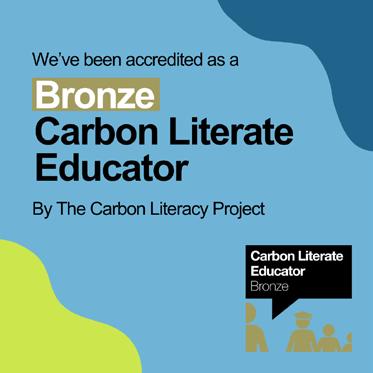
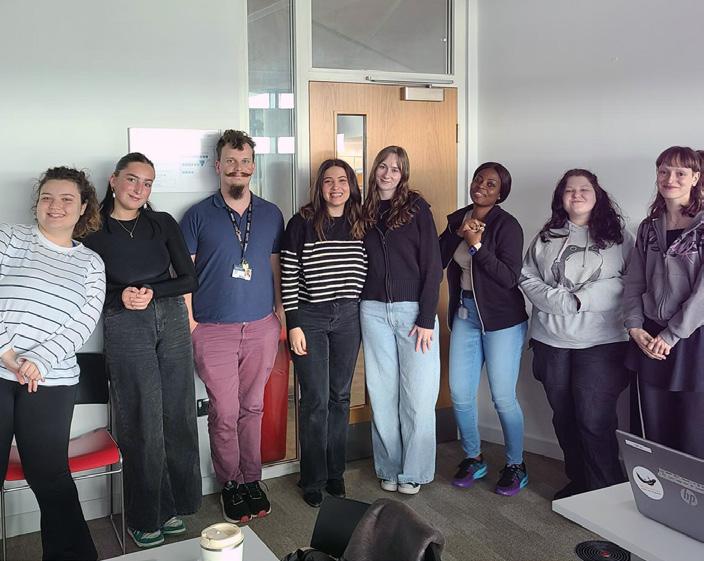
Our BU Student Sustainability Council act as sustainability champions at BU and provide a consistent stream of feedback through our termly Climate Assemblies on how we can better manage and improve our approach to sustainability at BU. Members have the opportunity to use their voice to create positive change on campus, develop green skills, and enhance their employability.
If you are a BU student and interested in joining, please email sustainability@ bournemouth.ac.uk
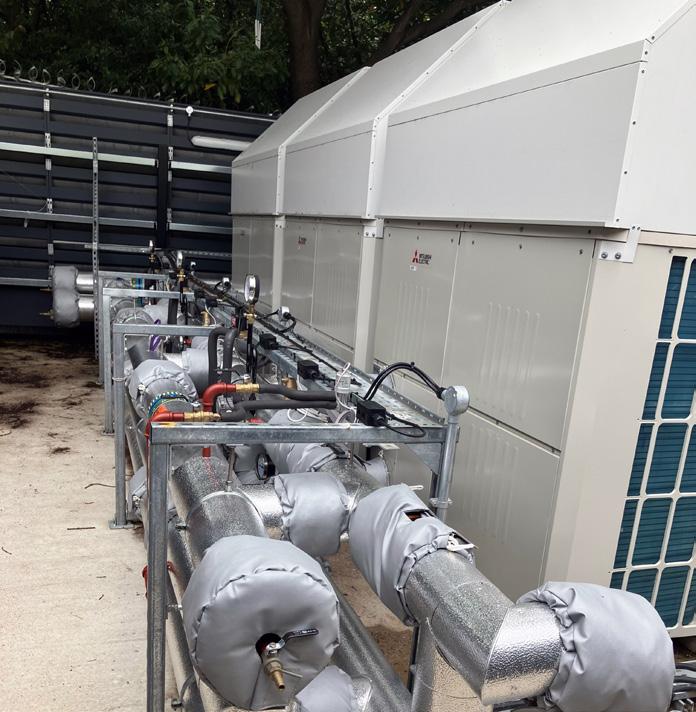
In our Climate & Ecological Crisis Action Plan (CECAP), we have pledged to achieve a 50% emissions reduction across all three scopes by the 2030/31 academic year. So far, we have reduced emissions by 29% and this is part of our journey to Net Zero emissions. You can read more in our latest CECAP Annual Report.
Our carbon emissions reduction target is delivered by our staff and students through our Environment and Energy Management System which is certified to both ISO14001 and ISO50001.
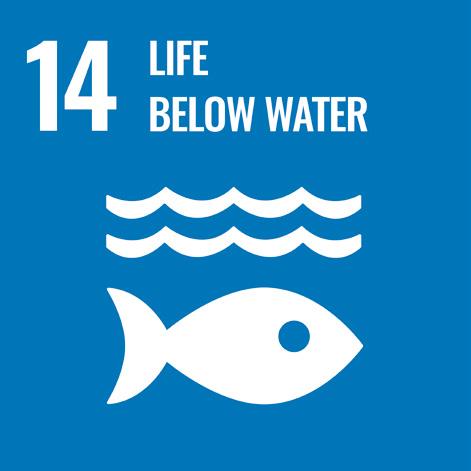
Conserve and sustainably use the oceans, seas and marine resources for sustainable development
Bournemouth University helps to protect and preserve a sustainable environment
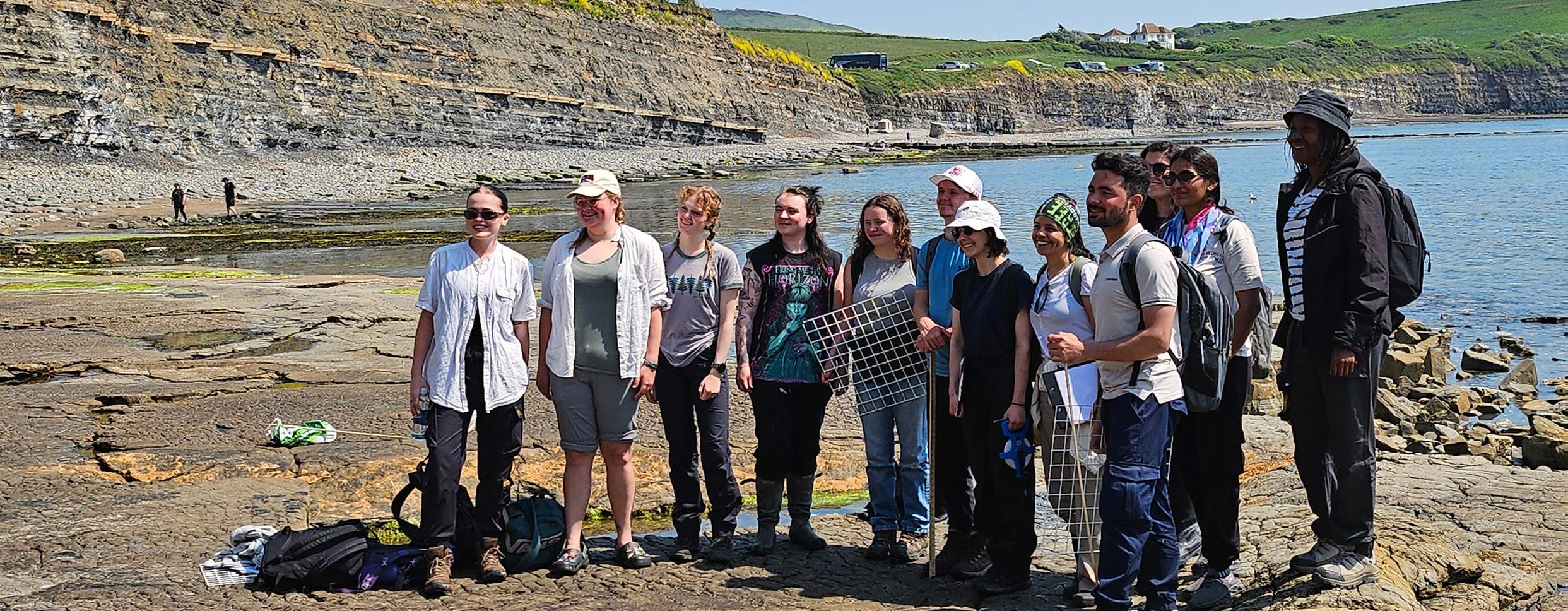
Education
Marine Conservation teaching
This is a popular final year unit on several degree programmes including BSc Marine Ecology & Conservation, BSc Biological Sciences, and BSc Ecology & Wildlife Conservation.
Drawing on biology and ecology, but also on law, policy, geography and social science, this unit focusses on key issues facing the marine environment at the present time, including marine protected areas, fishing, offshore energy and blue carbon; both in the UK and in locations around the world.
Students not only learn about different environments and approaches to conserving them, but also that conservation is actively evolving and there may be many different solutions to a problem.
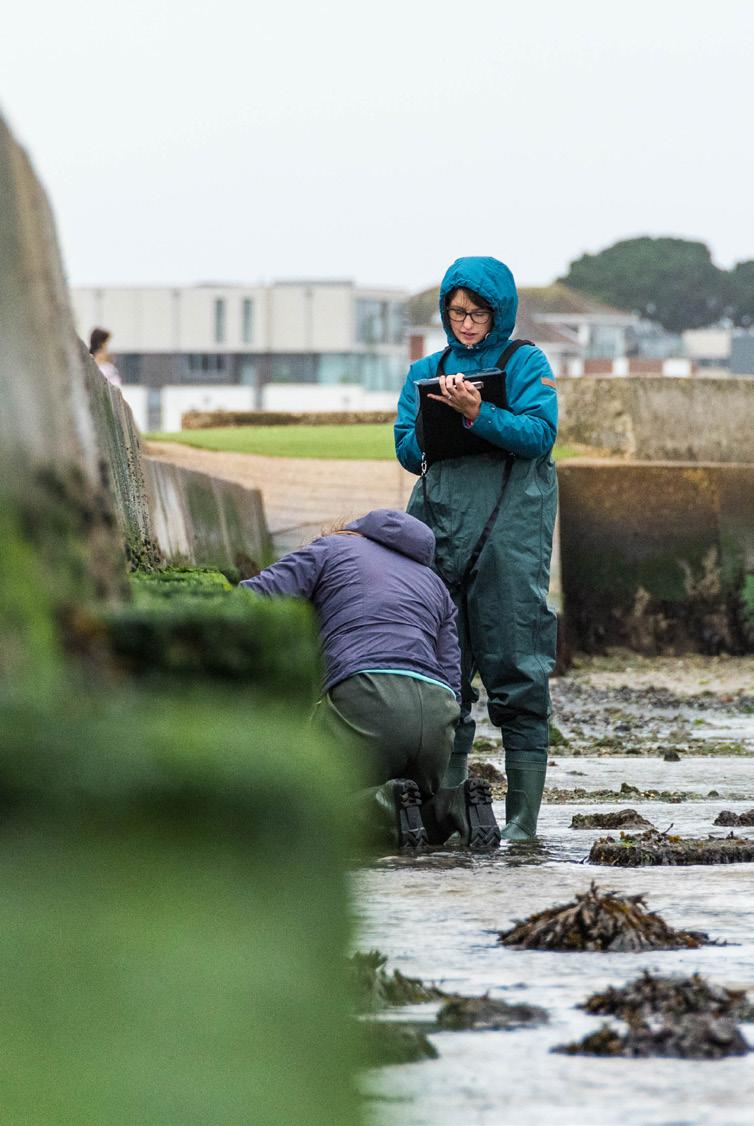
THE Impact Rankings 2025 result
101-200 in the world 12th in the UK
64.3 Research score out of 100
42% programmes aligned to this UN Sustainable Development Goal
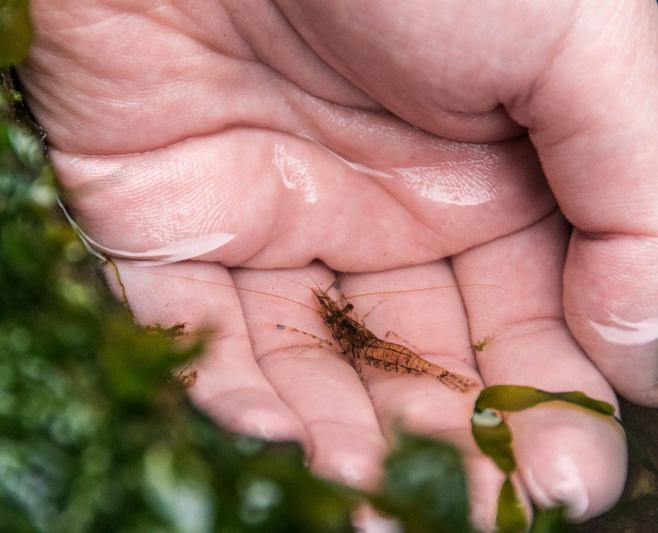
Coastal infrastructure such as seawalls are likely to become more common as storms and sea-level rise begin to increase due to climate change. Such infrastructure is poor habitat for marine species.
The MARINEFF project, supported by the European Union, aims to develop new innovative infrastructures to protect and improve coastal ecosystems. Recent data from artificial rockpools based in Sandbanks and the Isle of Wight revealed that areas of rock which contained artificial rockpools were up to four times more diverse than areas without them, containing more seaweed, grazers and more mobile species including fish and crabs. They also provide easy access to nature for people wishing to explore the pools.
Professor Rick Stafford from the Department of Life & Environmental Sciences and Co-investigator on MARINEFF said: “From our work on artificial structures and marine naturebased solutions, we have been working with industry and helping to advise government agencies on future policy directions, such as in the development of Marine Net Gain.”

Dr Luciana Esteves from the Department of Life & Environmental Sciences was part of a team of coastal scientists, educators, practitioners and artists who worked on the writing of the video series Coasts for Kids (C4K). C4K explains coastal processes, issues (such as sea level rise) and management in short videos narrated by 6-8-year-old children, using animation and language accessible to primary school children.
C4K was awarded first place in the Climate Creatives Challenge, a biannual global initiative that promotes creative and innovative climate communication, including the positive actions that can be taken to mitigate and adapt to change.
You can watch the series trailer here.
BU microbial ecologist Professor Genoveva Esteban joined forces with Dr George McGavin, one of the UK’s leading authorities on the natural world and acclaimed TV and radio presenter, to host Dipping into Pond Life - an engaging session where they investigated the captivating world of pond life.
This event was held at the Dorset Wildlife Trust’s Kingcombe Visitor Centre as part of the Dorchester Science Festival, and was open to all members of the public including young children.
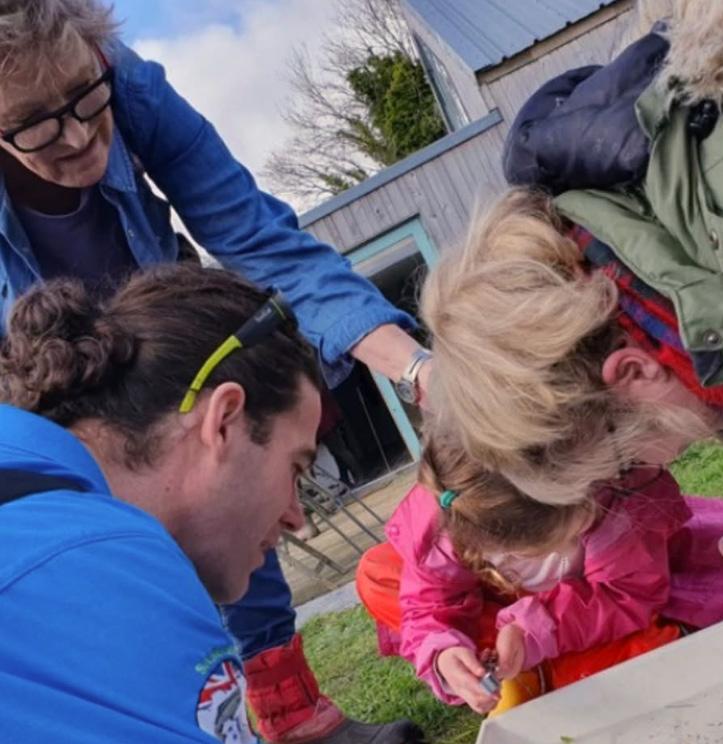
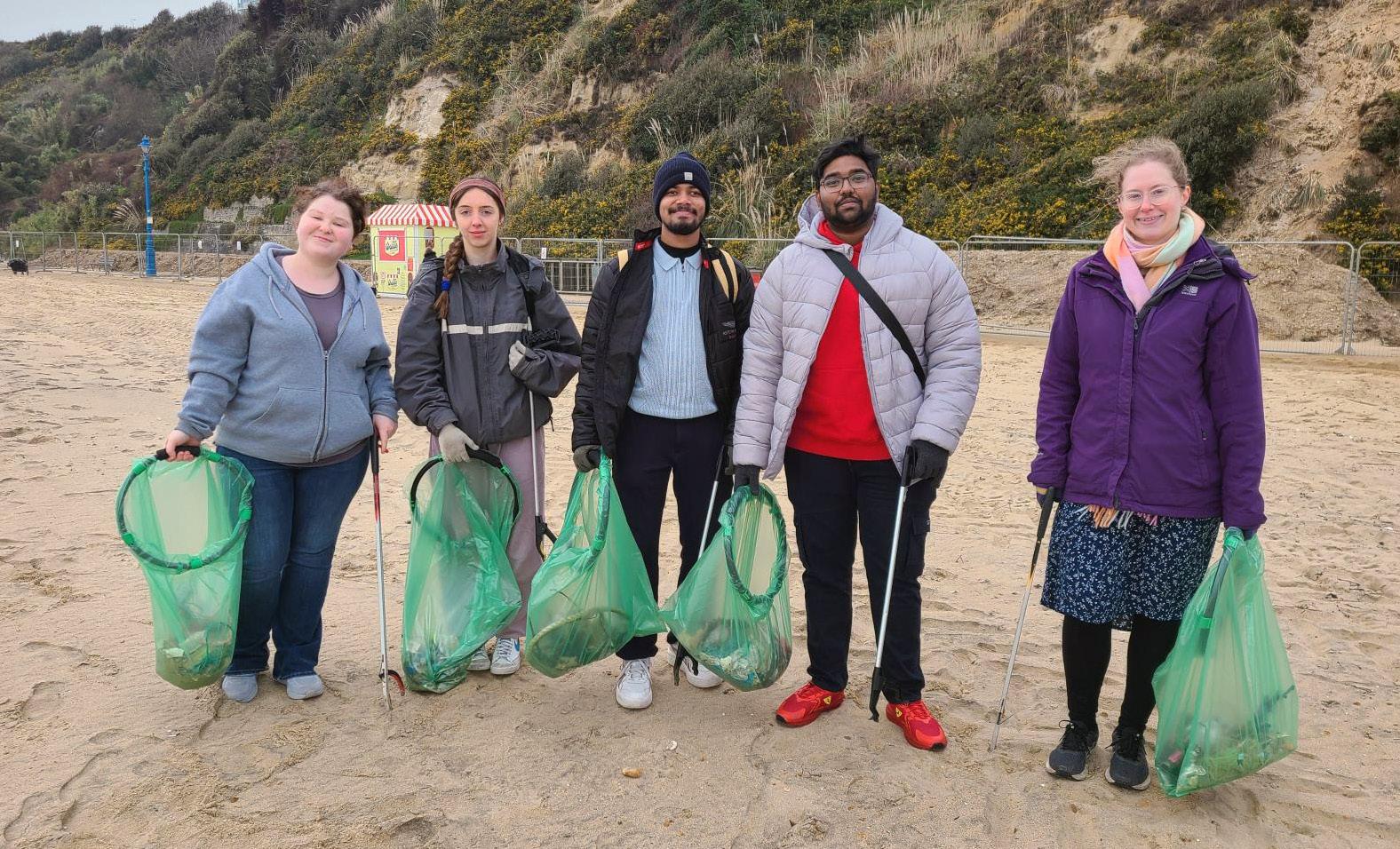
The Community Wardens support students with settling into living in the community. The Community Warden Scheme is run by SUBU, BU and AUB and supported by Bournemouth Borough Council. The Community Wardens also run regular beach cleans throughout the year to give students the opportunity to de-stress from exams and contribute to keeping our beaches clean.
This year, BSc Psychology student and member of the Student Sustainability Council, Faith Murray, co-ordinated a beach clean as part of National Student Volunteering Week. The team of students managed to remove seven bags of rubbish and microplastics from Bournemouth beach.
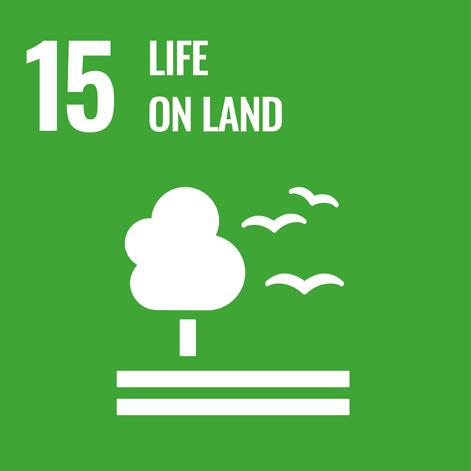
Bournemouth University helps people live better, for longer
Protect, restore and promote sustainable use of terrestrial ecosystems, sustainably manage forests, combat desertification, halt and reverse land degradation, and halt biodiversity loss
Bournemouth University helps to protect and preserve a sustainable environment
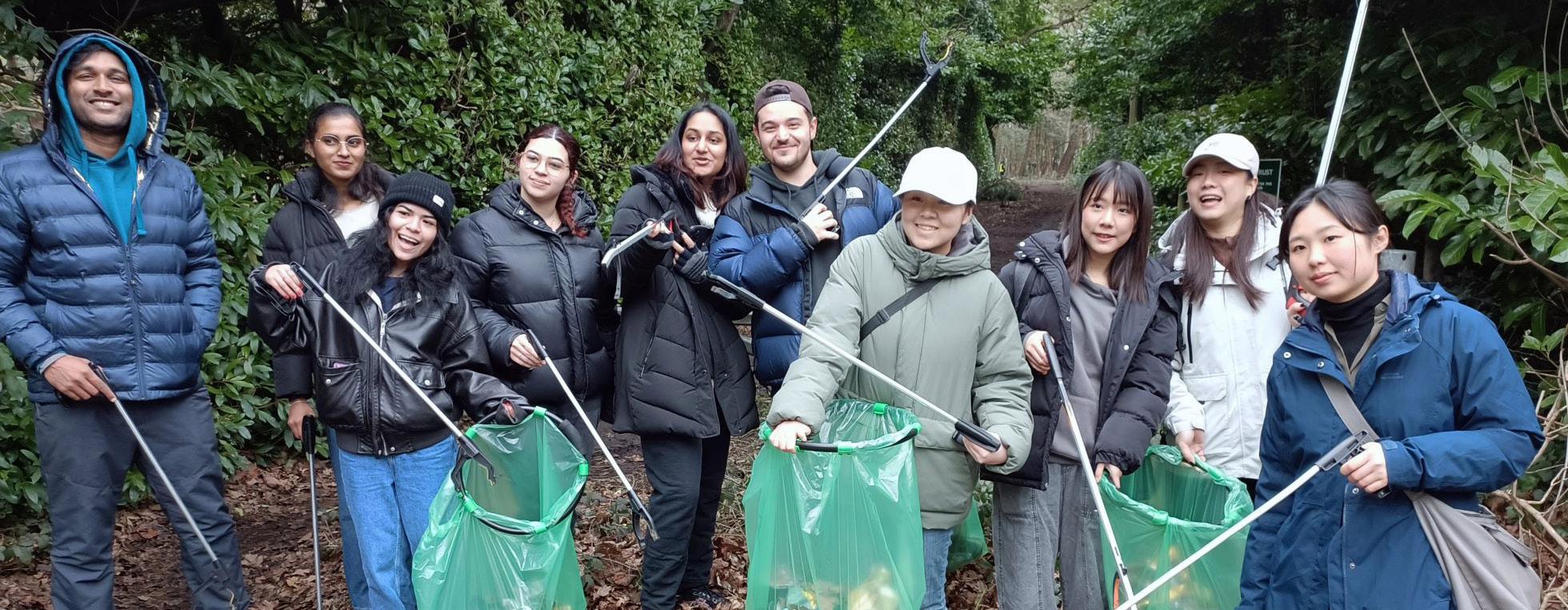
The MSc Biodiversity Conservation course enables students to develop their knowledge of ecology, geography, social science, psychology, technology, and conservation science, to develop their fieldwork skills, and to take part in active conservation research in the local area.
Units include Frontiers in Biodiversity, Field Ecology Skills, Biodiversity & Ecosystem Services, International Law of the Environment, and Behavioural Ecology and Conservation, among others.
Upon completing the course, students have both the knowledge and the skills to make a difference to biodiversity conservation, and will be prepared to undertake roles such as ecological consultant, environmental consultant, or environmental conservation manager.
There’s been a huge surge in demand for archaeologists in the UK following a sharp rise in infrastructure projects.
This course combines academic study with practical experience, covering key concepts and themes of archaeology and social anthropology, landscape surveying, remote sensing using GIS, excavation and recording.
Students also have the opportunity to attend BU’s Field School, a large scale real site excavation where students have previously discovered significant finds that have changed the way we view the past, and to participate in BU’s renowned Durotriges Big Dig
THE Impact Rankings 2025 result
59th in the world 13th in the UK
82.6 Research score out of 100
51% programmes aligned to this UN Sustainable Development Goal
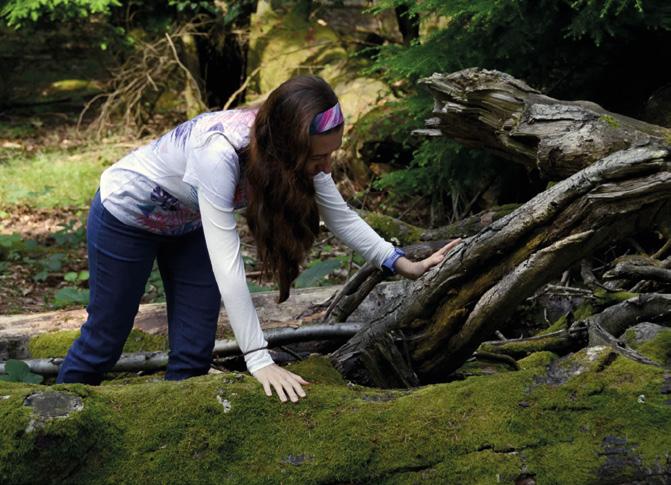
Dr Elena Cantarello, Principal Academic in Sustainability Science, is part of a European-wide project, RESONATE, which is investigating how forests across the continent are responding to changes in their environment. This work is focused on the New Forest National Park –a designated site of special scientific interest in the South of England which extends over 140,000 acres.
The latest piece of research under this project identified a set of actions that forest managers and policy makers should adopt to enhance the resilience of European forest systems. These include building synergies between the management of carbon stocks and forest goods with conservation, reducing the impact of climate change driven disturbances, promoting landscape restoration under a nature-based solutions perspective and diversifying ecosystem services.
Academic staff from the Faculty of Science & Technology have collaborated with Livability Millie College to pilot a new, innovative 2.4km nature trail, complete with nine interactive hubs, which aims to transform traditional nature trails into fun, educational adventures that capture visitors of all ages.
AWE integrates QR codes along a wildlife trail that unlock multimedia content bringing the story of local flora and fauna to life. Those partaking have instant access to videos, audio recordings, and detailed information about the unseen wildlife around them.
Masters by Research (MRes) student, Alys Fraser, is currently conducting research in Costa Rica, focusing on the relationships between squirrel monkeys and humans and how this can impact conservation strategies.
Alys has been surveying local residents and following the monkeys around the jungle to see where they go and what they are doing.
Alys said: “I am thoroughly enjoying following the monkeys and getting to experience a new culture while studying.”

We continue to take forward actions from our 2022 ecological surveys, carried out by a local contractor across our three main campuses. These informed our Biodiversity Action Plan, which guides changes in land management to better support nature.
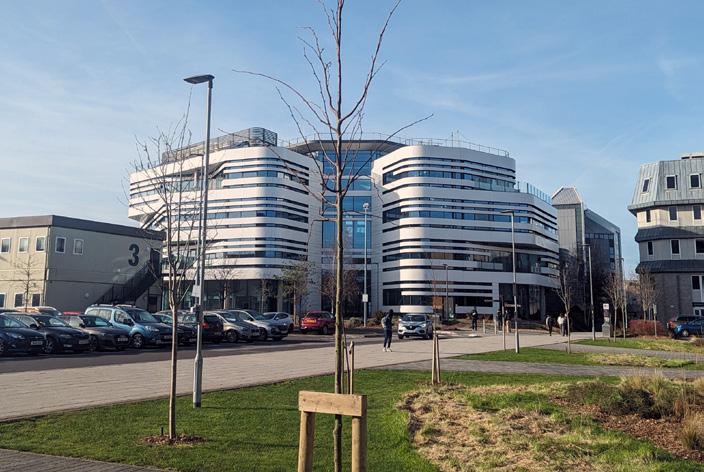
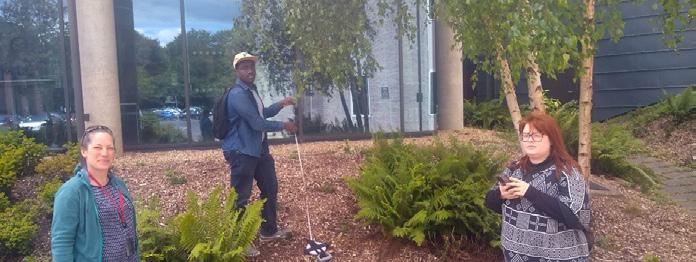
This year, two students studying BSc Geography and BSc Environmental Science started surveying Talbot Campus to identify the number of and different species of trees, as part of their placement. The aim of this project was to begin to gather data to develop an interactive tree map for BU.
This project hopes to contribute tree data to TreeZilla, a citizen science project that encourages people to map, measure and monitor trees. The TreeZilla map displays where different tree species are located, and the ecosystem services they provide.
Measures include allowing more grassland to grow, creating insect habitats with log piles, and planting native hedgerows. This year, BU funded the planting of seven new trees on Talbot Campus, including species recommended in the surveys.
You can read more in our Biodiversity Policy
This year, BSc Biological Sciences students completed a living lab project to increase the abundance and diversity of birds on campus, by experimenting with different bird feeder locations and feeds. In early Spring, one of our students spotted a goldcrest on campus – one of the UK’s smallest bird species.
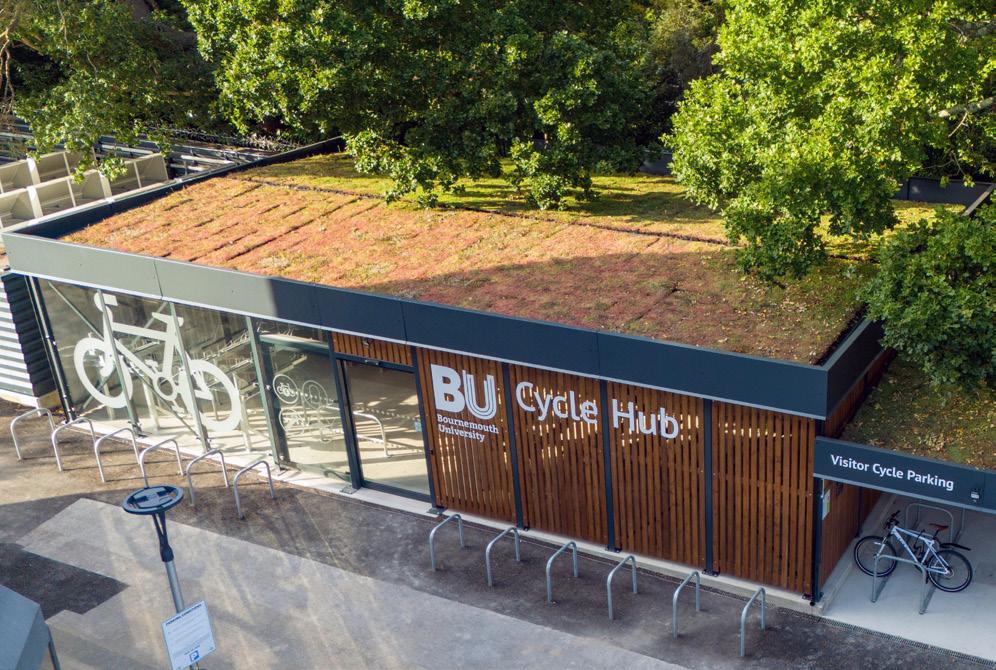
We are pleased to have been able to add a 12-species sedum roof onto our new cycle hub on Talbot Campus. Green roofs effectively provide additional space for nature and help to reduce the risk of flooding by increasing water absorption.

Promote peaceful and inclusive societies for sustainable development, provide access to justice for all and build effective, accountable and inclusive institutions at all levels
Bournemouth University helps to prepare for and recover from crisis
Bournemouth University challenges marginalisation, misinformation and under-representation
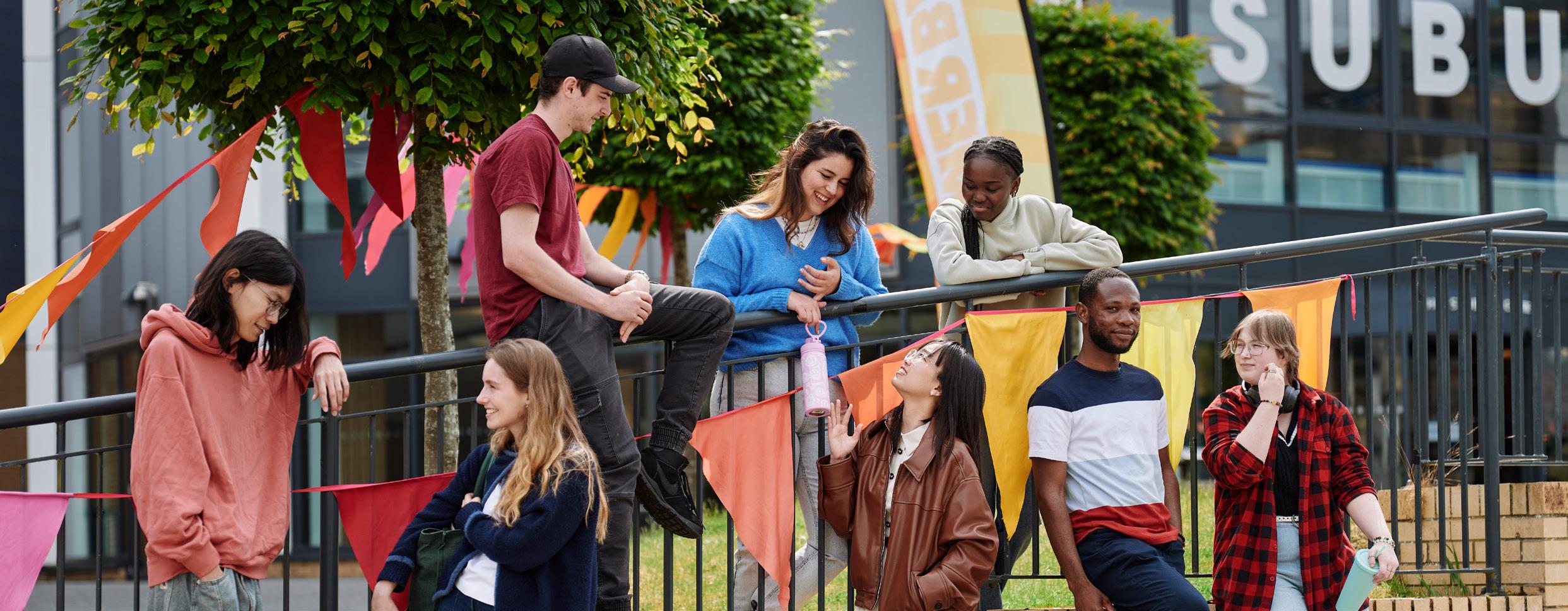
Education
Environmental Law & Social Justice
Environmental policy and law decisions have implications for the environment and the people that rely upon and reside within it.
The Environmental Law & Social Justice short course explores the legal and policy dynamics and the factors that influence environmental and social justice outcomes in environmental policy debates. It also identifies how social justice considerations can be incorporated more effectively into environmental policy.
This course enables students to explore global issues they care about themselves, and to evaluate the effectiveness of environmental law and social justice in the context of these issues.
Taught by leading experts with backgrounds working in the criminal justice system and police force, this course covers a variety of national and international criminological issues including policing, punishment, victimology, terrorism, human trafficking and organised crime.
Students can go on to study our MA Criminal & Criminal Justice course, which supports students to develop knowledge and understanding of criminological theory and criminal justice processes and outcomes, informed by current practice and research.
101-200 in the world
16th in the UK
72.8 Research score out of 100
65% programmes aligned to this UN Sustainable Development Goal
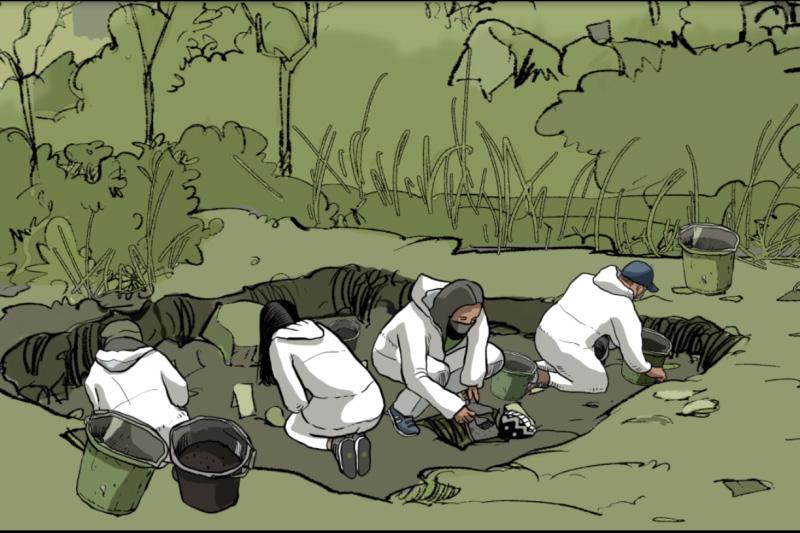
Mass graves exist across the world, containing essential evidence to the realisation of justice and accountability for victims, affected communities, and the international community. However, there are no global records for mass graves, nor is there a universal framework to govern mass graves.
In response, Professor Melanie Klinkner and Dr Emily Smith have produced MaGPIE – the world’s first global open-source mass graves digital map. This resource will serve as a form of memorialisation, especially in areas where political and ethnic tensions continue to run high, ensuring that the deaths of loved ones are recorded and remembered. MaGPIE has recently been used to map those buried in a forest near Izium in Ukraine following Russia’s full-scale invasion.
The team has also produced a protocol of international standards on how mass grave protection and investigation should be approached.

The research Centre for Seldom Heard Voices brings together academics from across different disciplines including social sciences and social work to engage with marginalised communities and to amplify often excluded or silenced voices.
They strive to produce research that contributes to child and adult social care practice, theoretical contributions to conflict resolution, and community engagement and empowerment in the UK and globally.

The SUBU Summit is made up of elected representatives from across the Students’ Union who discuss and debate student ideas, hold the full-time officers to account, and oversee the work of the Union. All students are invited to attend to support their peers or speak up on an issue that matters to them.
Previous SUBU Summit meetings have covered food diversity, improving the student experience at our Lansdowne Campus, and lecture timetabling policies.
If you are a BU student and you have an idea for how to make the Union or the university a better place for students, submit your idea here
This research centre exists to develop research at the intersection of conflict, emotion, and social justice, through collaboration between Humanities and Social Sciences, Politics and Law, Journalism and Media and Film departments.
The CESJ organises seminars with speakers from within and outside the university, covering a wide range of disciplines and topics including the study of conflict and its links to inequality in social-political, cultural, and domestic contexts.
You can watch the recording of a recent seminar, where Dr Gal Raz explores ethics of the ‘empathetic superpowers’ of Virtual Reality.
We are committed to ethical standards of business conduct and adopt a zero tolerance approach to bribery and corruption in all jurisdictions through our Anti-Bribery Policy and Procedures. Our Code of Practice on Freedom of Speech ensures we can explore academic and challenging topics in a safe environment.
Our Ethical Investment Policy has this year been updated to include banking. It now defines our standards for sustainable, responsible investments and highlights our work to encourage improvements in the sustainability of the banks we use. We acknowledge the challenges with the environmental sustainability of day-today banking and express our aim to move to greener banking products as they become available.
We produce a detailed financial statement annually along with a one-page breakdown of our income and expenditure to ensure transparency and accountability.
Our University Board oversees the strategic development of the university and ensures the effective use of resources and the general solvency of the institution. It comprises members from within higher education, industry and commerce as well as representatives of students and staff via both academic and professional services staff and the President of the Students’ Union.
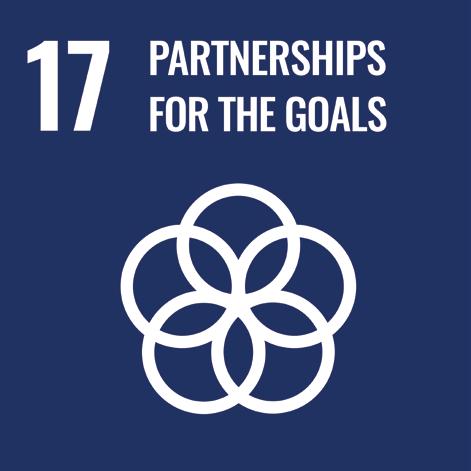
Bournemouth University challenges marginalisation, misinformation and under-representation
Bournemouth University is helping creative and cultural heritage to thrive
Bournemouth University is acting as a catalyst for growth, using our skills and expertise to boost skills and advance the region

At BU, we encourage our students to make the most of opportunities beyond their studies. Completing a placement is an excellent way for students to develop new skills, expand professional networks, and prepare for their future career. Every undergraduate student has the chance to take part in a placement, regardless of their course.
BU has established strong partnerships with a wide range of employers — from local small and medium-sized businesses to global companies such as IBM and Mercedes-Benz — offering students access to diverse and meaningful placement experiences.
Each course has a dedicated Placement Coordinator who guide students to find the right placement, with support from the CareersBU team. Learn more about BU placements here
This course is designed to empower our students to become strong, agile business leaders, ready for the challenges of global business.
MSc International Management students learn the fundamentals of leadership, how to manage people, marketing strategies, innovation management, and how to evaluate global markets. Additionally, students explore methods for managing international and inter-organisational relationships.

THE Impact Rankings 2025 result
101–200 in the world
23rd in the UK
89.9 Research score out of 100
66% programmes aligned to this UN Sustainable Development Goal
The need for collaboration for student progression
Universities and industry have different priorities and obligations; however, both have a vested interest in creating a healthy and relevant talent pipeline.
Dr Richard Wallis and Dr Christa van Raalte from the Faculty of Media and Communication have produced research that explores the barriers to effective partnership between the UK’s screen industries and its Higher Education Institutions (HEIs). They identified six myths that undermine progress in this area, including ‘the screen industries do not require a graduate workforce’, and go on to deconstruct them to demonstrate misunderstandings.
They concluded that meaningful partnerships between screen industries and HEIs require a recognition that while employers bring industry insight and expertise, universities are leaders in education – a field in which industry is both a contributor and a beneficiary.

At BU, we collaborate with partners around the world to deliver impact on global challenges through our education, research and practice. BU is currently involved with multiple partnerships in the UK including further education colleges Bournemouth and Poole College, Weymouth and Kingston Maurward College, and Wiltshire College. We also have a number of international partners which enable student exchanges, research collaborations, Erasmus+ activity and recognition arrangements. Our partnership with British University Vietnam (BUV) is an example of this.
In 2018, we signed the SDG Accord to recognise the role education has in, and commit to supporting, the delivery
BU collaborates locally with public and private sector organisations to drive our region towards net zero.
BU is part of the Dorset Public Sector Decarbonisation and Ecology Group which involves knowledge sharing across a range of topics including climate adaptation, and BU has contributed to the early stages of the Dorset Council Local Area Energy Plan. We are also part of BCP’s Climate Stakeholders group where we collaborate with other public and private organisations locally.
Several BU staff and academics support the local organisation Zero Carbon Dorset who have created a vision for what Dorset should look like in 2030 – Dorset in 2030
the UN SDGs, and is committed to the Principles for Responsible Management Education (PRME).
Our civic partnerships include working with Bournemouth, Christchurch and Poole (BCP) Council on planning and the environment, and our agreement with University Hospitals Dorset promoting research collaboration and placement support. BU also works in partnership for climate action with both BCP and Dorset Councils and other regional stakeholders from the public and private sectors.
Our Business School joins less than 5% of business schools globally to attain the Association to Advance Collegiate Schools of Business (AACSB) accreditation and is a full member of The European Foundation for Management Development.
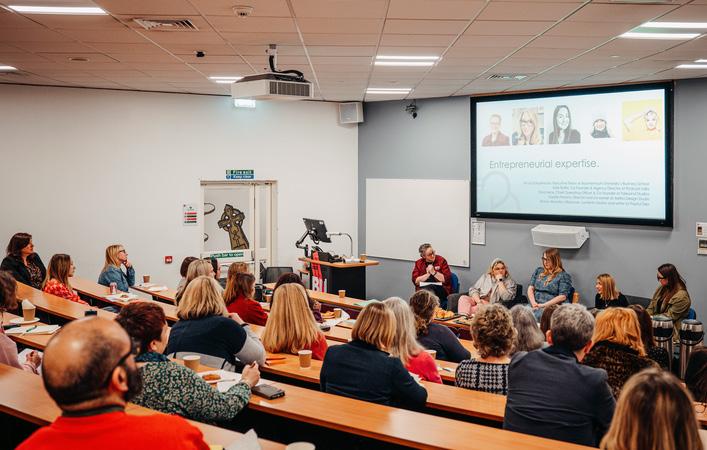
Funded by the British Council, the Supporting University Network for Research in Sustainability Engagement (SUNRISE) project is a collaborative initiative between BU and Universiti Sains Malaysia (USM).
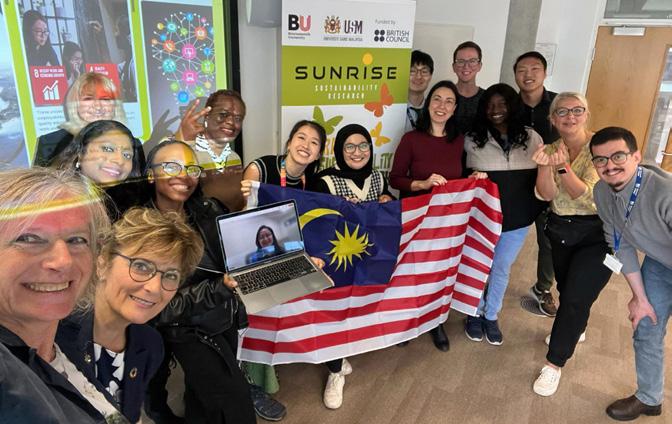
SUNRISE aims to inspire and build capacity for sustainability research. Since its launch, a series of events have been held for students and staff at both BU and USM, including a sustainability research conference organised by four MSc Events Management students. Presentations covered research into
sustainable duckweed production, tourists’ use of public transportation, and the impact of coastal erosion on socioeconomic activities.
This project also initiated the BU Student Sustainability Champion Award, which recognises students’ contribution to sustainability while studying. The students receive a certificate to help enhance their employability prospects.
Associate Professor Dr Milena Bobeva, who has led the project for BU, said: “It has been a true privilege to work with the SUNRISE team and I am looking forward to sharing our experiences and enhancing the capacity for sustainability research.”